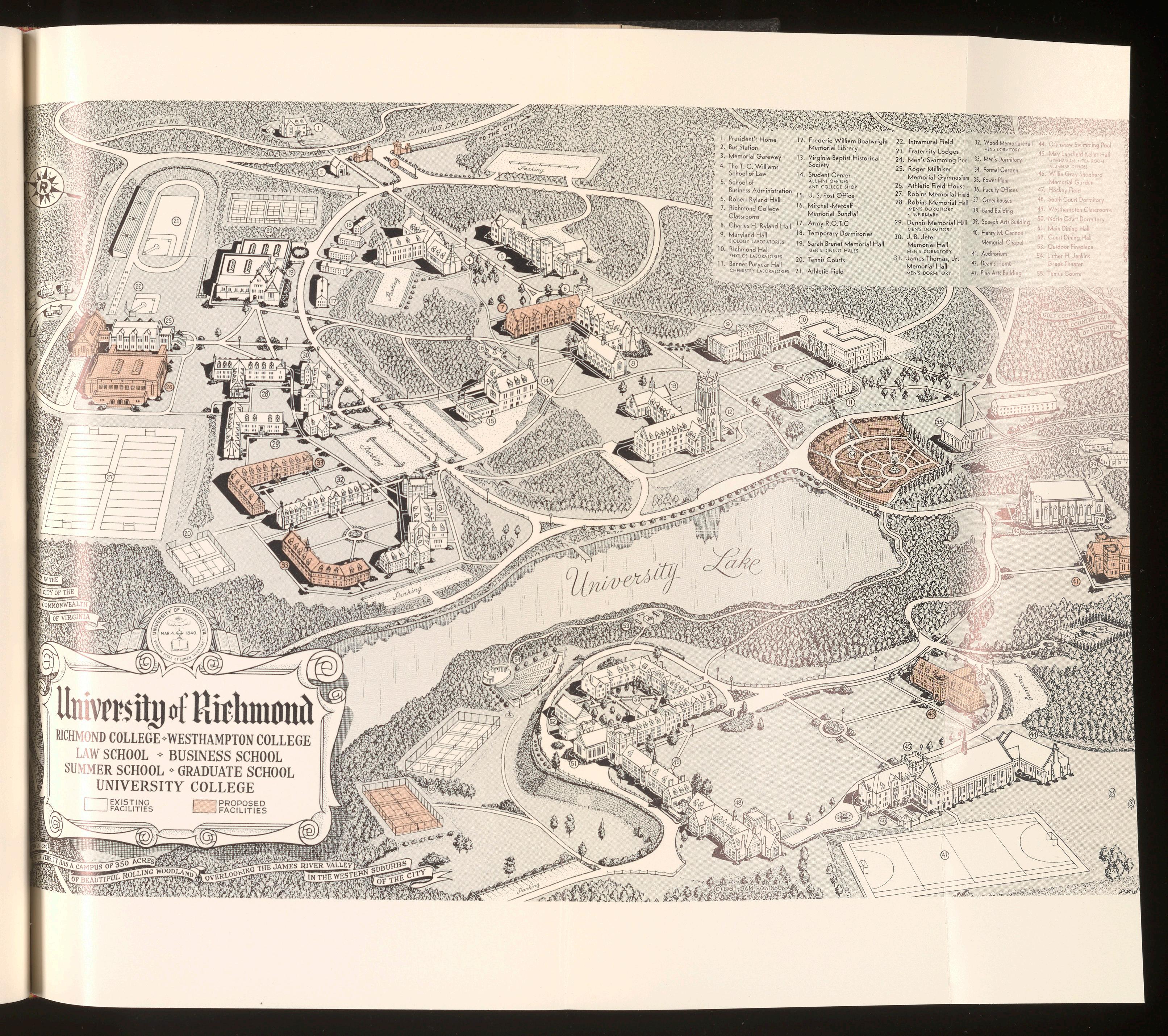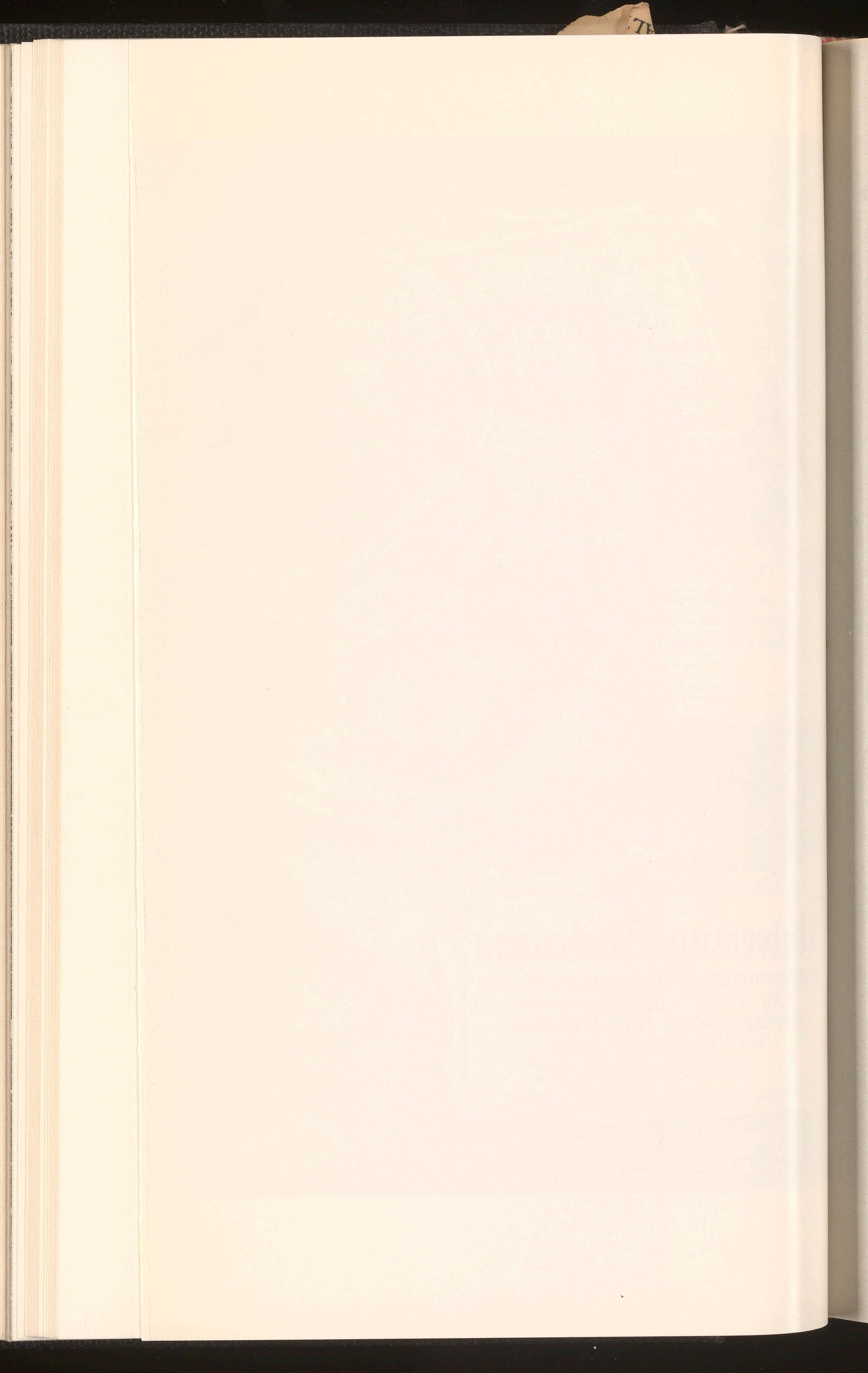UniUtr5ityofiichmon~ BULLETIN
Summer School
CA TALOGUE NUMBER FOR 1964
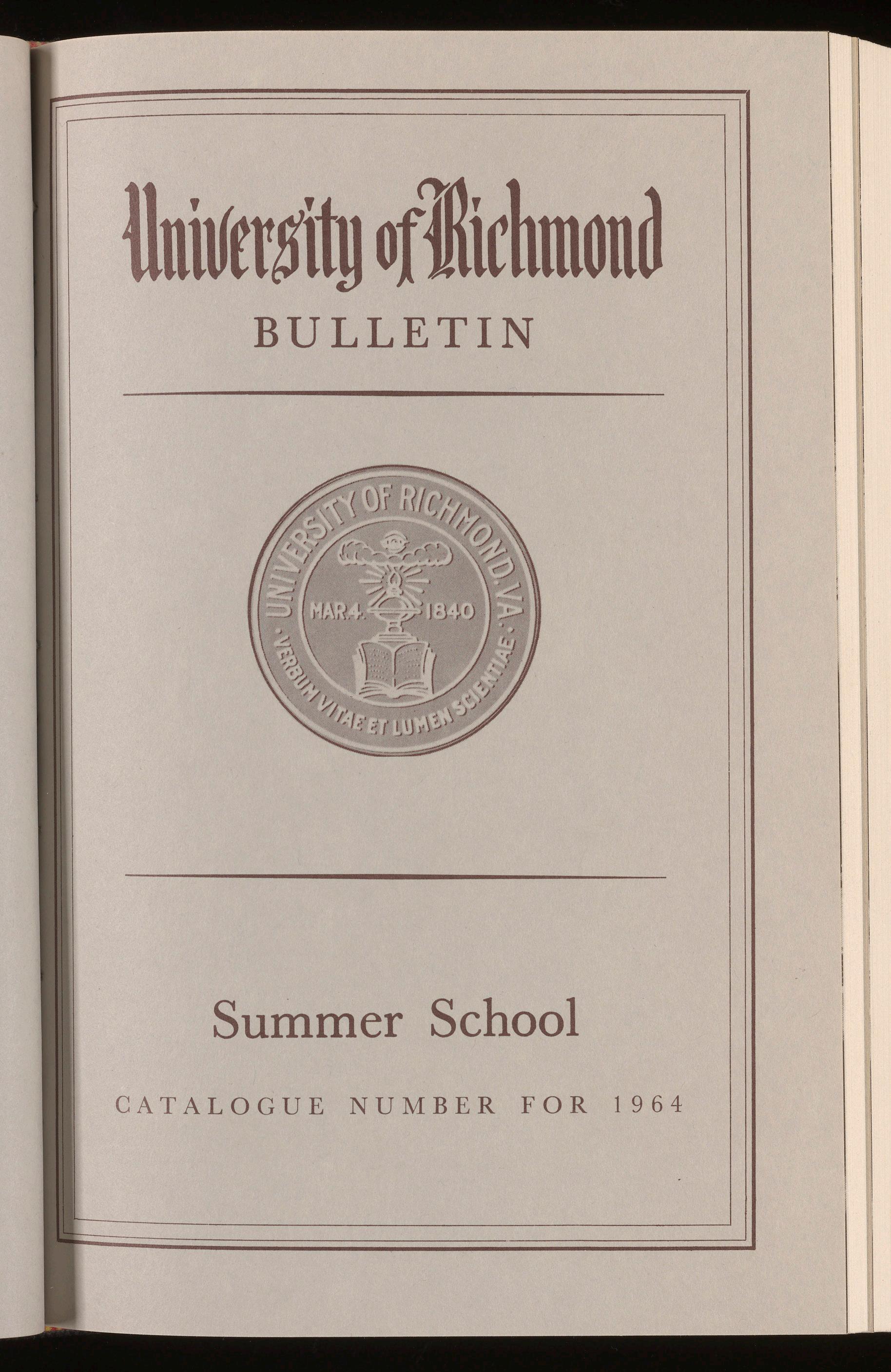

CA TALOGUE NUMBER FOR 1964

VOLUME LXVI
March 5, 1964
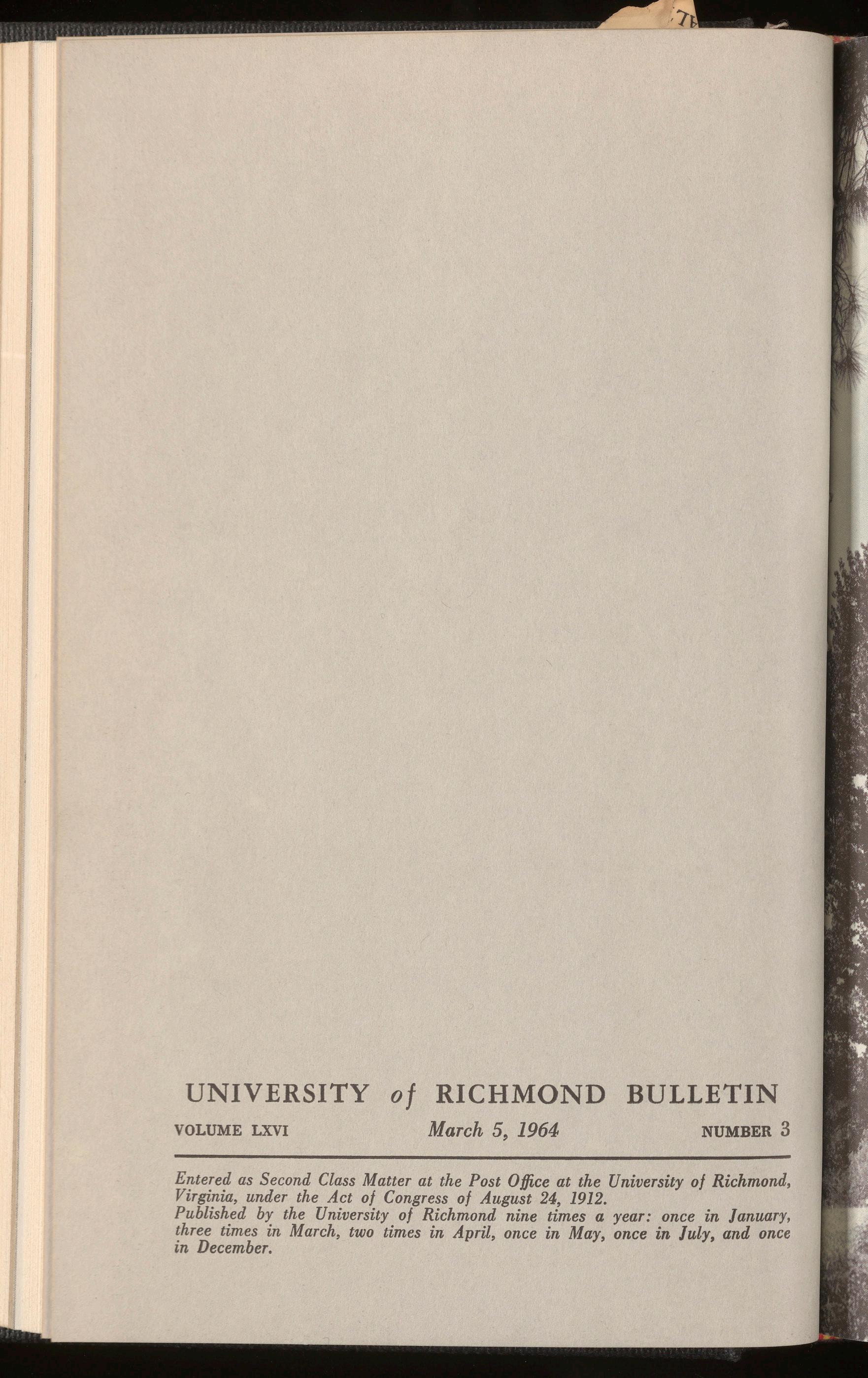
NUMBER 3
Entered as Second Class Matter at the Post Office at the University of Richmond, Virginw, under the Act of Congress of August 24, 1912. Published by the University of Richmond nine times a year: once in January, three times in March, two times in April, once in May, once in July, and once in December.

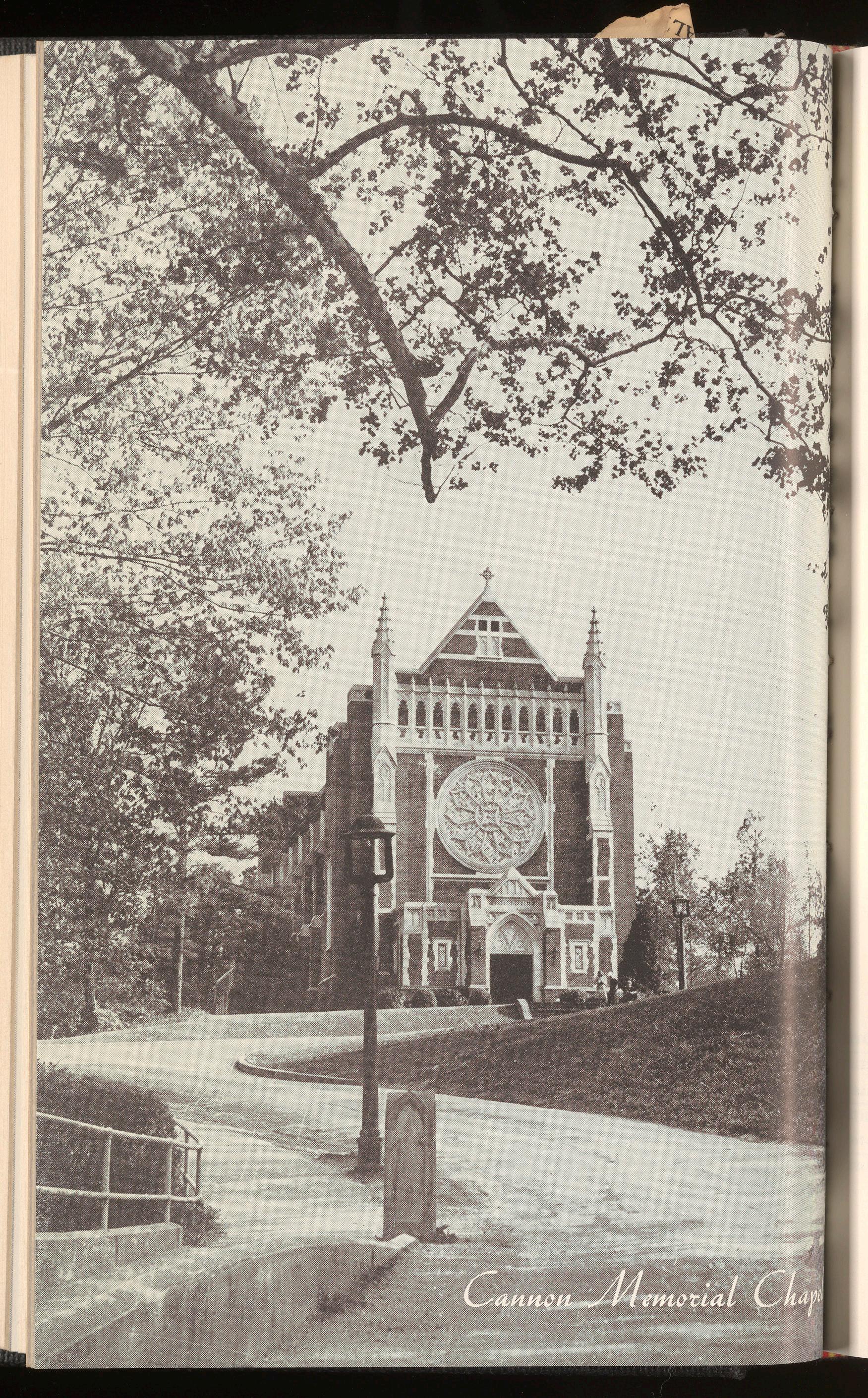

ELEVEN-WEEK
June 15 to August 27
First Term: June 15-July 21
Second Term: July 22-August 27
UNIVERSITYof RICHMOND
VIRGINIA
1964
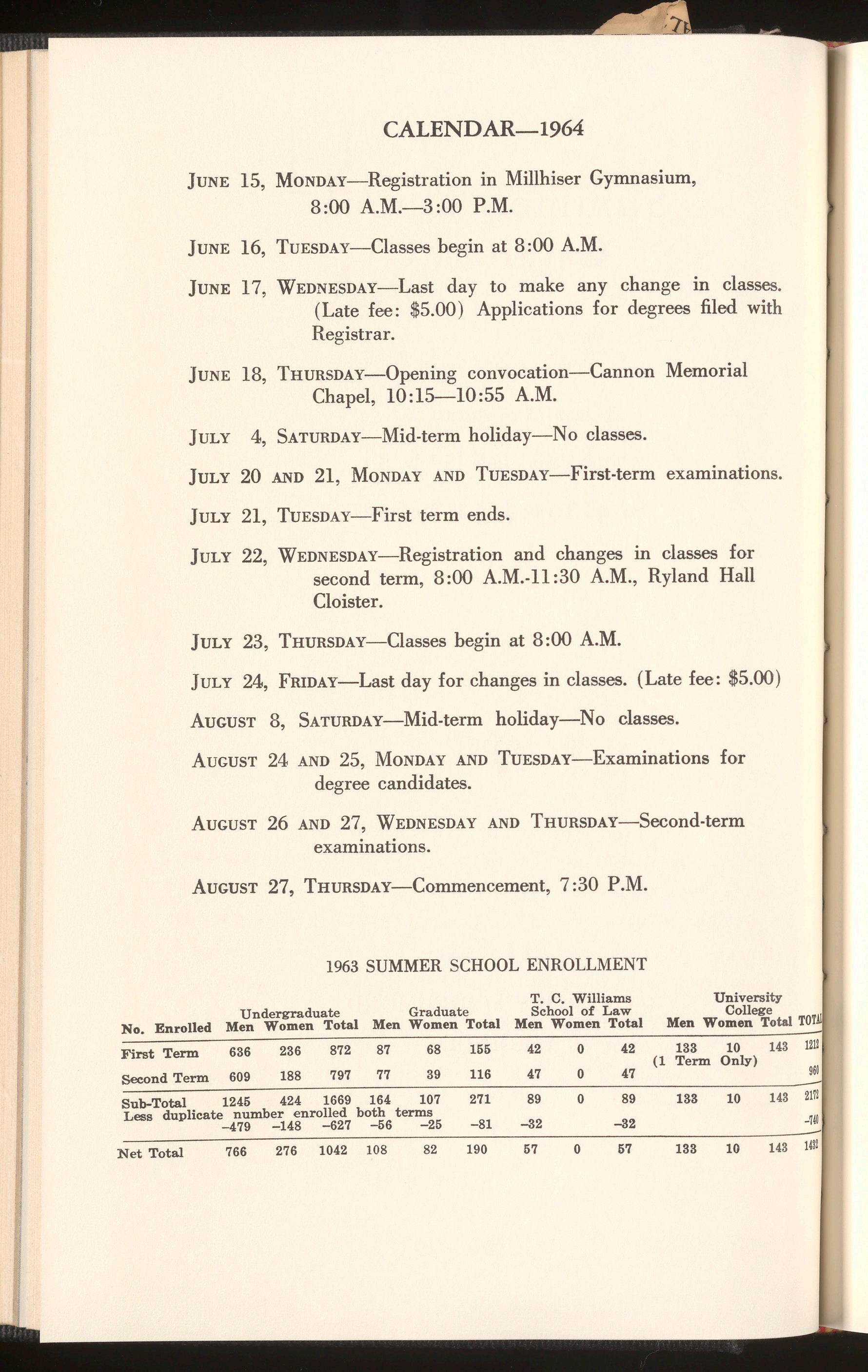
JUNE 15, MONDAY-Registration in Millhiser Gymnasium, 8:00 A.M.-3:00 P.M.
JUNE 16, TUESDAY-Classes begin at 8:00 A.M.
JUNE 17 , WEDNESDAY-Last day to make any change in classes (Late fee : $5.00) Applications for degrees filed with Registrar.
JUNE 18, THURSDAY-Opening convocation-Cannon Memorial Chapel, 10:15-10:55 A.M.
JULY 4, SATURDAY-Mid-term holiday-No classes.
JULY 20 AND 21, MONDAYANDTUESDAY-First-term examinations.
JULY 21, TUESDAY-First term ends.
JULY 22, WEDNESDAY-Registration and changes in classes for second term, 8:00 A.M.-11:30 A.M., Ryland Hall Cloister.
JULY 23 , THURSDAY-Classes begin at 8:00 A.M.
JULY 24, FRIDAY-Last day for changes in classes. (Late fee: $5.00 )
AUGUST 8, SATURDAY-Mid-term holiday-No classes.
AUGUST24 AND25, MONDAYANDTUESDAY-Examinations for degree candidates.
AUGUST26 AND27, WEDNESDAYAND THURSDAY-Second-term examinations.
AUGUST27, THURSDAY-Commencement, 7:30 P.M.
GEORGE MATTHEWS MODLIN, PH.D., LL.D. President
CHARLES H. WHEELER III, PH.D., D.Sc. Treasurer
EDWARD FRANKLIN OVERTON, PH.D. Dean
CLARENCE J. GRA Y, M.A., ED.D. Dean of Students
JosEPHINE NUNNALLY, M.A. in L.S. Acting Librarian
THOMAS NICHOLAS POLLARD, JR., M.A. Registrar
ROBER T S. ALLEY , B.D. , PH.D A ssista nt Prof essor of Bibl e and Religion
LEW I S F. BALL , PH.D. Professor of English
THOMA S S. BERRY , PH.D.
Associate Professor of Economics
R. BEA TRICE BLAND Visiting Lecturer in Education Supe rv isor of Elementary Education, Henrico County Publi c Schools
JoHN C. BoGGs , M.A. . . . . Instructor in English
IRBY B. BROWN, M.A. w. WA RNER BURKE, PH.D. Instructor in English Assistant Professor of Psychology
HUBE RTO I. CARDOUNEL , PH.D. Instructor in Spanish
ME RTON E. CARVER, PH.D. Professor of Psychology
ZADA D. CARVER, M.A. Visiting Lecturer in Education, Head Counselor , John Marshall High School
JOHN s. CATLIN , M .A.
Ross L. CRow, M.A.
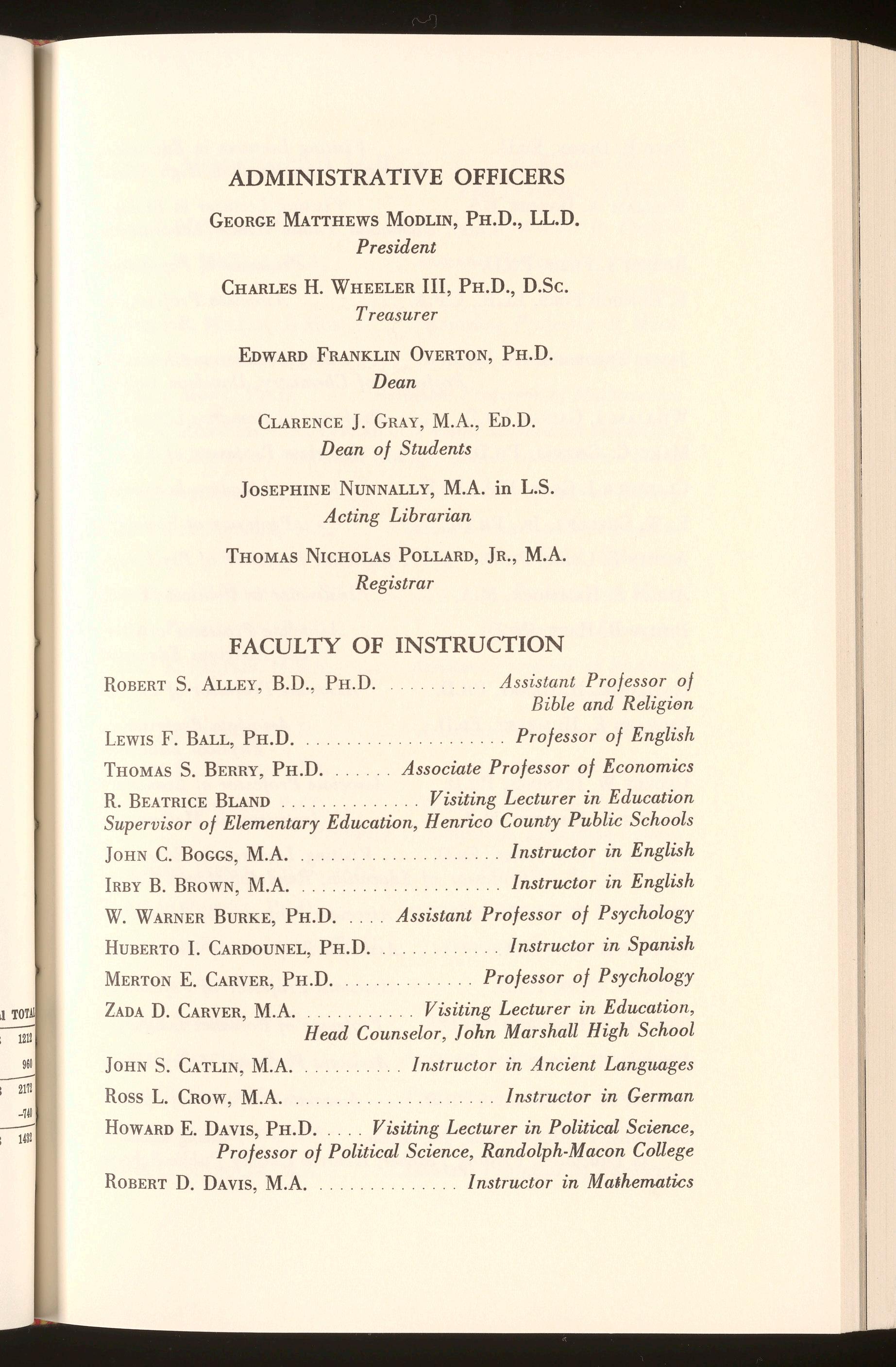
Instructor in Ancient Langziages Instructor in German
HowA RD E. DAVIS, PH.D. Visiting Lecturer in Political Science, Professor of Political Science , Randolph-Macon College
ROBE RT D. DAVIS , M.A. Instructor in Malhematics

FRED B. DIXON, ED.D. . . . . . . Visiting Lecturer in Education, Principal, John Marshall High School
WILLIAM A. DoRSEY, B.S •.. ...... Visiting Lecturer in Biology , Chief, Richmond Public Health Laboratories
RoBERT J. FILER, PH.D. . . . . . . Professor of Psychology
E. ELWOOD FORD, LL.B., C.P.A. Associate Professor oj Accounting
JAMES FREDERICKSEN , PH.D •. .... Visiting Lecturer in Chemistry, Professor of Chemistry, Davidson College
WILLIAM J. GAINES, PH.D ... ... . Professor of Romance Languages
MARY C. GoTAAS, PH.D • Associate Professor of Fren ch
CLARENCE J. GRAY, M.A., ED.D. Professor of Modern Languages
E. W. GREGORY, JR., PH.D. . . . Professor of Sociology
AUSTIN E. GRIGG, PH.D • Associate Professor of Psychology
ALLAN S. HAMMOCK, M.A. Instructor in Political Science
PHILIP R. HART, PH.D. . . Associate Professor of Bible and Religious Education
NATHANIEL H. HENRY, PH.D • Associate Professor of English
RICHARD E. HUMBERT, ED.D. Associate Professor oj Physical Education
GEORGE W. JENNINGS, PH.D • Associate Professor of Economics
PHILLIPE. JOHNSON, M.A •.. .. .. Instructor in Mathemati cs
FRANKLIN Ross JoNES, ED.D • .... Visiting Lecturer in Education , Professor of Education, Randolph-Macon College
PATRICK S. KEMP, PH.D • .. . ... Associate Professor of Accounting
FRANCIS B. KEY, M.A • . .. . .. Assistant Professor of Mathematics
NOEL w. KEYS, PH.D • Assistant Professor of Psychology
THOMAS E. LAVENDER, PH.D • . ... Professor of Romance Language s
WILLIAM H. LEFTWICH, PH.D. . . Assistant Professor of Psycholog y
ROBERT A. MAcDoNALD, PH.D • .. . . Associate Professor of Spanish
MALCOLM P. McCONNELL, JR , M.ED . .... Visiting Lecturer in Education , Visiting Teacher, Henrico County Public Schools
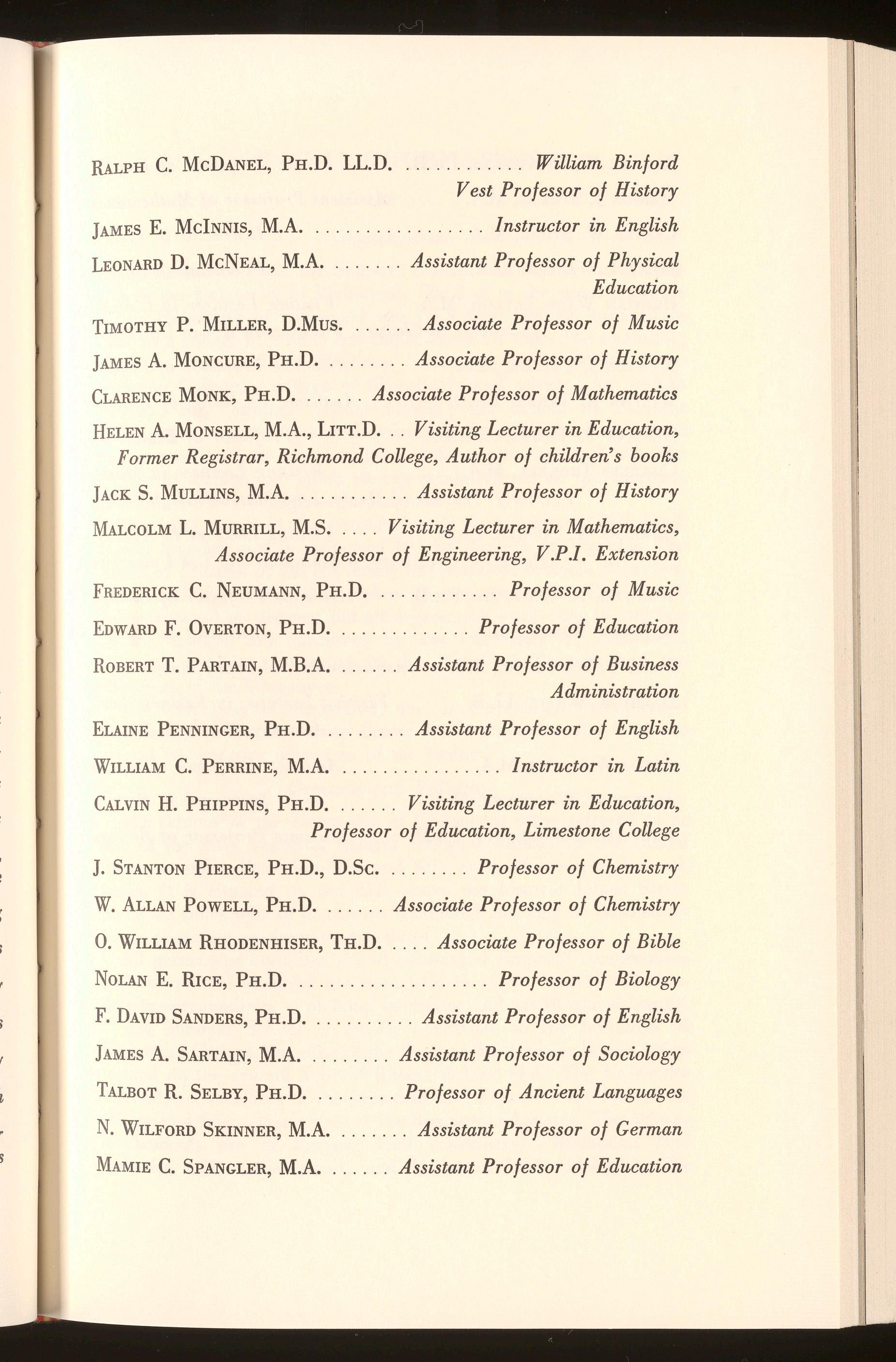
RALPH C. McDANEL, PH D. LL.D • William Binford Vest Professor of History
JAM ES E. MclNNIS, M.A ........... . .... . . Instructor in English
LEONARD D. McNEAL, M.A. . Assistant Professor of Physical Education
TIMO THY P. MILLER, D.Mus ... Associate Professor of Music
JAMES A. MONCURE, PH.D •..... Associate Professor of History
CLARENCE MONK, PH.D • Associate Professor of Mathematics
HELEN A. MoNSELL, M A., LITT.D • Visiting Lecturer in Education, Form er Registrar, Richmond College, Author of children's books
JACK S . MULLINS , M.A •. .. ... .. . . . Assistant Professor of History
MALCOLM L. MURRILL, M.S • .. .. Visiting Lecturer in Mathematics , Associate Professor of Engineering, V.P.I. Extension
FREDERI CK C. NEUMANN, PH.D • Professor of Music
EDWARD F. OVERTON, PH.D . Professor of Education
ROBERT T. PARTAIN, M.B.A. Assistant Professor of Business Administration
ELAINE PE NNINGER , PH . D. . .. . . . .. Assistant Professor of English
WILLIAM C. PERRINE, M.A . . . . . . . . . . .
. . . . Instructor in Latin
CALVIN H PHIPPINS, PH.D • Visiting Lecturer in Education, Professor of Education, Limestone Colleg e
J. STANTON PIERCE, PH.D., D.Sc. . . .. .. .. Professor of Chemistr y W. ALLAN POWELL, PH.D •. .. . . . Associate Professor of Chemistry
0. WIL LIAM RHODENHISER, TH.D • Associate Professor of Bible
NOLAN E. RICE, PH.D • ... .. . . ... . ........ Professor of Biology
F. DAVID SANDERS, PH.D • Assistant Professor of English
JAMES A. SARTAIN, M.A. . . ...... Assistant Professor of Sociology
TALBOT R. SELBY, PH.D •.. Professor of Ancient Languages
N. WIL FORD SKINNER, M.A •... .. . . Assistant Professor of German
MAMIE C. SPANGLER, M.A • Assistant Professor of Education
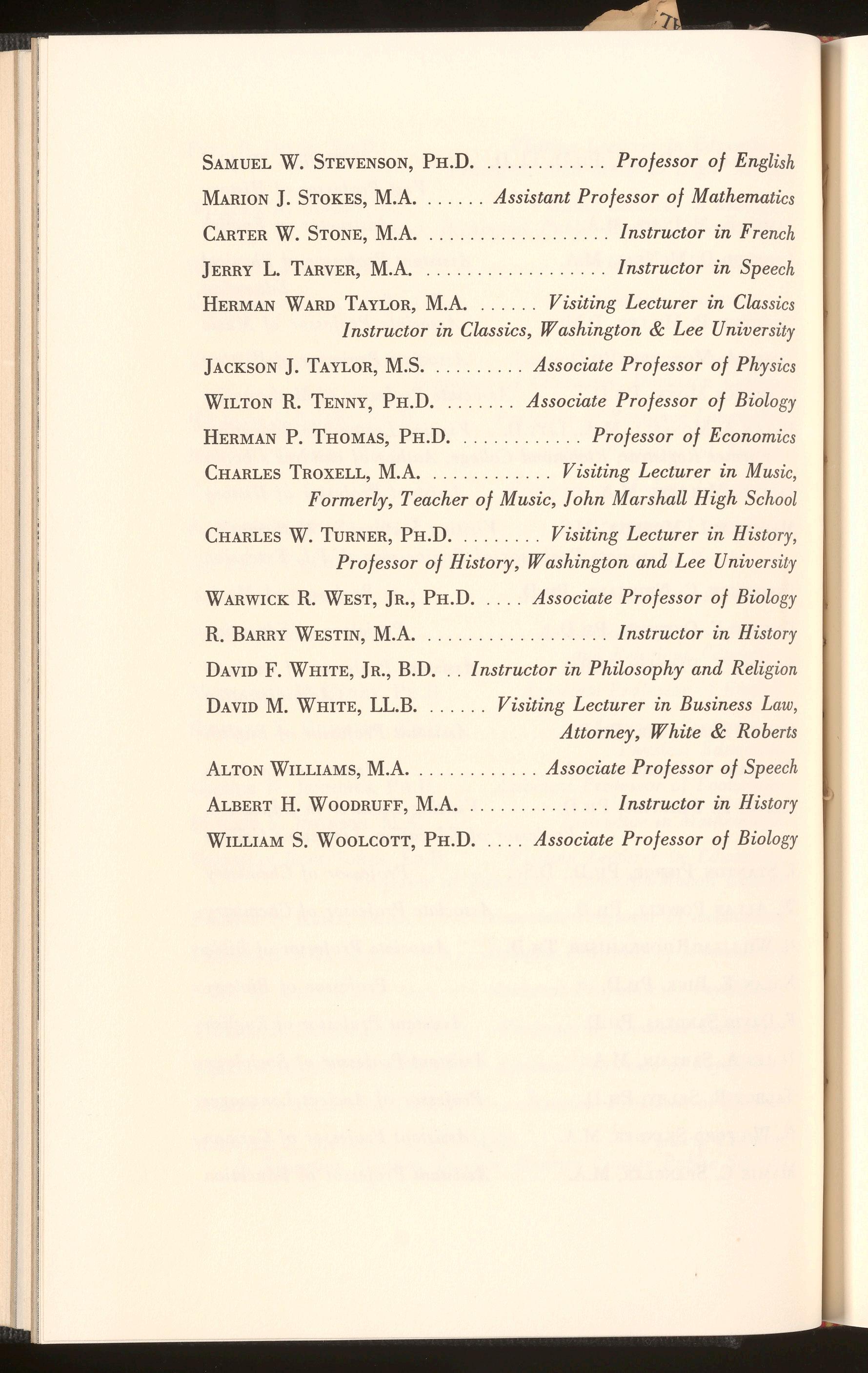
SAMUEL W. STEVENSON, PH.D. Professor of Engli sh
MARION J. STOKES, M.A .. Assistant Professor of Mathemat ics
CARTER W. STONE, M.A •... . . . Instructor in French
JERRY L. TARVER, M.A. . . . . . . . Instructor in Sp eech
HERMAN WARD TAYLOR, M.A •. Visiting Lecturer in Classics Instructor in Classics, Washington & Lee Univer sity
JACKSON J. TAYLOR , M.S • .. . ...... Associate Professor of Ph ysics
WILTON R. TENNY, PH.D. . . . Associate Professor of Bio logy
HERMAN P. THOMAS, PH.D. . Professor of Econom ics
CHARLES TROXELL, M.A • .. Visiting Lecturer in Mu sic, Formerly, Teacher of Music, John Marshall High Sch ool
CHARLES W. TURNER, PH.D . Visitin g Lecturer in His tory, Professor of History, Washington and Lee Univ ersity
WARWICK R. WEST, JR., PH.D . .. .. Associate Professor of Bio logy
R. BARRY WESTIN, M.A •.. . ... Instructor in Hi story
DAVID F. WHITE, JR., B.D • Instructor in Philosophy and Reli gion
DAVID M. WHITE, LL.B . Visiting Lecturer in Business L aw, Attorney, White & Rob erts
ALTON WILLIAMS, M.A ... . .... Associate Professor of Sp eech
ALBERT H. WOODRUFF, M.A • ..... . Instructor in Hi story
WILLIAM S. WooLCOTT, PH.D • .. . . Associate Professor of Biol ogy
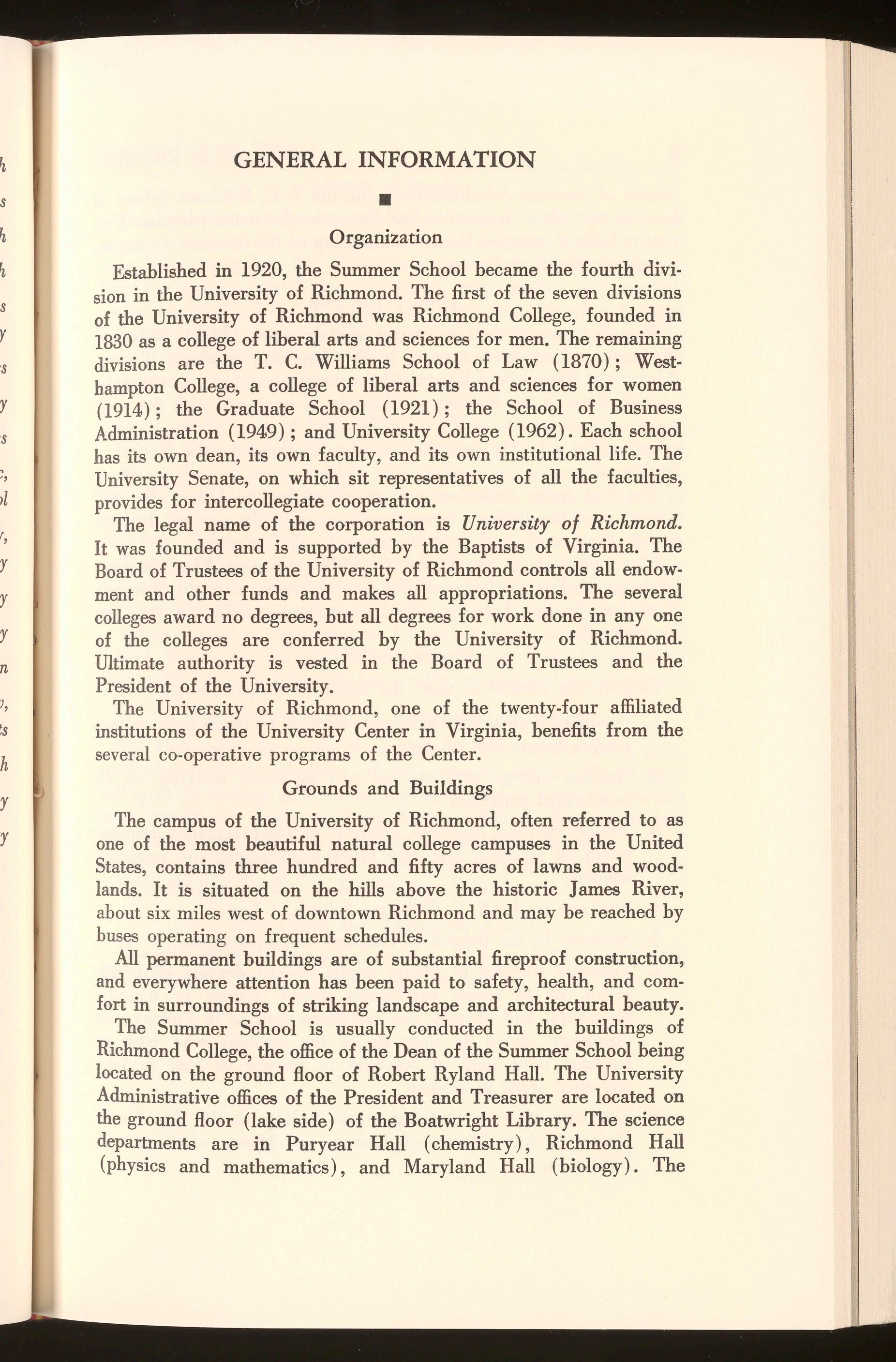
Established in 1920, the Summer School became the fourth division in the University of Richmond. The first of the seven divisions of the University of Richmond was Richmond College, founded in 1830 as a college of liberal arts and sciences for men. The remaining divisions are the T. C. Williams School of Law (1870); Westhampton College, a college of liberal arts and sciences for women (1914); the Graduate School (1921); the School of Business Administration (1949); and University College (1962). Each school has its own dean, its own faculty, and its own institutional life. The University Senate, on which sit representatives of all the faculties, provides for intercollegiate cooperation.
The legal name of the corporation is University of Richmond. It was founded and is supported by the Baptists of Virginia. The Board of Trustees of the University of Richmond controls all endowment and other funds and makes all appropriations. The several colleges award no degrees, hut all degrees for work done in any one of the colleges are conferred by the University of Richmond. Ultimate authority is vested in the Board of Trustees and the President of the University.
The University of Richmond, one of the twenty-four affiliated institutions of the University Center in Virginia, benefits from the several co-operative programs of the Center.
The campus of the University of Richmond, often referred to as one of the most beautiful natural college campuses in the United States, contains three hundred and fifty acres of lawns and woodlands. It is situated on the hills above the historic James River, about six miles west of downtown Richmond and may he reached by buses operating on frequent schedules.
All permanent buildings are of substantial fireproof construction, and everywhere attention has been paid to safety, health, and comfort in surroundings of striking landscape and architectural beauty.
The Summer School is usually conducted in the buildings of Richmond College, the office of the Dean of the Summer School being located on the ground floor of Robert Ryland Hall. The University Administrative offices of the President and Treasurer are located on the ground floor (lake side) of the Boatwright Library. The science departments are in Puryear Hall (chemistry) , Richmond Hall (physics and mathematics), and Maryland Hall (biology). The
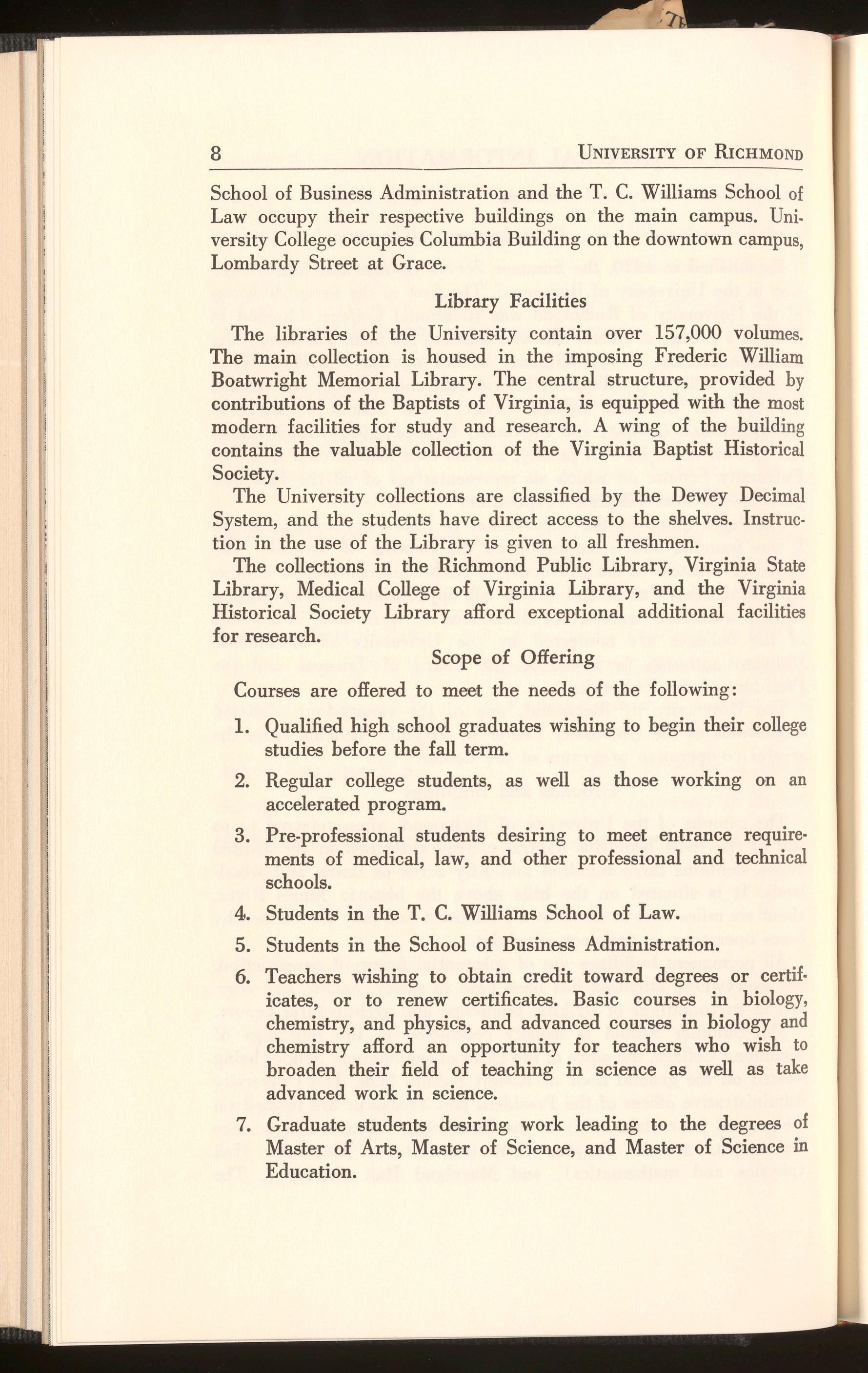
UNIVERSITY OF RICHMO ND
School of Business Administration and the T. C. Williams School of Law occupy their respective buildings on the main campus. University College occupies Columbia Building on the downtown camp us, Lombardy Street at Grace.
The libraries of the University contain over 157,000 volumes. The main collection is housed in the imposing Frederic Will iam Boatwright Memorial Library. The central structure, provided by contributions of the Baptists of Virginia, is equipped with the m ost modern facilities for study and research. A wing of the buildi ng contains the valuable collection of the Virginia Baptist Histor ical Society.
The University collections are classified by the Dewey Decimal System, and the students have direct access to the shelves. lnst ruc• tion in the use of the Library is given to all freshmen.
The collections in the Richmond Public Library, Virginia State Library, Medical College of Virginia Library, and the Virgin ia Historical Society Library afford exceptional additional facili t ies for research.
Courses are offered to meet the needs of the following:
1. Qualified high school graduates wishing to begin their college studies before the fall term.
2. Regular college students, as well as those working on an accelerated program.
3. Pre-professional students desiring to meet entrance requ irements of medical, law, and other professional and techni cal schools.
4. Students in the T. C. Williams School of Law.
5. Students in the School of Business Administration.
6. Teachers wishing to obtain credit toward degrees or cert if• icates, or to renew certificates. Basic courses in biolo gy, chemistry, and physics, and advanced courses in biology and chemistry afford an opportunity for teachers who wish to broaden their field of teaching in science as well as t ake advanced work in science.
7. Graduate students desiring work leading to the degrees of Master of Arts, Master of Science, and Master of Science in Education.

The 1964 Summer Session will extend through a period of almost eleven weeks. In the first term of five and one-half weeks, from Jun e 15 through July 21, classes will meet daily Monday through Satu r day except July 4. In the second term of five and one-half weeks , beginning July 22, classes will meet daily Monday through Saturday except August 8. The length of the class periods will be sevent y-five minutes net time. This program will enable one to earn a semester's credit in each course taken for either term.
One of the outstanding traditions of the University of Richmond is the concept of honor held by the students in its several colleges. The Honor System requires that a person shall in all relations of student life act honorably. Breaches of the Honor Code include cheat ing , violations of a signed pledge, lying, stealin g , failure to rep ort one's own or witnessed violations of the Honor Code , failure to appear before the Honor Council when summoned , and, in gene ral , breaking one's word of honor in any circumstances. When a student matriculates for either term of the Summer School, h e is g iven an explanation of the Honor Code , by which he must ag r ee to abide before he can finally complete his matriculation.
The University Center for Psychological Services will be in operation durin g both semesters of the summer session The Center will provide testing and counseling services and work in reading improve ment for students of the Summer School. No special fees will be charged for such services to full-time Summer School studen ts. Center services are provided also on a special fee basis to mdivi duals not enrolled in the Summer School.
The post office address is University of Richmond, Virginia 23173. The telegraph address is Richmond, Virginia
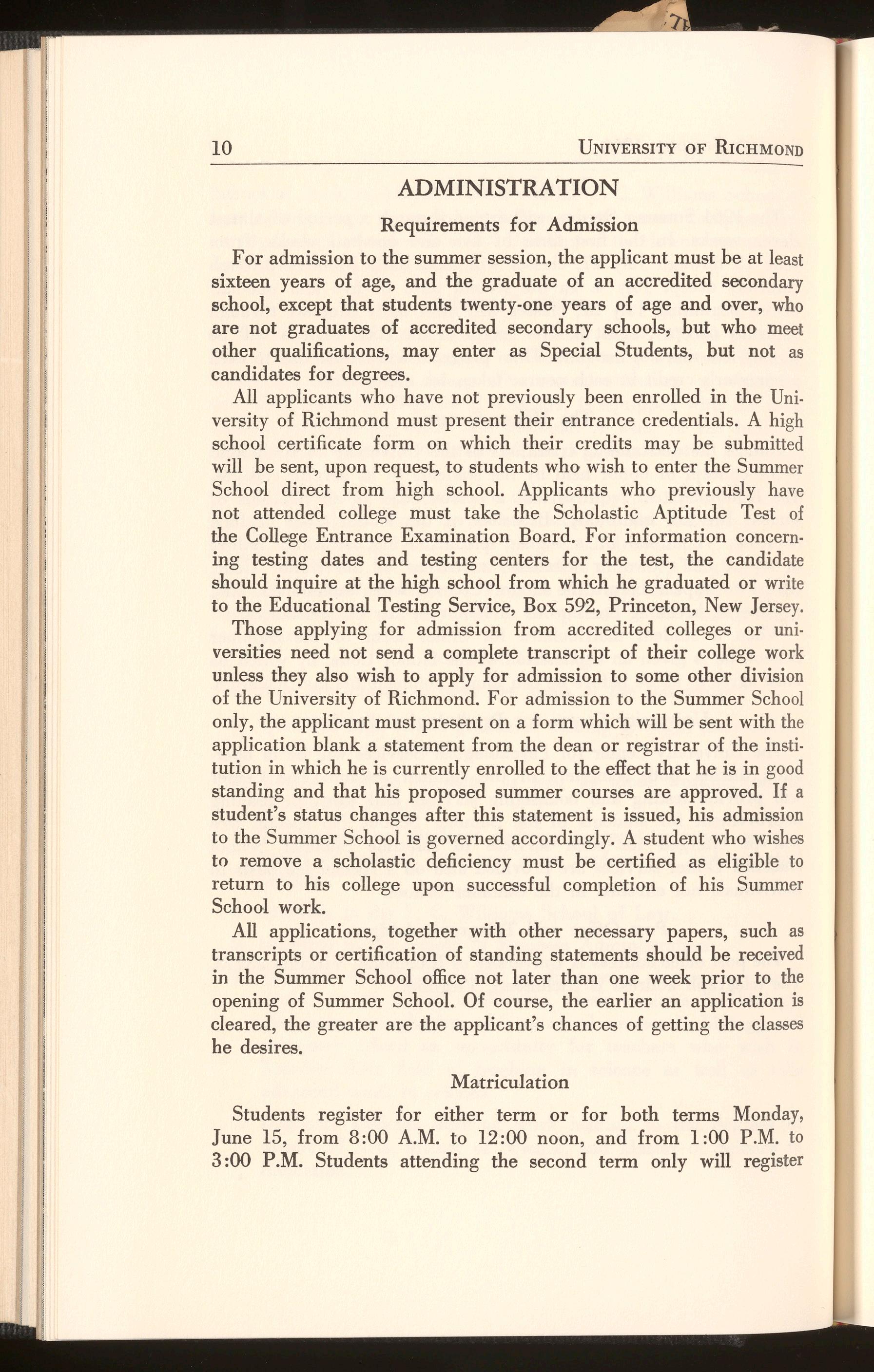
For admission to the summer session, the applicant must be at least sixteen years of age, and the graduate of an accredited secondary school, except that students twenty-one years of age and over, who are not graduates of accredited secondary schools, but who meet other qualifications, may enter as Special Students, but not as candidates for degrees.
All applicants who have not previously been enrolled in the University of Richmond must present their entrance credentials. A high school certificate form on which their credits may be submitted will be sent, upon request, to students who wish to enter the Summer School direct from high school. Applicants who previously have not attended college must take the Scholastic Aptitude Test of the College Entrance Examination Board. For information concerning testing dates and testing centers for the test, the candidate should inquire at the high school from which he graduated or write to the Educational Testing Service, Box 592, Princeton, New Jersey. Those applying for admission from accredited colleges or universities need not send a complete transcript of their college work unless they also wish to apply for admission to some other division of the University of Richmond. For admission to the Summer School only, the applicant must present on a form which will be sent with the application blank a statement from the dean or registrar of the institution in which he is currently enrolled to the effect that he is in good standing and that his proposed summer courses are approved. If a student's status changes after this statement is issued, his admission to the Summer School is governed accordingly. A student who wishes to remove a scholastic deficiency must be certified as eligible to return to his college upon successful completion of his Summer School work.
All applications, together with other necessary papers, such as transcripts or certification of standing statements should be received in the Summer School office not later than one week prior to the opening of Summer School. Of course, the earlier an application is cleared, the greater are the applicant's chances of getting the classes he desires.
Students register for either term or for both terms Monday, June 15, from 8:00 A.M. to 12:00 noon, and from 1 :00 P.M. to 3 :00 P.M. Students attending the second term only will register
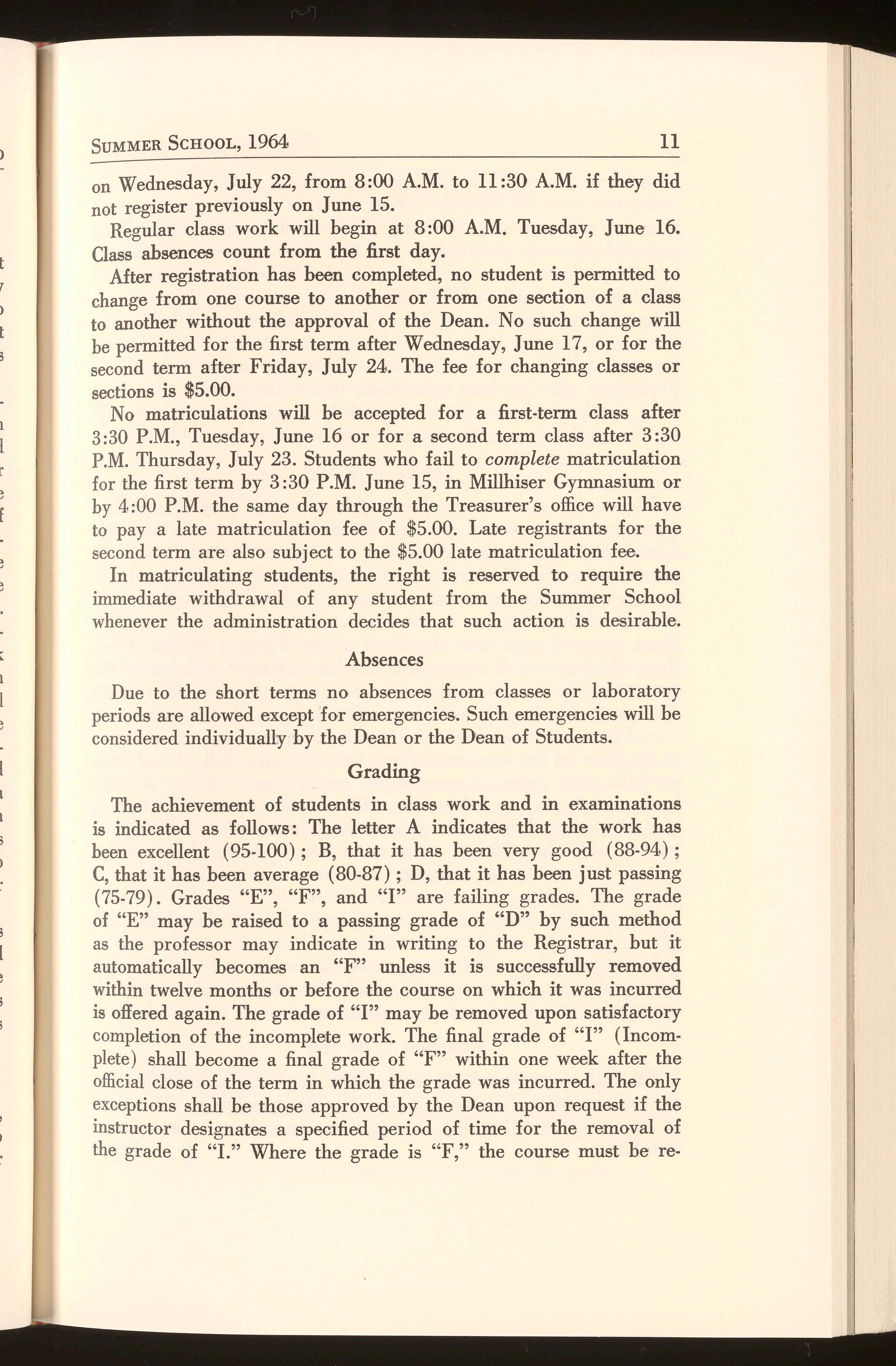
SCHOOL, 1964 11
on Wednesday, July 22, from 8:00 A.M. to 11:30 A.M. if they did not register previously on June 15.
Regular class work will begin at 8:00 A.M. Tuesday, June 16. Class absences count from the first day.
After registration has been completed, no student is permitted to change from one course to another or from one section of a class to another without the approval of the Dean. No such change will he permitted for the first term after Wednesday, June 17, or for the second term after Friday, July 24. The fee for changing classes or sections is $5.00.
No matriculations will be accepted for a first-term class after 3:30 P.M., Tuesday, June 16 or for a second term class after 3:30 P.M. Thursday, July 23. Students who fail to complete matriculation for the first term by 3 :30 P.M. June 15, in Millhiser Gymnasium or by 4:00 P.M. the same day through the Treasurer's office will have to pay a late matriculation fee of $5.00. Late registrants for the second term are also subject to the $5.00 late matriculation fee.
In matriculating students, the right is reserved to require the immediate withdrawal of any student from the Summer School whenever the administration decides that such action is desirable.
Due to the short terms no absences from classes or laboratory periods are allowed except for emergencies. Such emergencies will be considere d individually by the Dean or the Dean of Students.
The achievement of students in class work and in examinations is indicated as follows: The letter A indicates that the work has been excellent (95-100); B, that it has been very good (88-94); C, that it has been average (80-87); D, that it has been just passing (75-79). Grades "E", "F", and "I" are failing grades. The grade of "E" may be raised to a passing grade of "D" by such method as the professor may indicate in writing to the Registrar , but it automatically becomes an "F" unless it is successfully removed within twelve months or before the course on which it was incurred is offered again. The grade of "I" may be removed upon satisfactory completion of the incomplete work. The final grade of "I" (Incomplete) shall become a final grade of "F" within one week after the official close of the term in which the grade was incurred. The only exceptions shall be those approved by the Dean upon request if the instructor designates a specified period of time for the removal of the grade of "I." Where the grade is "F," the course must be re-
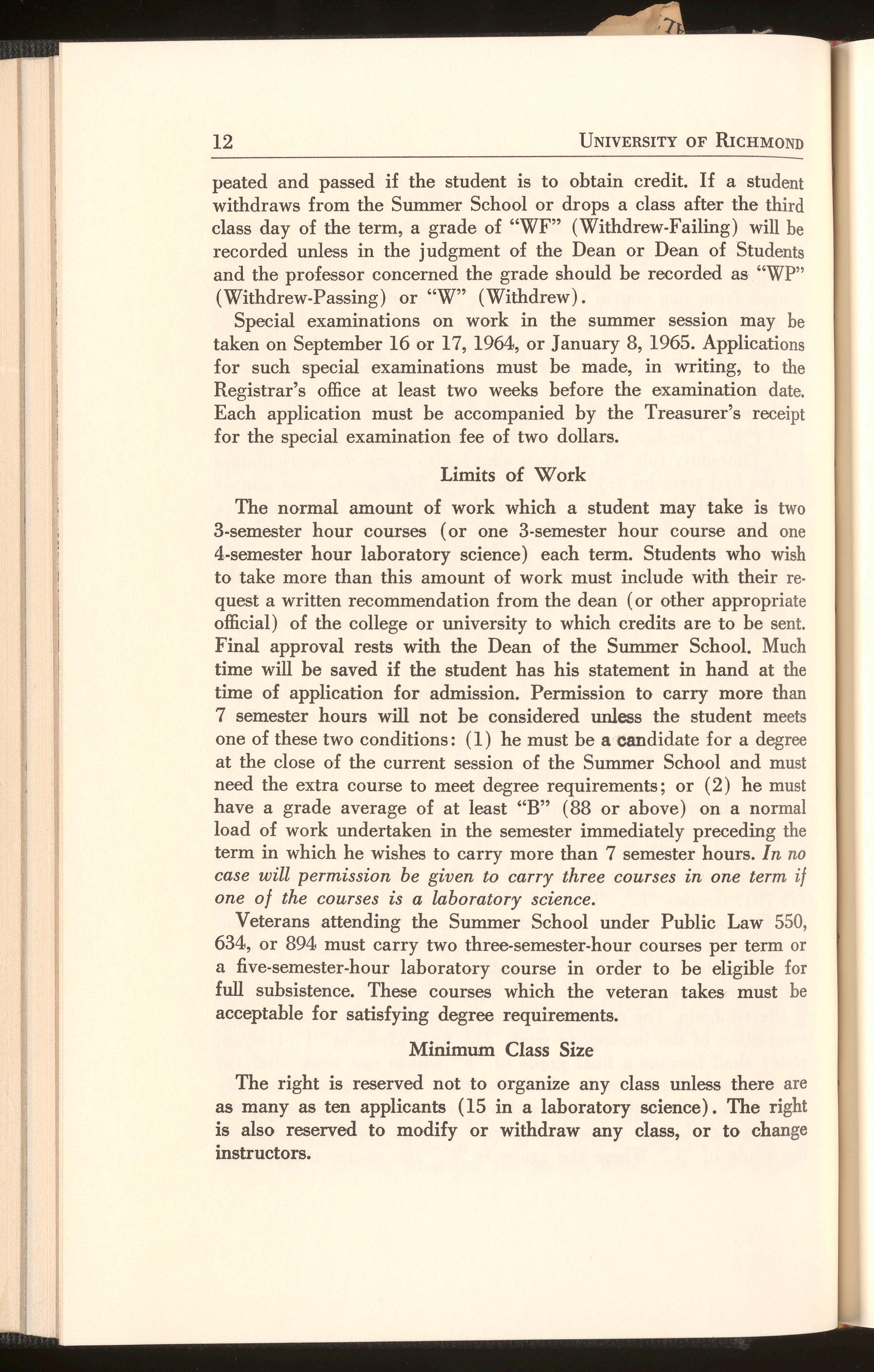
peated and passed if the student is to obtain credit. If a stu dent withdraws from the Summer School or drops a class after the t hird class day of the term, a grade of "WF" (Withdrew-Failing) will be recorded unless in the judgment of the Dean or Dean of Stud ents and the professor concerned the grade should be recorded as "WP" (Withdrew-Passing) or "W" (Withdrew).
Special examinations on work in the summer session may be taken on September 16 or 17, 1964, or January 8, 1965. Applic at ions for such special examinations must be made, in writing, to the Registrar's office at least two weeks bef ore the examination date. Each application must be accompanied by the Treasurer's r eceipt for the special examination fee of two dollars.
The normal amount of work which a student may take is two 3-semester hour courses ( or one 3-semester hour course and one 4-semester hour laboratory science) each term. Students who wish to tak e more than this amount of work must include with their request a written recommendation from the dean ( or other appropr iate official) of the college or university to which credits are to be sent. Final approval rests with the Dean of the Summer School. Much time will be saved if the student has his statement in hand at the time of application for admission. Permission to carry more th an 7 semester hours will not be considered unless the student meets one of these two conditions: ( 1) he must be a candidate for a degree at the close of the current session of the Summer School and m ust need the extra course to meet degree requirements ; or (2) he must have a grade average of at least "B" (88 or above) on a no rmal load of work undertaken in the semester immediately precedin g the term in which he wishes to carry more than 7 semester hours. I n no case will permission be given to carry three courses in one term if one of the courses is a laboratory science.
Veterans attending the Summer School under Public Law 550, 634, or 894 must carry two three-semester-hour courses per term or a five-semester-hour laboratory course in order to be eligible for full subsistence. These courses which the veteran takes must be acceptable for satisfying degree requirements.
The right is reserved not to organize any class unless there are as many as ten applicants (15 in a laboratory science). The r ight is also reserved to modify or withdraw any class, or to ch ange instructors.

The following baccalaureate degrees are offered by the University of Richmond through its Summer School: B.A., B.S., B.S. in Business Administration, and B.S. in Teaching.
A candidate for any of these degrees must be a graduate of an accredited secondary school.* His last four years of high-school wo,rk must include a minimum of sixteen acceptable units, distributed as follows: English-4; mathematics-3, including 2 in algebra** and 1 in geometry; history-1; foreign language-2; science-1. The r emaining units are elective from high school graduation requir ements except that not more than four units of vocational work will b e accepted and no credit will be allowed for less than two units in any foreign language. A student who enters college without two units in foreign language will be required to take in college without degree credit a first-year foreign language to remove his deficiency. He ma y remove deficiencies in high school algebra by taking Math S51, or in plane geometry by taking Math S52. These are non-credit courses in high school mathematics, offered in the Summer School only.
Th e academic requirements for the several degrees are stated in semester hours. Quality credits are calculated from academic hours on th e following basis: a semester hour passed with grade A shall count three quality credits; with grade B, two quality credits; with grad e C, one quality credit; with grade D, no quality credit.
B.A. and B.S.-During the second semester of his sophomore year, a student must select a field of concentration which will include not less than twenty-four hours in one department and courses in rela ted subjects to bring his total in the field of concentration to a mini mum of forty-two semester hours. His program of studies in this field must be made out under the guidance of the chairman of the department in which he wishes to concentrate, and be filed in the Registrar's office. In the majority of cases, the field of concentratio n will consist of twenty-four hours in one department and eighteen hours in related subjects approved by the chairman of the depar tment. In the laboratory sciences, these will be from thirty to thirty -three and twenty semester hours respectively. For the B.S.
*An acceptable score on the Virginia State Board of Education High School Compl eti on Examination or the General Educational Development Tests, High School Level, may be considered in lieu of high school graduation. The specific requirements in mathematics and language listed above, however, must still be met
**One of these units may have been completed in the 8th grade.
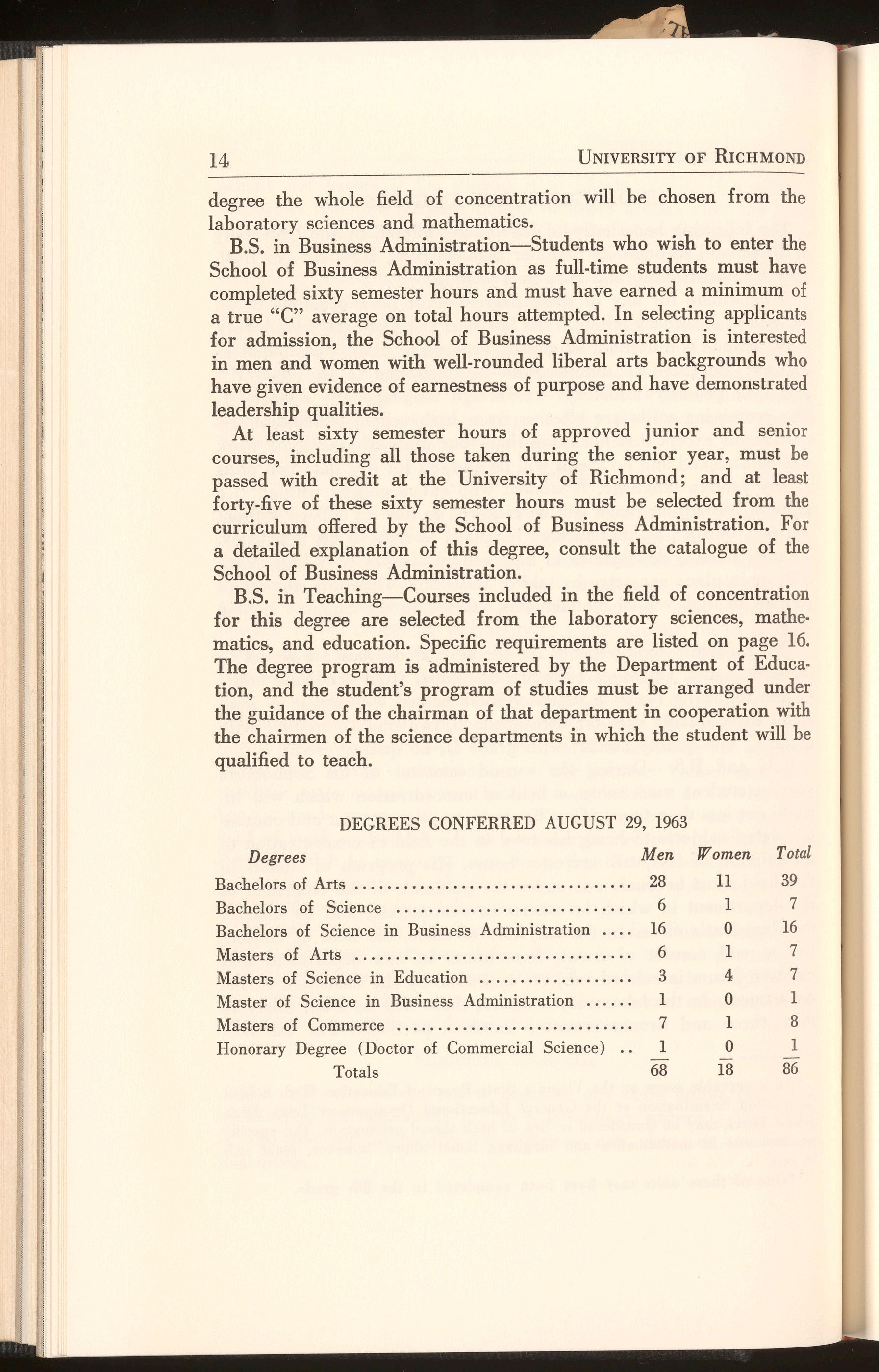
degree the whole field of concentration will be chosen from the laboratory sciences and mathematics.
B.S. in Business Administration-Students who wish to enter the School of Business Administration as full-time students must have completed sixty semester hours and must have earned a minimum of a true "C" average on total hours attempted. In selecting applicants for admission, the School of Business Administration is interested in men and women with well-rounded liberal arts backgrounds who have given evidence of earnestness of purpose and have demonstrated leadership qualities.
At least sixty semester hours of approved junior and senior courses, including all those taken during the senior year, must be passed with credit at the University of Richmond; and at least forty-five of these sixty semester hours must be selected from the curriculum offered by the School of Business Administration. For a detailed explanation of this degree, consult the catalogue of the School of Business Administration.
B.S. in Teaching-Courses included in the field of concentration for this degree are selected from the laboratory sciences, mathematics, and education. Specific requirements are listed on page 16. The degree program is administered by the Department of Education, and the student's program of studies must be arranged under the guidance of the chairman of that department in cooperation with the chairmen of the science departments in which the student will be qualified to teach.
DEGREES CONFERRED AUGUST 29, 1963
A candidate for a degree must offer at least 124 semester hours of work, including not less than 120 hours of academic work. He must earn at least as many quality credits as the total number of semester hours of academic work taken during his college career.
I. REQUIRED COURSES Semester Hours
ENGLISH101-102, 203-204
MATHEMATICS.One of the following combinations: 101-104; 151-104; 151-152; or 251-252
(A student, however, by passing a special examination on highschool plane geometry and algebra through quadratics, or by validating his high-school courses in these subjects by completing Mathematics 51-52 without college credit, may thereby satisfy the mathematics requirements for the B.A. degree. Mathematics 151-152, however, is a prerequisite for all advanced science courses.)
FOREIGNLANGUAGES:The second year in each of two foreign languages
NATURALSCIENCES(Biology, Chemistry, Physics): The first year in two of the above sciences
(A student who offers one of the Mathematics combinations above may satisfy the natural sciences requirement by offering eight semester hours in only one natural science.)
BIBLE203 and 207 or 307
HISTORY107-108
OTHERSOCIALSCIENCES.Six hours in each of two of the following: (Economics 201-202, Education, Philosophy, Political Science 205-206, Psychology 201-202, Sociology 201-202)
12
6
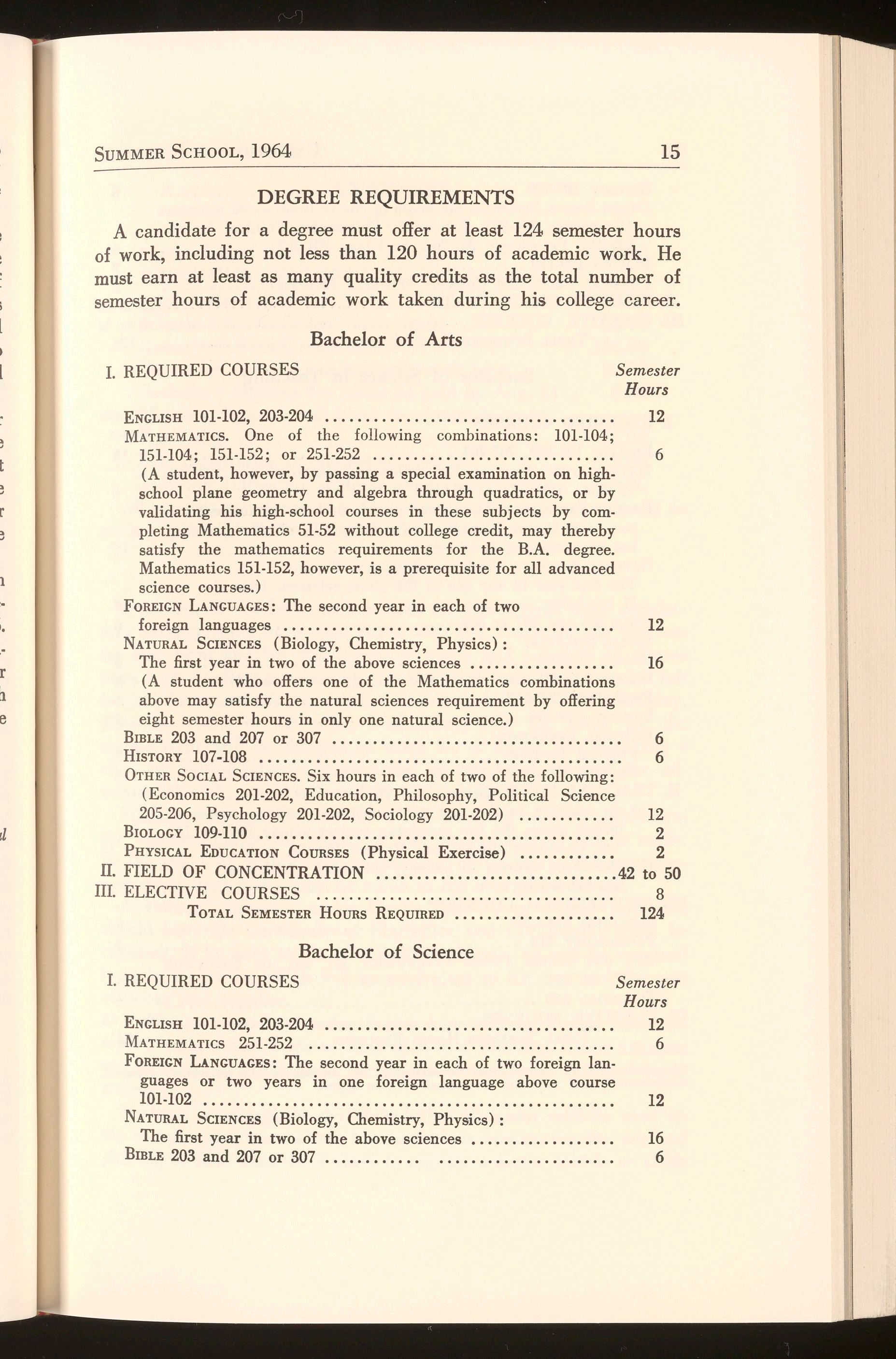
12
16
12 BIOLOGY109-110
I. REQUIRED COURSES
ENGLISH101-102, 203-204
MATHEMATICS251-252
FOREIGNLANGUAGES:The second year in each of two foreign languages or two years in one foreign language above course 101-102
NATURALSCIENCES(Biology, Chemistry, Physics) : The first year in two of the above sciences
BIBLE203 and 207 or 307
UNIVERSITY OF RICHMOND
OTHER SOCIALSCIENCES.Six hours in one of these social sciences: (Economics 201-202, Education, Philosophy, Political Science 205-206, Psychology 201-202, Sociology 201-202)
I. REQUIRED COURSES
ENGLISH 101-102, 203-204
MATHEMATICS.One of the following combinations: 101-104; 151-104; 151-152; or 251-252 ..
FOREIGNLANGUAGES:The second year in each of two languages or two years in one language above course 101-102 if the student has an average of C or better
NATURALSCIENCE: (Biology, Chemistry, Physics): The first year in any one of the above sciences. (See also part II (a) below
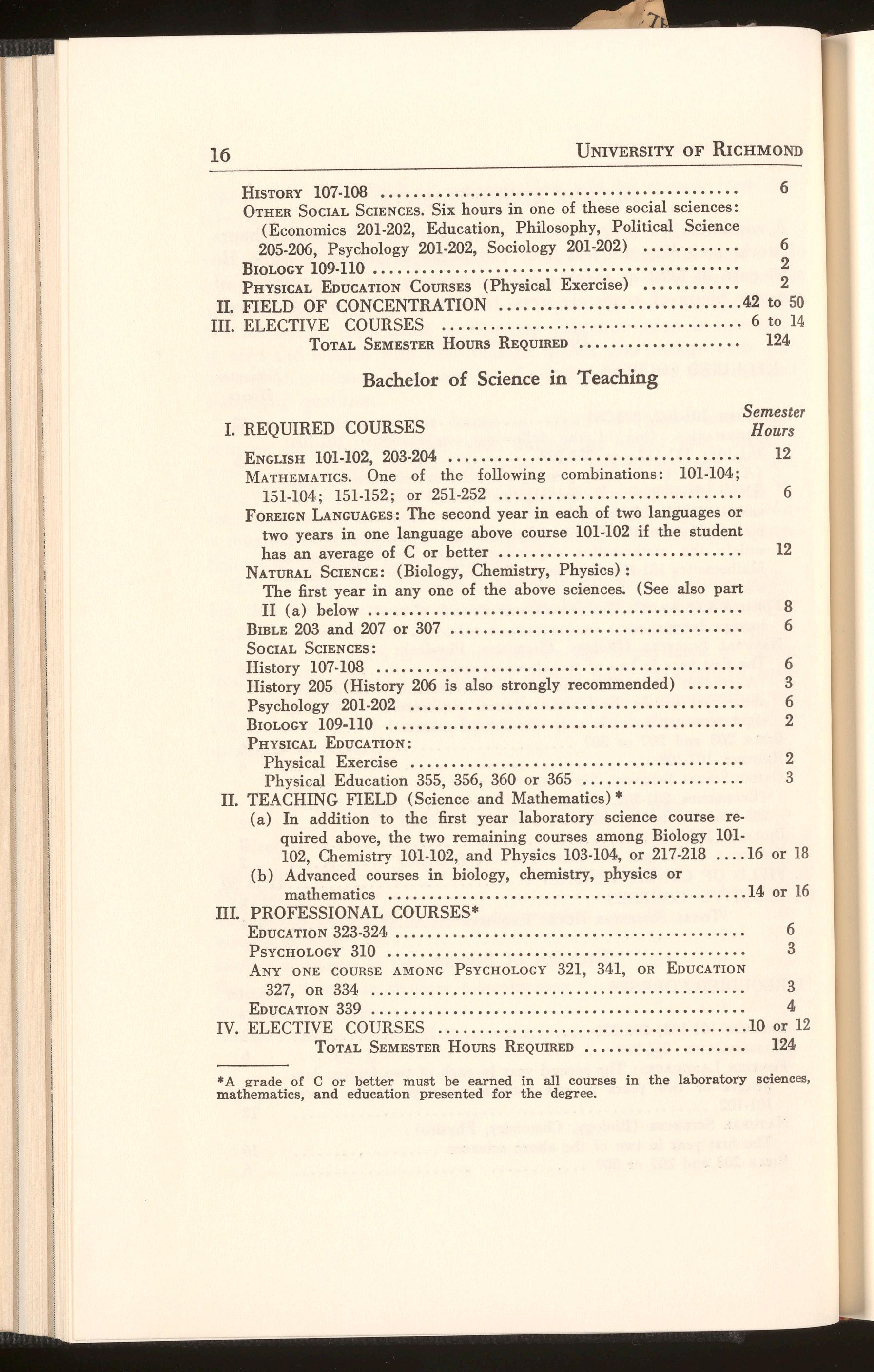
II.
(Science and Mathematics)•
(a) In addition to the first year laboratory science course required above, the two remaining courses among Biology 101102, Chemistry 101-102, and Physics 103-104, or 217-218 .... 16 or 18 (b) Advanced courses in
or
14 or 16
Ill.
• A grade of C or better must be earned in all courses in the laboratory sciences, mathematics. and education presented for the
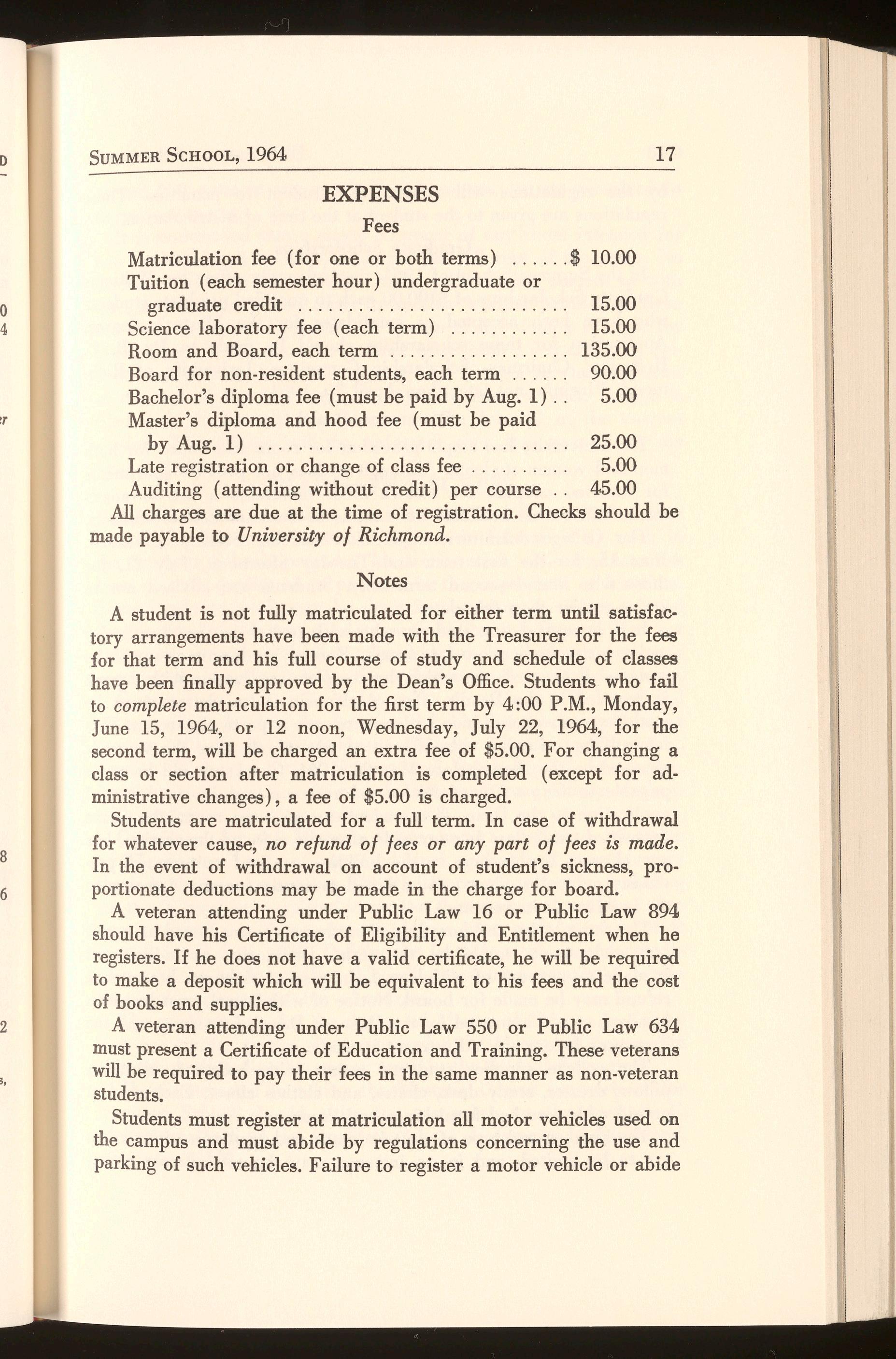
Matriculation fee (for one or both terms) $ 10.00
Tuition ( each semester hour) undergraduate or graduate credit ........ ............. ..... .
Science laboratory fee (each term) ...
Room and Board, each term ..... .... ..... ... .
Board for non-resident students, each term ..... .
Bachelor's diploma fee (must be paid by Aug. 1) ..
Master's diploma and hood fee (must be paid
by Aug. 1) .
Late registration or change of class fee . . . . . . . . . . 5.00
Auditing ( attending without credit) per course . . 45.00
All charges are due at the time of registration. Checks should be made payable to University of Richmond.
A student is not fully matriculated for either term until satisfactory arrangements have been made with the Treasurer for the fees for that term and his full course of study and schedule of classes have been finally approved by the Dean's Office. Students who fail to complete matriculation for the first term by 4:00 P.M., Monday, June 15, 1964, or 12 noon, Wednesday, July 22, 1964, for the second term, will be charged an extra fee of $5.00. For changing a class or section after matriculation is completed (except for administrative changes) , a fee of $5.00 is charged.
Students are matriculated for a full term. In case of withdrawal for whatever cause, no refund of fees or any part of fees is made. In the event of withdrawal on account of student's sickness, proportionate deductions may be made in the charge for board.
A veteran attending under Public Law 16 or Public Law 894 should have his Certificate of Eligibility and Entitlement when he registers. If he does not have a valid certificate, he will be required to make a deposit which will be equivalent to his fees and the cost of books and supplies.
A veteran attending under Public Law 550 or Public Law 634 must present a Certificate of Education and Training. These veterans will be required to pay their fees in the same manner as non-veteran students.
Students must register at matriculation all motor vehicles used on the campus and must abide by regulations concerning the use and parking of such vehicles. Failure to register a motor vehicle or abide
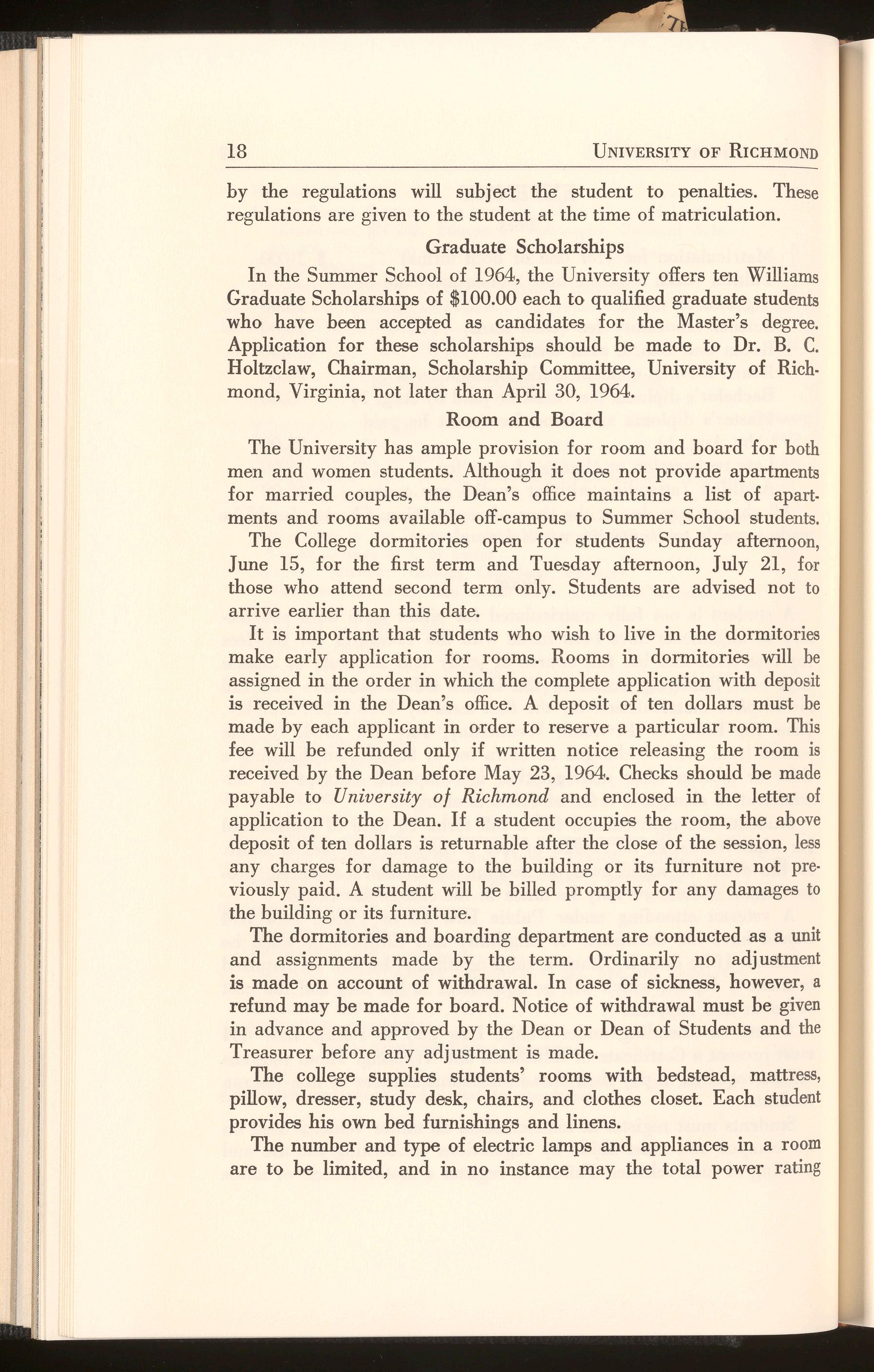
by the regulations will subject the student to penalties. These regulations are given to the student at the time of matriculation.
In the Summer School of 1964, the University offers ten Williams Graduate Scholarships of $100.00 each to qualified graduate students who have been accepted as candidates for the Master's degree. Application for these scholarships should be made to Dr. B. C. Holtzclaw, Chairman, Scholarship Committee, University of Richmond, Virginia, not later than April 30, 1964.
The University has ample provision for room and board for both men and women students. Although it does not provide apartments for married couples, the Dean's office maintains a list of apartments and rooms available off-campus to Summer School students.
The College dormitories open for students Sunday afternoon, June 15, for the first term and Tuesday afternoon, July 21, for those who attend second term only. Students are advised not to arrive earlier than this date.
It is important that students who wish to live in the dormitories make early application for rooms. Rooms in dormitories will be assigned in the order in which the complete application with deposit is received in the Dean's office. A deposit of ten dollars must be made by each applicant in order to reserve a particular room. This fee will be refunded only if written notice releasing the room is received by the Dean before May 23, 1964. Checks should be made payable to University of Richmond and enclosed in the letter of application to the Dean. If a student occupies the room, the above deposit of ten dollars is returnable after the close of the session, less any charges for damage to the building or its furniture not previously paid. A student will be billed promptly for any damages to the building or its furniture.
The dormitories and boarding department are conducted as a unit and assignments made by the term. Ordinarily no adjustment is made on account of withdrawal. In case of sickness, however, a refund may be made for board. Notice of withdrawal must be given in advance and approved by the Dean or Dean of Students and the Treasurer before any adjustment is made.
The college supplies students' rooms with bedstead, mattress, pillow, dresser, study desk, chairs, and clothes closet. Each student provides his own bed furnishings and linens.
The number and type of electric lamps and appliances in a room are to be limited, and in no instance may the total power rating
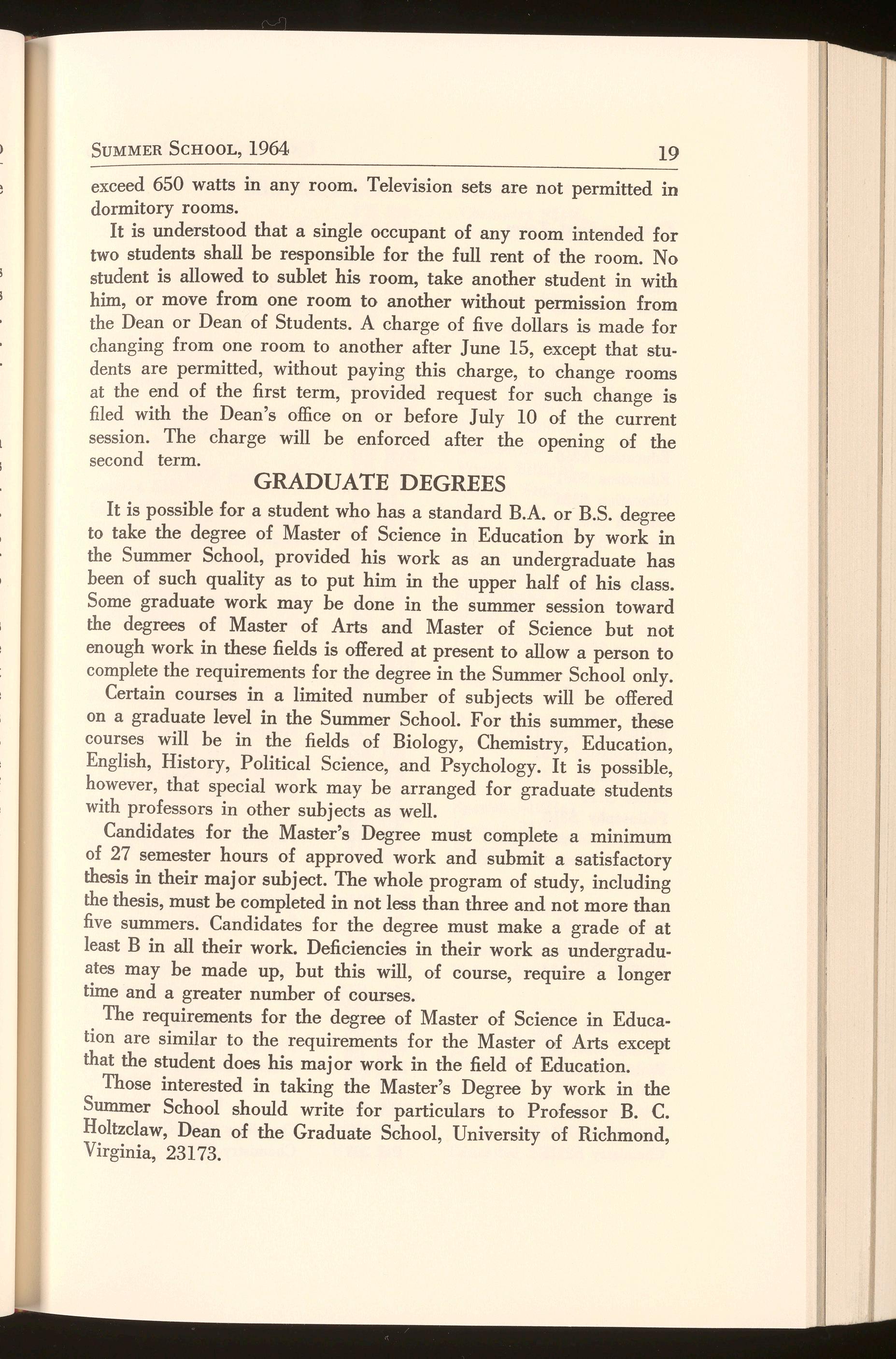
SUMMER SCHOOL, 1964 19
exceed 650 watts in any room. Television sets are not permitted in dormitory rooms.
It is understood that a single occupant of any room intended for two students shall be responsible for the full rent of the room. No student is allowed to sublet his room, take another student in with him, or move from one room to another without permission from the Dean or Dean of Students. A charge of five dollars is made for changing from one room to another after June 15, except that students are permitted, without paying this charge, to change rooms at the end of the first term, provided request for such change is filed with the Dean's office on or before July 10 of the current session. The charge will be enforced after the opening of the second term.
It is possible for a student who has a standard B.A. or B.S. degree to take the degree of Master of Science in Education by work in the Summer School, provided his work as an undergraduate has been of such quality as to put him in the upper half of his class. Some graduate work may be done in the summer session toward the degrees of Master of Arts and Master of Science but not enough work in these fields is offered at present to allow a person to complete the requirements for the degree in the Summer School only.
Certain courses in a limited number of subjects will be offered on a graduate level in the Summer School. For this summer, these courses will be in the fields of Biology, Chemistry, Education, English, History, Political Science, and Psychology. It is possible, however, that special work may be arranged for graduate students with professors in other subjects as well.
Candidates for the Master's Degree must complete a minimum of 27 semester hours of approved work and submit a satisfactory thesis in their major subject. The whole program of study, including the thesis, must be completed in not less than three and not more than five summers. Candidates for the degree must make a grade of at least B in all their work. Deficiencies in their work as undergraduates may be made up, but this will, of course, require a longer time and a greater number of courses.
The requirements for the degree of Master of Science in Educa- tion are similar to the requirements for the Master of Arts except that the student does his major work in the field of Education.
Those interested in taking the Master's Degree by work in the Summer School should write for particulars to Professor B. C. Holtzclaw, Dean of the Graduate School, University of Richmond, Virginia, 23173.
Course-First Term
Bible S203
Biology Sl0l (a)
Business Administration S301
Chemistry S213L
Chemistry S305C
Economics S201(a)
Education S350
Education S381 *
Education S526
English SlOl (a)
English S203 (a)
English S331*
Finance S365
French SlOl (a)
German Sl03
History S205 (a)
History S311*
Latin Sl03
Mathematics SlOl (a)
Mathematics Sl51
Mathematics S251 (a)
Music Slll
Philosophy S310
Physical Education S365
Political Science S205 (a)
Sociology S201
Sociology S301*
Spanish Sl03 ( a)
Accounting S303
Biology SlOl (a)
Biology SlOl (b)
Biology S210
Business Administration S307
Chemistry SlOl ( C)
Chemistry S211L
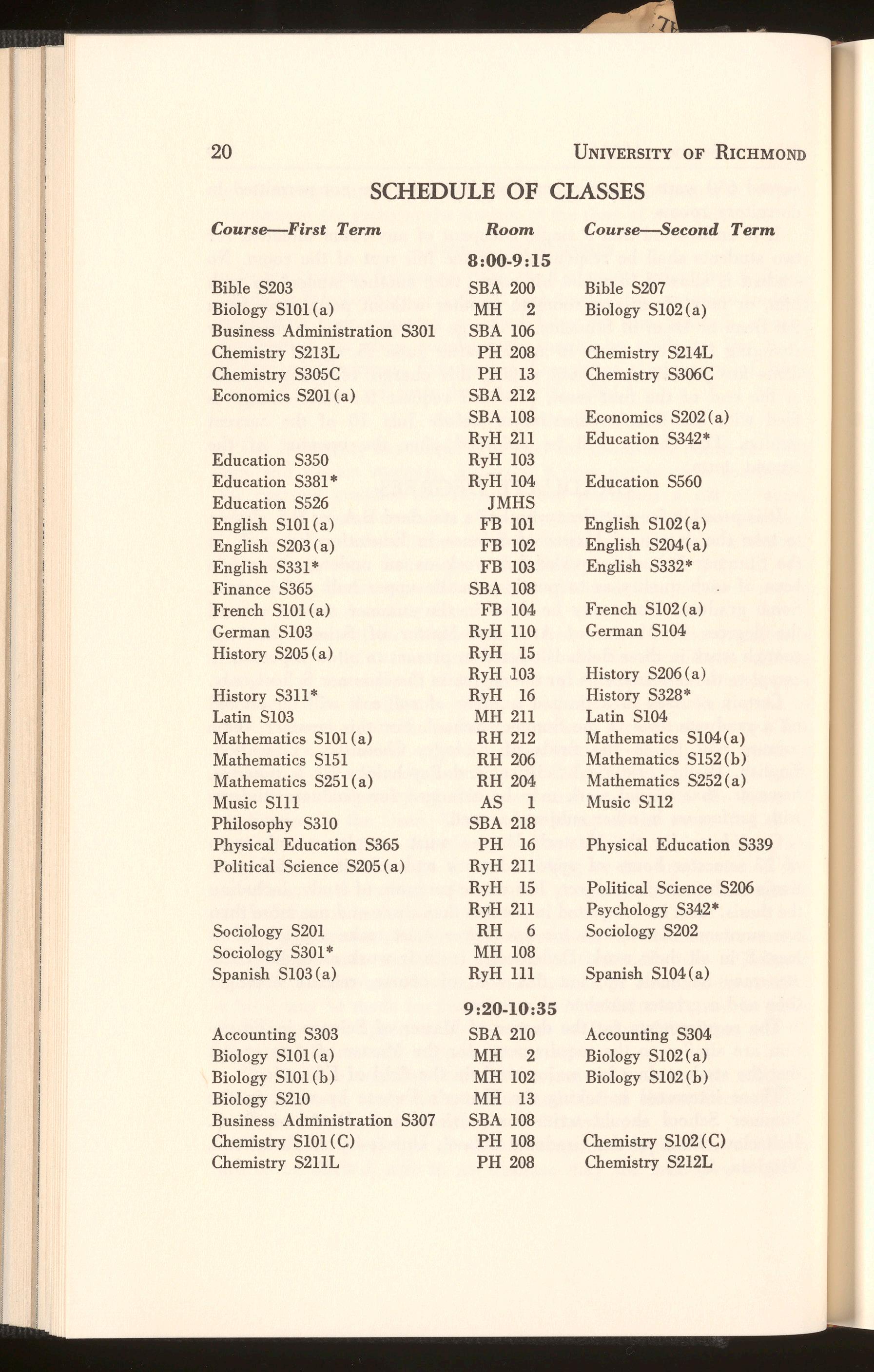
Room
8:00-9:15
SBA 200
MH 2
SBA 106
PH 208
PH 13
SBA 212
SBA 108
RyH 211
RyH 103
RyH 104
JMHS
FB 101
FB 102
FB 103
SBA 108
FB 104
RyH 110
RyH 15
RyH ,103
RyH 16
MH 211
RH 212
RH 206
RH 204
AS 1
SBA 218
PH 16
RyH 211
RyH 15
RyH 211
RH 6
MH 108
RyH 111
9:20-10:35
SBA 210
MH 2
MH 102
MH 13
SBA 108
PH 108
PH 208
Course-Second Term
Bible S207
Biology S102(a)
Chemistry S214L
Chemistry S306C
Economics S202 (a)
Education S342*
Education S560
English Sl02(a)
English S204(a)
English S332*
French Sl02(a)
German Sl04
History S206(a)
History S328*
Latin Sl04
Mathematics S104(a)
Mathematics Sl52 (b)
Mathematics S252 (a)
Music S112
Physical Education S339
Political Science S206
Psychology S342*
Sociology S202
Spanish Sl04(a)
Accounting S304
Biology Sl02 ( a)
Biology Sl02 (b)
Chemistry Sl02 ( C)
Chemistry S212L
Course--First Term
Chemistry S213L
Chemistry 305L
Economics S314
Education S326
Education S329*
Education S354
Education S380
Education S528
English SlOl(b)
English S203(b)
English S316*
French SlOl(b)
German SlOl
Greek SlOl
History Sl07 (a)
History S205(b)
Latin SlOl
Mathematics SlOl (b)
Music S207
Physical Education S360
Physics Sl03
Political Science S205 (h)
Psychology S201 (a)
Psychology S310
Psychology S337
Sociology S329*
Spanish SlOl (a)
Spanish S317*
Speech SlOl
Accounting S301
Bible S309*
Biology SlOl (b)
Biology SlOl (c)
Biology S210
Chemistry SlOlL
Chemistry S211L
Chemistry S213L
Chemistry S305L
Economics S201(b)
Economics S301
Education S352
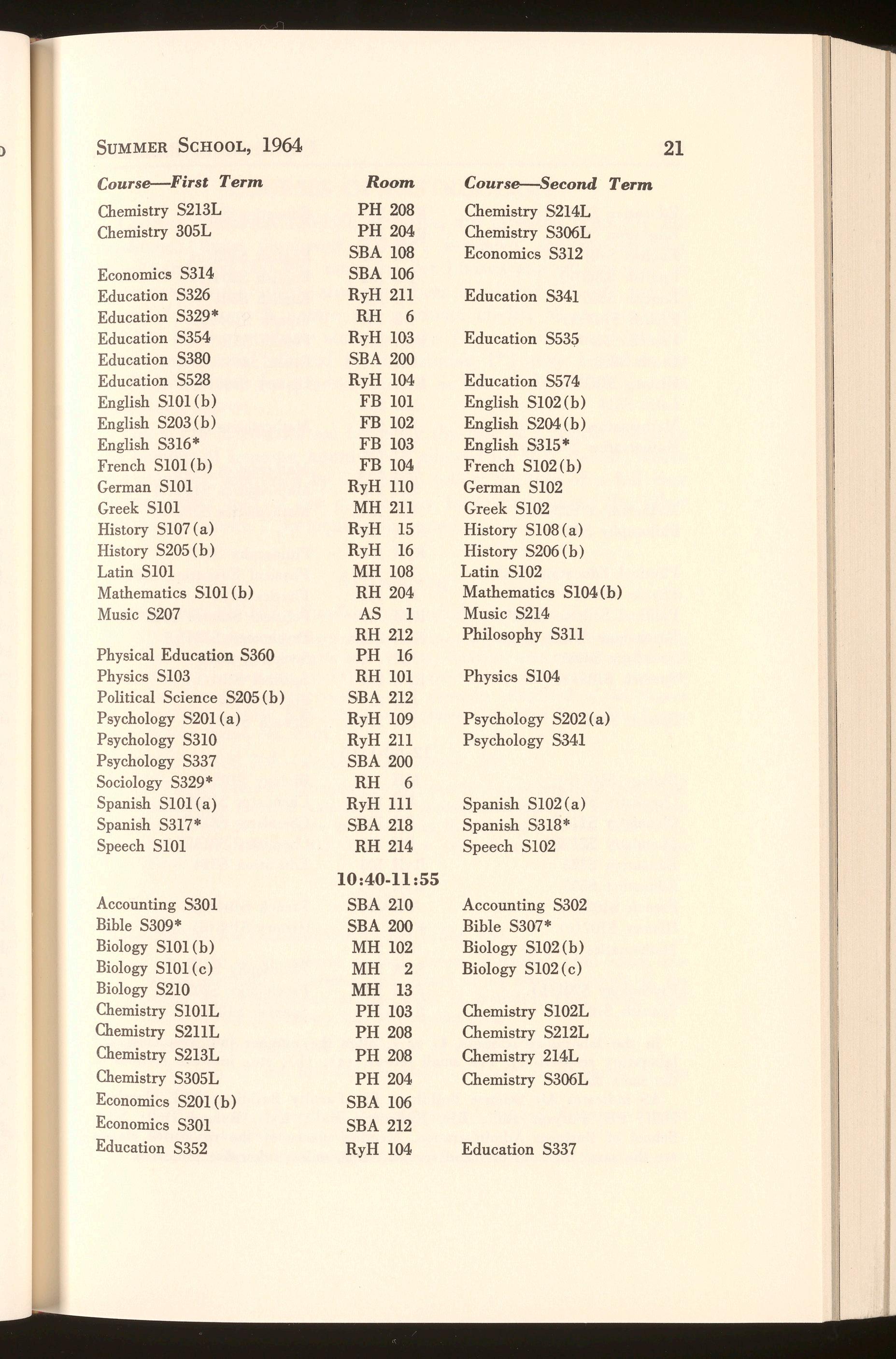
Room
PH 208
PH 204
SBA 108
SBA 106
RyH 211
RH 6
RyH 103
SBA 200
RyH 104
FB 101
FB 102
FB 103
FB 104
RyH 110
MH 211
RyH 15
RyH 16
MH 108
RH 204
AS 1
RH 212
PH 16
RH 101
SBA 212
RyH 109
RyH 211
SBA 200
RH 6
RyH 111
SBA 218
RH 214
10:40-11:55
SBA 210
SBA 200
MH 102
MH 2
MH 13
PH 103
PH 208
PH 208
PH 204
SBA 106
SBA 212
RyH 104
Course--Second Term
Chemistry S214L
Chemistry S306L
Economics S312
Education S341
Education S535
Education S574
English Sl02(b)
English S204(b)
English S315*
French S102(b)
German Sl02
Greek Sl02
History Sl08(a)
History S206 (b)
Latin Sl02
Mathematics Sl04(b)
Music S214
Philosophy S311
Physics Sl04
Psychology S202(a)
Psychology S341
Spanish Sl02 (a)
Spanish S318*
Speech Sl02
Accounting S302
Bible S307*
Biology S102(b)
Biology Sl02 ( c)
Chemistry Sl02L
Chemistry S212L
Chemistry 214L
Chemistry S306L
Education S337
Education S358 *
Education S579
Euglish SlOl(c)
English S203 ( c)
English S306*
French Sl03 ( a)
French S315*
Greek S203
History Sl07(b)
Latin S314
Mathematics S51
Matl1ematics SlOl(c)
Mathematics S251 (b)
Philosophy S207
Physical Education S355
Physics S103
Political Science S328 *
Psychology 5321 *
Sociology S303*
Spanish S103(b)
Speech S201
Biology Sl0l ( c)
Chemistry SlOlL
Chemistry S211C
Chemistry S213C
Education S323
Education S555
French Sl03 (b)
History Sl07 ( c)
Mathematics Sl52 (a)
Psychology S201 (b)
Spanish SlOl (b)
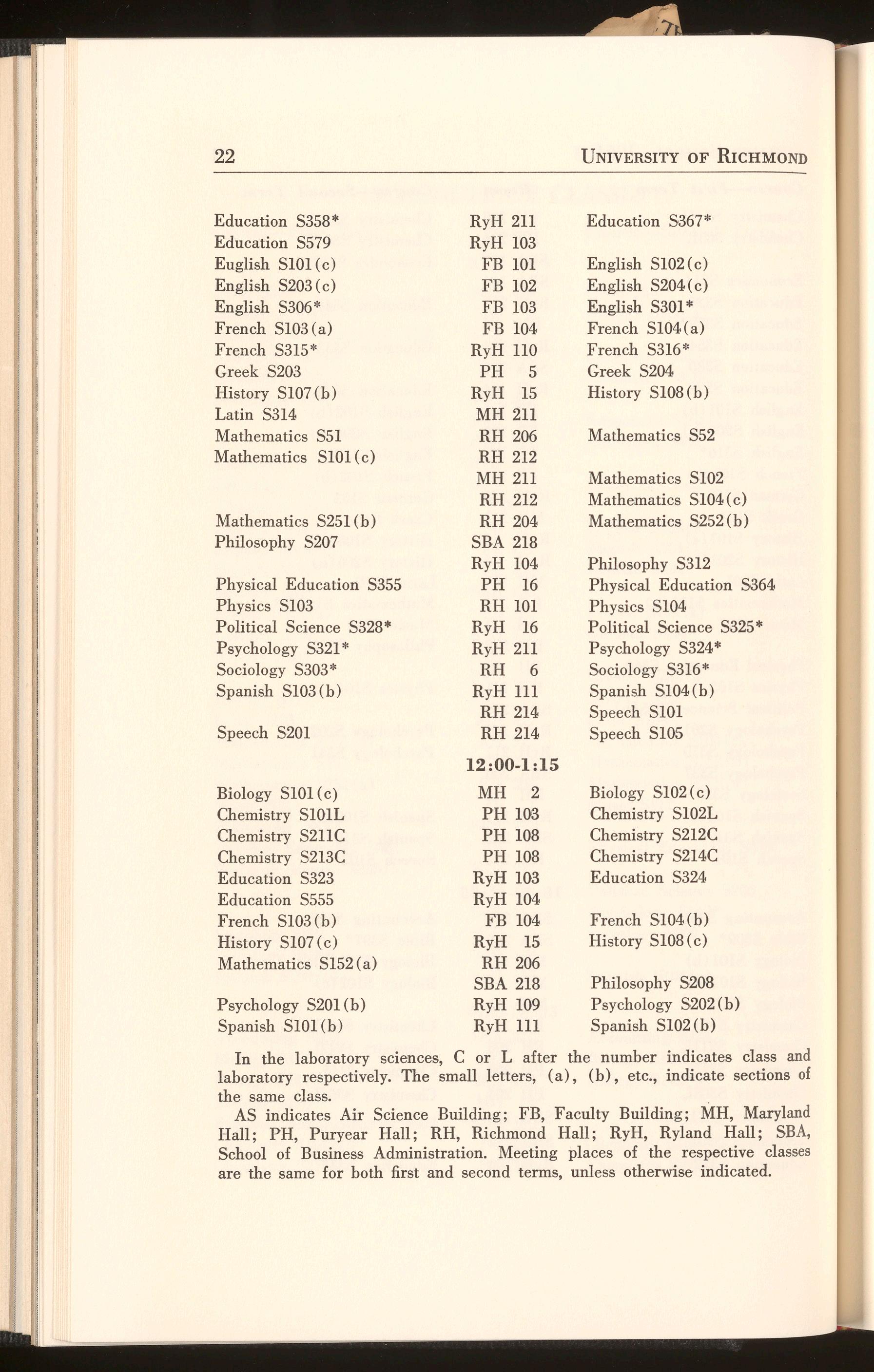
RyH 211
RyH 103
FB 101
FB 102
FB 103
FB 104
RyH 110
PH 5
RyH 15
MH 211
Education S367*
English Sl02(c)
English S204(c)
English S301 *
French Sl04(a)
French S316*
Greek S204
History Sl08(b)
RH 206 Mathematics S52
RH 212
MH 211 Mathematics Sl02
RH 212 Mathematics S104(c)
RH 204 Mathematics S252(b)
SBA 218
RyH 104
PH 16
Philosophy S312
Physical Education 5364
RH 101 Physics Sl04
RyH 16
Political Science S325*
RyH 211 Psychology S324*
RH 6
RyH 111
RH 214
Sociology S316*
Spanish S104(b)
Speech SlOl
RH 214 Speech Sl05
12:00-1:15
MH 2
PH 103
PH 108
PH 108
RyH 103
RyH 104
FB 104
RyH 15
RH 206
SBA 218
RyH 109
RyH 111
Biology S102 ( c)
Chemistry S102L
Chemistry S212C
Chemistry S214C
Education S324
French Sl04(b)
History Sl08 ( c)
Philosophy S208
Psychology S202(b)
Spanish Sl02 (b)
In the laboratory sciences, C or L after the number indicates class and laboratory respectively. The small letters, (a), (b), etc., indicate sections of the same class.
AS indicates Air Science Building; FB, Faculty Building; MH, Maryland Hall; PH, Puryear Hall; RH, Richmond Hall; RyH, Ryland Hall; SBA, School of Business Administration. Meeting places of the respective classes are the same for both first and second terms, unless otherwise indicated.
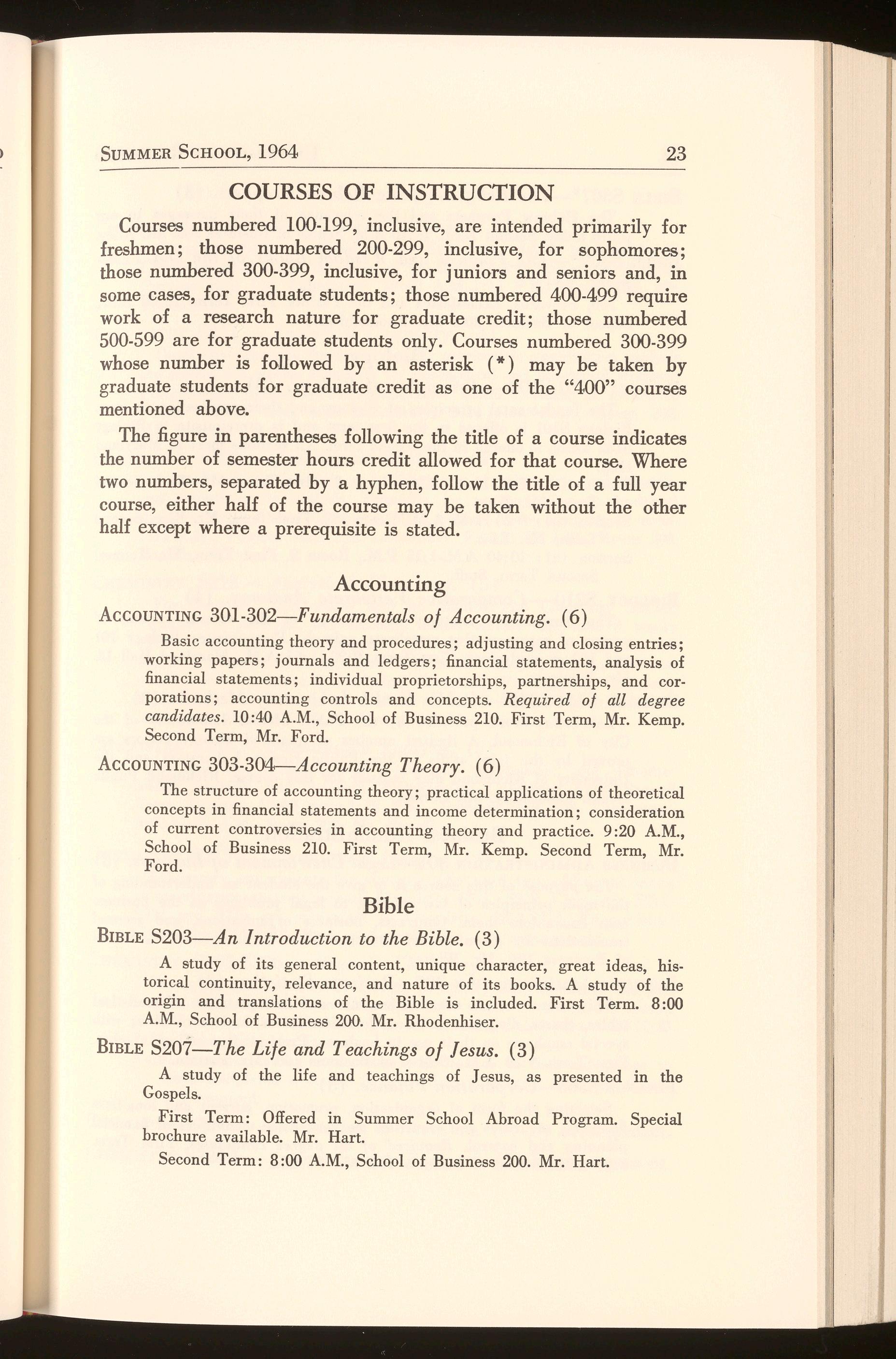
Courses numbered 100-199, inclusive, are intended primarily for freshmen; those numbered 200-299, inclusive, for sophomores; those numbered 300-399, inclusive, for juniors and seniors and, in some cases, for graduate students; those numbered 400-499 require work of a research nature for graduate credit; those numbered 500-599 are for graduate students only. Courses numbered 300-399 whose number is followed by an asterisk ( *) may he taken by graduat e students for graduate credit as one of the "400" courses mentioned above.
The figure in parentheses following the title of a course indicates the number of semester hours credit allowed for that course. Where two numbers, separated by a hyphen, follow the title of a full year course, either half of the course may he taken without the other half except where a prerequisite is stated.
ACCOUNTING 301-302-Fundamentals of Accounting. (6)
Basic accounting theory and procedures; adjusting and closing entries; working papers; journals and ledgers; financial statements, analysis of financial statements; individual propri eto rships, partnerships, and corporations; accounting controls and concepts. Required of all degree candidates. 10:40 A.M., School of Business 210. First Term, Mr. Kemp. Second Term, Mr. Ford.
ACCOUNTING 303-304--Accounting Theory. (6)
The structure of accounting theory; practical applications of th eoretical concepts in financial statements and income determination; consideration of current controversies in accounting theory and practice. 9 :20 A.M., School of Business 210. First Term, Mr. Kemp. Second Term, Mr. Ford.
BIBLE S203-An Introduction to the Bible. (3)
A study of its general content, unique character, great ideas, historical continuity, r ele vanc e, and nature of its books. A study of the origin and translations of the Bible is included. First Term. 8 :00 A.M., School of Business 200. Mr. Rhodenhiser.
BIBLE S201-The Life and Teachings of Jesus. (3)
A study of the life and teachings of Jesus, as presented in the Gospels.
First Term: Offered in Summer School Abroad Program. Special brochure available. Mr. Hart.
Second Term: 8:00 A.M., School of Business 200. Mr. Hart.
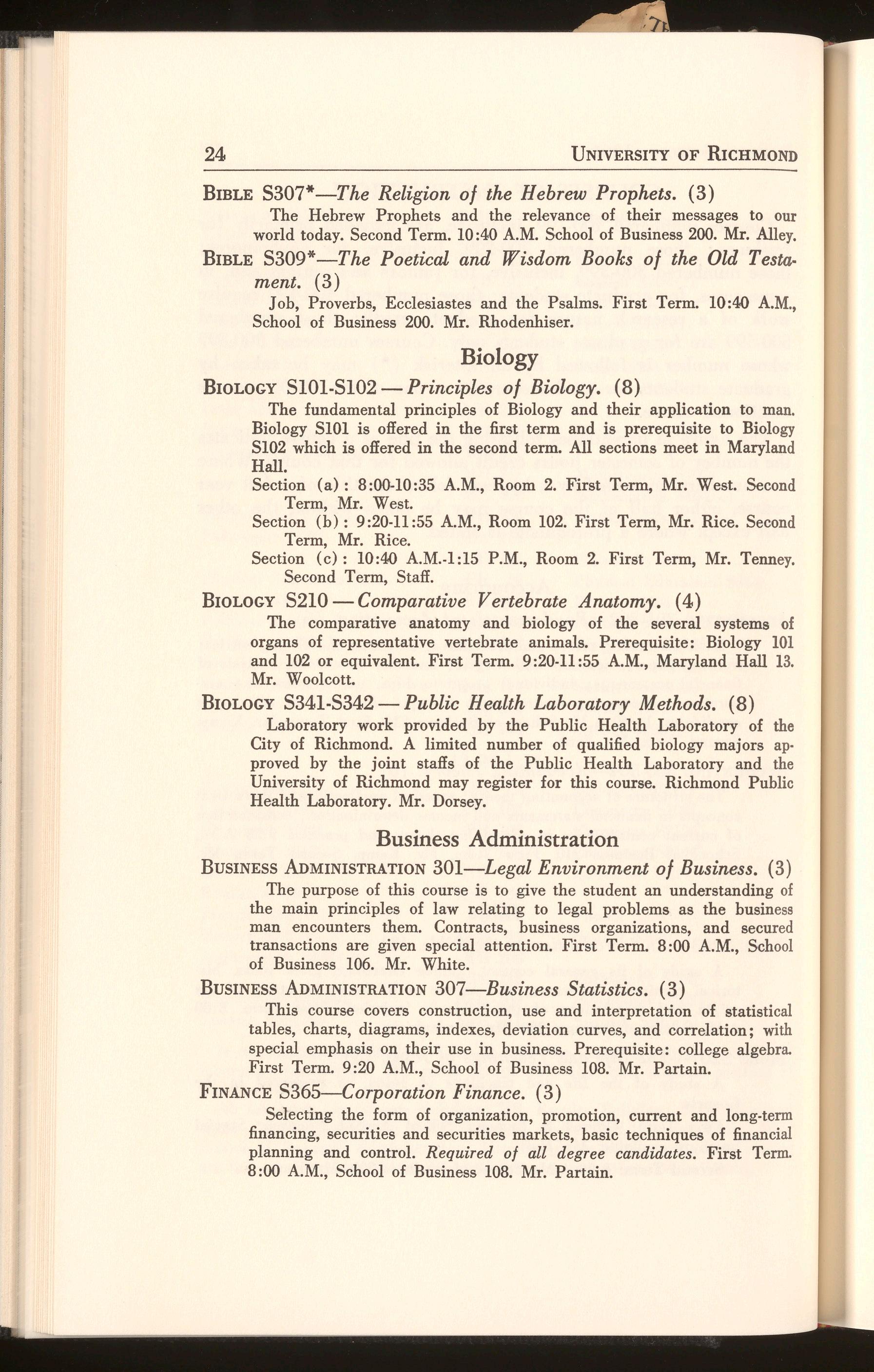
UNIVERSITY OF RICHMOND
BIBLE S307*-The Religion of the Hebrew Prophets. (3)
The Hebrew Prophets and the relevance of their messages to our world today. Second Term. 10:40 A.M. School of Business 200. Mr. Alley.
BIBLE S309*-The Poetical, and Wisdom Books of the Old Testament. (3)
Job, Proverbs, Ecclesiastes and the Psalms. First Term. 10:40 A.M., School of Business 200. Mr. Rhodenhiser.
BIOLOGY S101-S102 -Principles of Biology. (8)
The fundamental principles of Biology and their application to man. Biology Sl0l is offered in the first term and is prerequisite to Biology Sl02 which is offered in the second term. All sections meet in Maryland Hall.
Section (a): 8:00-10:35 A.M., Room 2. First Term, Mr. West. Second Term, Mr. West.
Section (b): 9:20-11:55 A.M., Room 102. First Term, Mr. Rice. Second Term, Mr. Rice.
Section (c): 10:40 A.M.-1:15 P.M., Room 2. First Term, Mr. Tenney. Second Term, Staff.
BIOLOGY S210 - Comparative Vertebrate Anatomy. (4)
The comparative anatomy and biology of the several systems of organs of representative vertebrate animals. Prerequisite: Biology 101 and 102 or equivalent. First Term. 9 :20-11 :55 A.M., Maryland Hall 13. Mr. Woolcott.
BIOLOGY S341-S342-Public Health Laboratory Methods. (8)
Laboratory work provided by the Public Health Laboratory of the City of Richmond. A limited number of qualified biology majors ap• proved by the joint staffs of the Public Health Laboratory and the University of Richmond may register for this course. Richmond Public Health Laboratory. Mr. Dorsey.
Business Administration
BUSINESS ADMINISTRATION 301-Legal, Environment of Business. (3)
The purpose of this course is to give the student an understanding of the main principles of law relating to legal problems as the business man encounters them. Contracts, business organizations, and secured transactions are given special attention. First Term. 8:00 A.M., School of Business 106. Mr. White.
BUSINESS ADMINISTRATION 307-Business Statistics. (3)
This course covers construction, use and interpretation of statistical tables, charts, diagrams, indexes, deviation curves, and correlation; with special emphasis on their use in business. Prerequisite: college algebra. First Term. 9:20 A.M., School of Business 108. Mr. Partain.
FINANCE S365-Corporation Finance. (3)
Selecting the form of organization, promotion, current and long-term financing, securities and securities markets, basic techniques of financial planning and control. Required of all degree candidates. First Term. 8 :00 A.M., School of Business 108. Mr. Partain.
SUMMERSCHOOL,1964
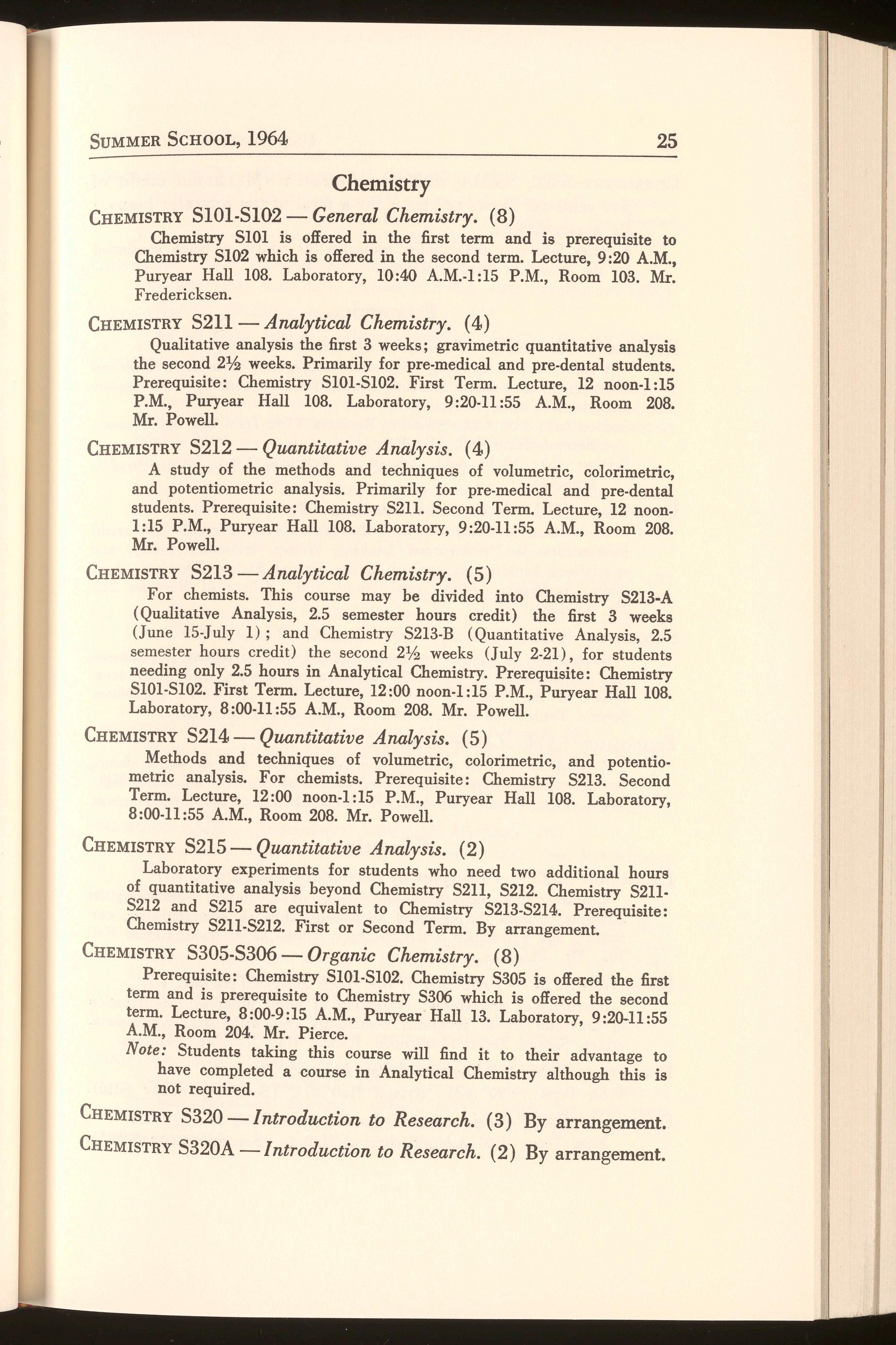
25
CHEMISTRYSlO1-Sl02 - General Chemistry. (8)
Chemistry S101 is offered in the first term and is prerequisite to Chemistry S102 which is offered in the second term. Lecture, 9:20 A.M., Puryear Hall 108. Laboratory, 10:40 A.M.-1:15 P.M., Room 103. Mr. Fredericksen.
CHEMISTRYS211 - Analytical Chemistry. (4)
Qualitative analysis the first 3 weeks; gravimetric quantitative analysis the second 2½ weeks. Primarily for pre-medical and pre-dental students. Prerequisite: Chemistry S101-S102. First Term. Lecture, 12 noon-I :15 P.M., Puryear Hall 108. Laboratory, 9 :20-11:55 A.M., Room 208. Mr. Powell.
CHEMISTRYS212 - Quantitative Analysis. (4)
A study of the methods and techniques of volumetric, colorimetric, and potentiometric analysis. Primarily for pre-medical and pre-dental students. Prerequisite: Chemistry S211. Second Term. Lecture, 12 noon1:15 P.M., Puryear Hall 108. Laboratory, 9:20-11:55 A.M., Room 208. Mr. Powell.
CHEMISTRYS213-Analytical Chemistry. (5)
For chemists. This course may be divided into Chemistry S213-A ( Qualitative Analysis, 2.5 semester hours credit) the first 3 weeks (June 15-July 1); and Chemistry S213-B (Quantitative Analysis, 2.5 semester hours credit) the second 2½ weeks (July 2-21), for students needing only 2.5 hours in Analytical Chemistry. Prerequisite: Chemistry S101-Sl02. First Term. Lecture, 12 :00 noon-I :15 P.M., Puryear Hall 108. Laboratory, 8 :00-11:55 A.M., Room 208. Mr. Powell.
CHEMISTRYS214 - Quantitative Analysis. ( 5)
Methods and techniques of volumetric, colorimetric, and potentiometric analysis. For chemists. Prerequisite: Chemistry S213. Second Term. Lecture, 12 :00 noon-I :15 P.M., Puryear Hall 108. Laboratory, 8:00-11:55 A.M., Room 208. Mr. Powell.
CHEMISTRYS215- Quantitative Analysis. (2)
Laboratory experiments for students who need two additional hours of quantitative analysis beyond Chemistry S211, S212. Chemistry S211S212 and S215 are equivalent to Chemistry S213-S214. Prerequisite: Chemistry S211-S212. First or Second Term. By arrangement.
CHEMISTRYS3O5-S306 - Organic Chemistry. (8)
Prerequisite: Chemistry S101-S102. Chemistry S305 is offered the first term and is prerequisite to Chemistry S306 which is offered the second term. Lecture, 8:00-9:15 A.M., Puryear Hall 13. Laboratory, 9:20-11:55 A.M., Room 204. Mr. Pierce.
Note: Students taking this course will find it to their advantage to have completed a course in Analytical Chemistry although this is not required.
CHEMISTRYS32O - Introduction to Research. (3) By arrangement.
CHEMISTRYS320A-lntroduction to Research. (2) By arrangement.
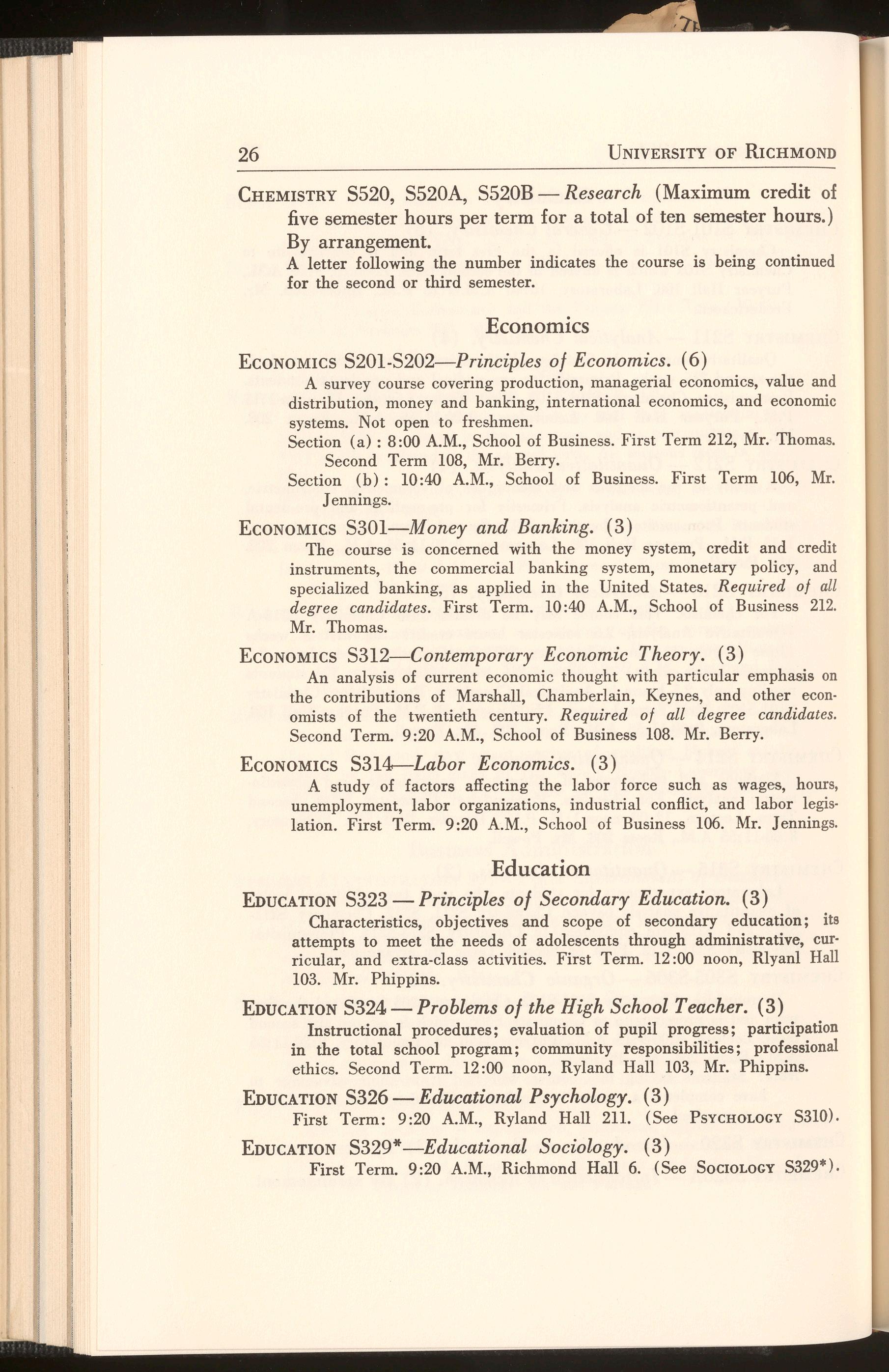
UNIVERSITY OF RICHMOND
CHEMISTRY S520, S520A, S520B - Research (Maximum credit of five semester hours per term for a total of ten semester hours.) By arrangement.
A letter following the number indicates the course is being continued for the second or third semester .
ECONOMICS S201-S202-Principles of Economics. (6)
A survey course covering production, managerial economics, value and distribution, money and banking, international economics, and economic systems. Not open to freshmen.
Section (a) : 8 :00 A.M., School of Business. First Term 212, Mr. Thom as. Second Term 108, Mr. Berry.
Section (b) : 10:40 A.M., School of Business. First Term 106, Mr. Jennings.
ECONOMICS S301-Money and Banking. (3)
The course is concerned with the money system, credit and credit instrum ents, the commercial banking system, monetary policy, and specialized banking, as applied in the United States. Required of all degree candidates. First Term. 10:40 A.M., School of Business 212. Mr. Thomas.
ECONOMICS S312-Contemporary Economic Theory. (3)
An analysis of current economic thou ght with particular emphasis on the contributions of Marshall, Chamberlain, Keynes, and other economists of the twentieth century. Required of all degree candidates. Second Term. 9:20 A.M., School of Business 108. Mr Berry.
ECONOMICS S314--Labor Economics. (3)
A study of factors affecting the labor force such as wages, hour s, unemployment, labor organizations, industrial conflict, and labor legi slation. First Term. 9:20 A.M., School of Business 106. Mr. Jennings .
EDUCATION S323-Principles of Secondary Education. (3)
Characteristics, objectives and scope of secondary education; its attempts to meet the needs of adolescents through administrative, curricular, and extra-class activities. First Term. 12:00 noon, Rlyanl Hall 103. Mr. Phippins.
EDUCATION S324-Problems of the High School Teacher. (3)
Instructional procedures; evaluation of pupil progress; participation in the total school program; community responsibilities; professional ethics. Second Term. 12 :00 noon, Ryland Hall 103, Mr. Phippins.
EDUCATION S326- Educational Psychology. (3)
First Term: 9:20 A.M., Ryland Hall 211. (See PSYCHOLOGYS310).
EDUCATION S329*-Educational Sociology. (3)
First Term. 9:20 A.M., Richmond Hall 6. (See SocIOLOGYS329*).
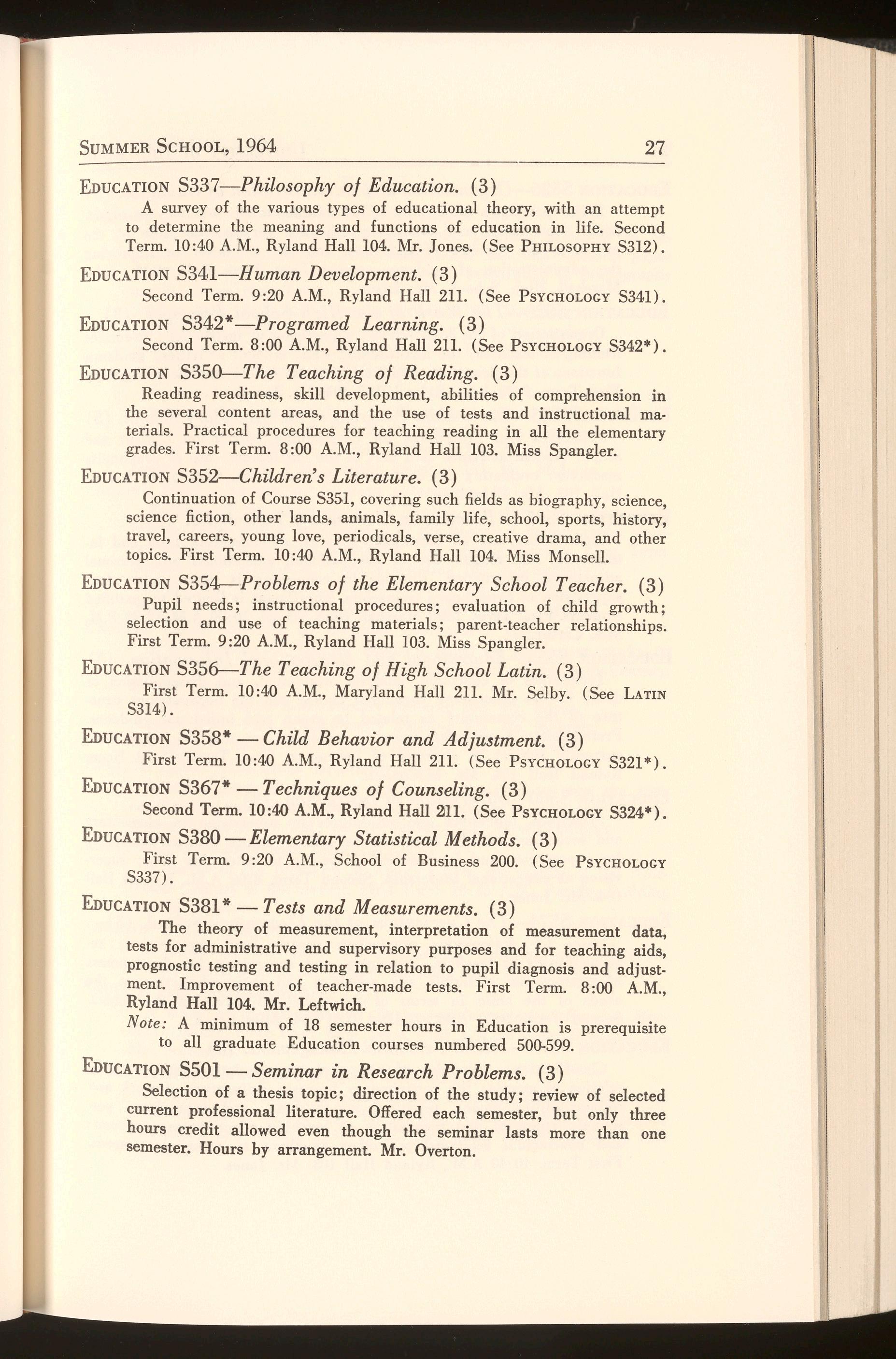
SUMMER SCHOOL, 1964 27
EDUCATION S337-Philosophy of Education. (3)
A survey of the various types of educational theory, with an attempt to determine the meaning and functions of education in life. Second Term. 10:40 A.M., Ryland Hall 104. Mr. Jones. (See PHILOSOPHYS312).
EDUCATION S341-Human Development. (3)
Second Term. 9 :20 A.M., Ryland Hall 211. (See PSYCHOLOGYS341).
EDUCATION S342*-Programed Leaming. (3)
Second Term. 8 :00 A.M., Ryland Hall 211. (See PSYCHOLOGYS342*).
EDUCATION S350-The Teaching of Reading. (3)
Reading readiness, skill development, abilities of comprehension in the several content areas, and the use of tests and instructional materials. Practical procedures for teaching reading in all the elementary grades. First Term. 8:00 A.M., Ryland Hall 103. Miss Spangler.
EDUCATION S352-Children' s Literature. (3)
Continuation of Course S351, covering such fields as biography, science, science fiction, other lands, animals, family life, school, sports, history, travel, careers, young love, periodicals, verse, creative drama, and other topics. First Term. 10:40 A.M., Ryland Hall 104. Miss Monsell.
EDUCATION S354-Problems of the Elementary School Teacher. (3)
Pupil needs; instructional procedures; evaluation of child growth; selection and use of teaching materials; parent-teacher relationships. First Term. 9:20 A.M., Ryland Hall 103. Miss Spangler .
EDUCATION S356-The Teaching of High School Latin. (3)
First Term. 10:40 A.M., Maryland Hall 211. Mr. Selby. (See LATIN S314).
EDUCATION S358* -Child Behavior and Adjustment. (3)
First Term. 10:40 A.M., Ryland Hall 211. (See PSYCHOLOGYS321*).
EDUCATION S367* -Techniques of Counseling. (3)
Second Term. 10 :40 A.M., Ryland Hall 211. (See PSYCHOLOGYS324*).
EDUCATION S380 - Elementary Statistical Methods. ( 3)
First Term. 9:20 A.M., School of Business 200. (See PsYCHOLOGY S337).
EDUCATION S381 * -Tests and Measurements. (3)
The theory of measurement, interpretation of measurement data, tests for administrative and supervisory purposes and for teaching aids, prognostic testing and testing in relation to pupil diagnosis and adjustment. Improvement of teacher-made tests. First Term. 8 :00 A.M., Ryland Hall 104. Mr. Leftwich.
Note: A minimum of 18 semester hours in Education is prerequisite to all graduate Education courses numbered 500-599.
EDUCATION S501-Seminar in Research Problems. (3)
Selection of a thesis topic; direction of the study; review of selected current professional literature. Offered each semester, but only three hours credit allowed even though the seminar lasts more than one semester. Hours by arrangement. Mr. Overton.
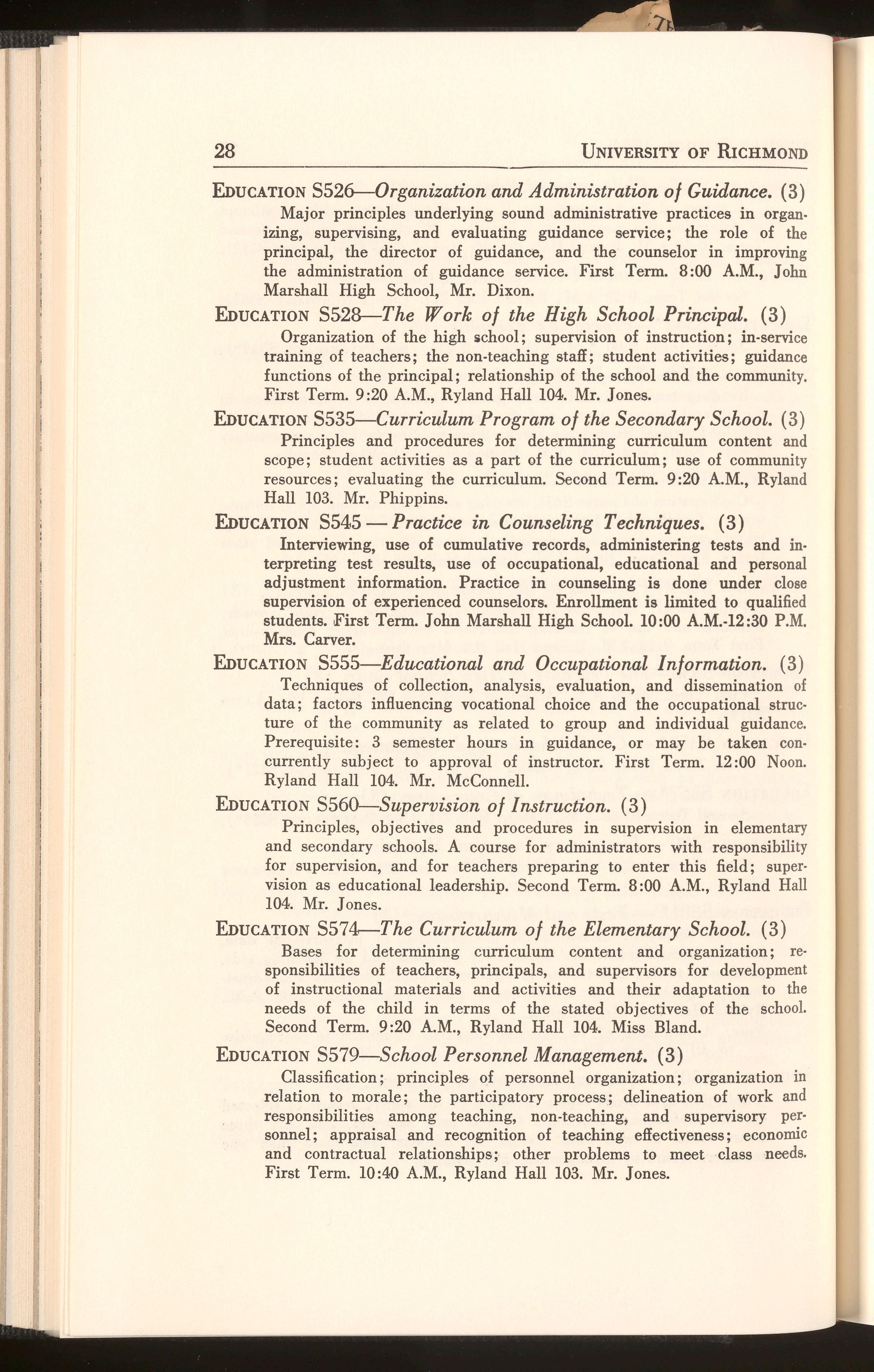
UNIVERSITY OF RICHMOND
EDucATION S526-0rganization and Administration of Guidance. (3)
Major principles underlying sound administrative practices in organizing, supervising, and evaluating guidance service; the role of th e principal, the director of guidance, and the counselor in improvin g the administration of guidance service. First Term. 8 :00 A.M., John Marshall High School, Mr. Dixon.
EDUCATION S528---The Work of the High School Principal. (3) Organization of the high i;;chool; supervision of instruction; in-servi ce training of teachers; the non-teaching staff; student activities; guidan ce functions of the principal; relationship of the school and the communi ty. First Term. 9:20 A M., Ryland Hall 104. Mr. Jones.
EDUCATION S535-Curriculum Program of the Secondary School. ( 3) Principles and procedures for determining curriculum content and scope; student activities as a part of the curriculum; use of communi ty resources; evaluating the curriculum. Second Term. 9:20 A.M., Ryla nd Hall 103. Mr. Phippins.
EDUCATION S545 - Practice in Counseling Techniques. (3)
Interviewing, use of cumulative records, administering tests and in• terpreting test results, use of occupational, educational and personal adjustment information. Practice in counseling is done under close supervision of experienced counselors. Enrollment is limited to qualifi ed students. First Term. John Marshall High School. 10 :00 A.M.-12 :30 P .M. Mrs. Carver.
EDUCATION S555-Educational and Occupational Information. (3 )
Techniques of collection, analysis, evaluation, and dissemination of data; factors influencing vocational choice and the occupational stru c• ture of the community as related to group and individual guidan ce. Prerequisite: 3 semester hours in guidance, or may be taken con• currently subject to approval of instructor. First Term 12 :00 Noon. Ryland Hall 104. Mr. McConnell.
EDUCATION S560--Supervision of Instruction. (3)
Principles, objectives and procedures in supervision in element ary and secondary schools. A course for administrators with responsibili ty for supervision, and for teachers preparing to enter this field; sup ervision as educational leadership. Second Term. 8 :00 A.M., Ryland Hall 104. Mr. Jones
EDUCATION S574-The Curriculum of the Elementary School. (3)
Bases for determining curriculum content and organization; responsibilities of teachers, principals, and supervisors for developm ent of instructional materials and activities and their adaptation to the needs of the child in terms of the stated objectives of the school. Second Term. 9:20 A.M., Ryland Hall 104. Miss Bland.
EDUCATION S579-School Personnel Management. (3)
Classification; principles of personnel organization; organization in relation to morale; the participatory process; delineation of work and responsibilities among teaching, non-teaching, and supervisory personnel; appraisal and recognition of teaching effectiveness; economic and contractual relationships; other problems to meet class needs First Term. 10:40 A.M., Ryland Hall 103. Mr. Jones.
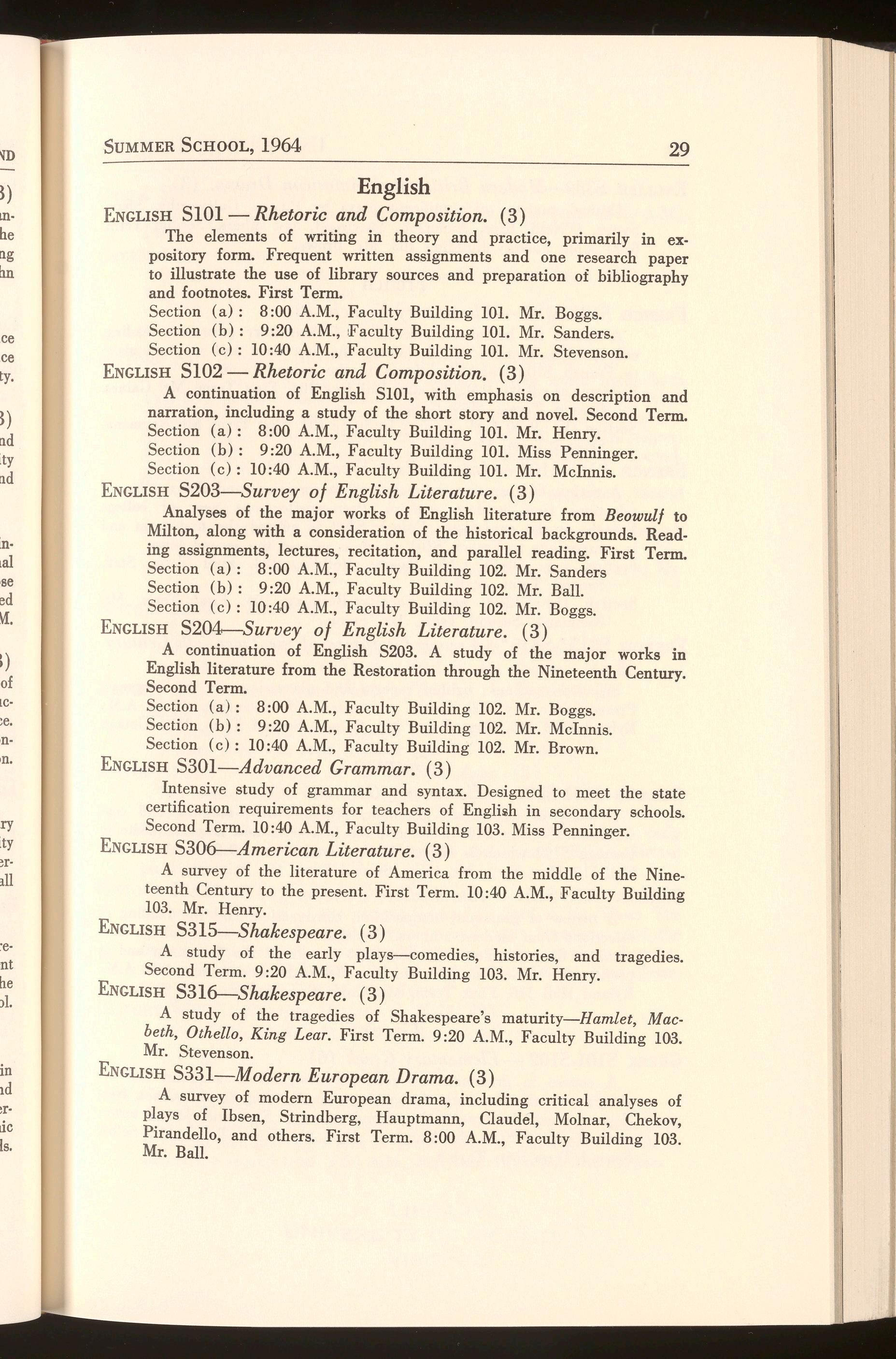
ENGLISH S101-Rhetoric and Composition. (3)
The elements of writing in theory and practice, primarily in expository form. Frequent written assignments and one research paper to illustrate the use of library sources and preparation oi bibliography and footnotes. First Term.
Section (a): 8:00 A.M., Faculty Building 101. Mr. Boggs.
Section (b): 9:20 A.M., ,Faculty Building 101. Mr. Sanders .
Section (c): 10:40 A.M., Faculty Building 101. Mr. Stevenson.
ENGLISH S102-Rhetoric and Composition. (3)
A continuation of English SlOl, with emphasis on description and narration, including a study of the short story and novel. Second Term.
Section (a): 8:00 A.M., Faculty Building 101. Mr. Henry.
Section (b): 9:20 A.M., Faculty Building 101. Miss Penninger.
Section (c): 10:40 A.M., Faculty Building 101. Mr. Mcinnis.
ENGLISH S203-Survey of English Literature. (3)
Analyses of the major works of English literature from Beowulf to Milton, along with a consideration of the historical backgrounds. Reading assignments, lectures, recitation, and parallel reading. First Term.
Section (a): 8:00 A.M., Faculty Building 102. Mr. Sanders
Section (b): 9:20 A.M., Faculty Building 102. Mr. Ball.
Section (c): 10:40 A.M., Faculty Building 102. Mr. Boggs.
ENGLISH S204--Survey of English Literature. (3)
A continuation of English S203. A study of the major works in English literature from the Restoration through the Nineteenth Century. Second Term.
Section (a): 8 :00 A.M., Faculty Building 102. Mr. Boggs. Section (b): 9:20 A.M., Faculty Building 102. Mr. Mcinnis.
Section (c): 10:40 A.M., Faculty Building 102. Mr. Brown.
ENGLISH S301-Advanced Grammar. (3)
Intensive study of grammar and syntax. Designed to meet the state certification requirements for t eachers of Englii1h in secondary schools. Second Term. 10:40 A.M., Faculty Building 103. Miss Penninger.
ENGLISH S306--American Literature. (3)
A survey of the literature of America from the middle of the Nineteenth Century to the present. First Term. 10:40 A.M., Faculty Building 103. Mr. Henry.
ENGLISH S315-Shakespeare. ( 3)
A study of the early plays-comedies, histories, and tragedies. Second Term. 9:20 A.M., Faculty Building 103 Mr. Henry .
ENGLISH S316--Shakespeare. (3)
A study of the tragedies of Shakespeare's maturity-Hamlet, Macbeth, Othello, King Lear. First Term. 9:20 A.M., Faculty Building 103. Mr. Stevenson.
ENGLISH S331-Modem European Drama. (3)
A survey of modern European drama, including critical analyses of plays of Ibsen, Strindberg, Hauptmann, Claude!, Molnar, Chekov, Pirandello, and others. First Term. 8:00 A.M., Faculty Building 103. Mr. Ball.
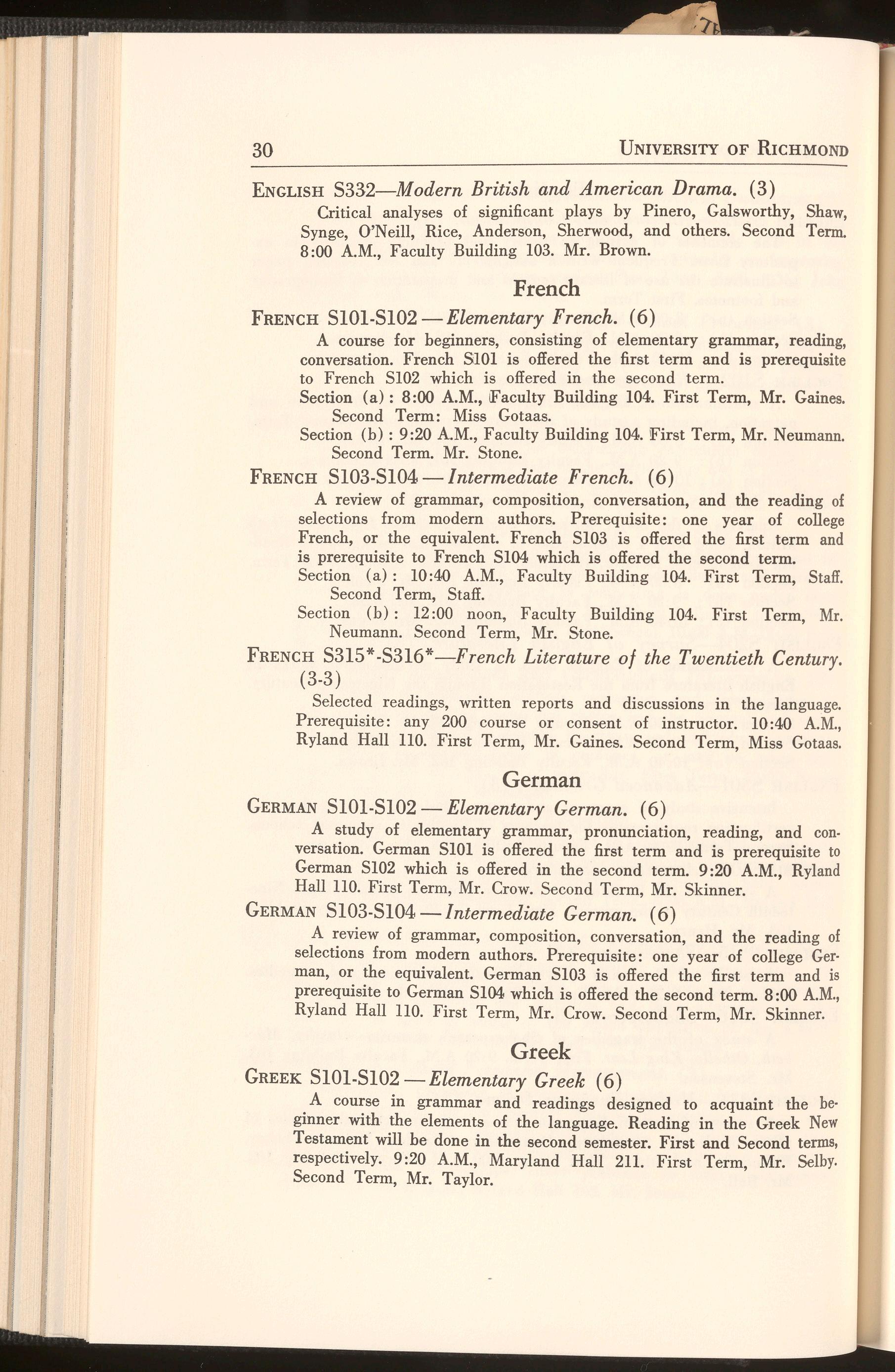
UNIVERSITY OF RICHMOND
ENGLISH S332-Modern British and American Drama. (3)
Critical analyses of significant plays by Pinero, Galsworthy, Shaw, Synge, O'Neill, Rice, Anderson, Sherwood, and others. Second Tenn. 8:00 A.M , Faculty Building 103. Mr. Brown.
FRENCH S101-S102 - Elementary French. (6)
A course for beginners, consisting of elementary grammar, reading, conversation. French S101 is offered the first term and is prerequisite to French Sl02 whi ch is offered in the second t erm
Section (a): 8:00 A.M., (Faculty Building 104. First Term, Mr. Gaines. Second Term: Miss Gotaas
Section (b) : 9:20 A.M., Faculty Building 104. First Term, Mr. Neumann . Second Term. Mr. Stone.
FRENCH S103-S104-lntermediate French. (6)
A review of grammar, composition, conversation, and the reading of selections from modern authors. Prerequisite: one year of college French, or the equivalent. French Sl03 is offered the first term and is prerequisite to French Sl04 which is offered the second term.
Section (a): 10:40 A.M., Faculty Building 104 First Term, Staff. Second Term, Staff.
Section (b): 12 :00 noon, Fa culty Building 104. First Term, Mr. Neumann. Second Term, Mr. Stone.
FRENCH S315*-S316*-French Literature of the Twentieth Century. (3-3)
Select ed reading s, written reports and dis cussions in the languag e. Prerequi sit e : any 200 course or consent of instructor. 10:40 A.M., Ryland Hall 110. First Term, Mr Gaines. Second Term, Miss Gotaas.
GERMAN S101-S102-Elementary German. (6)
A study of elementary grammar, pronunciation, reading, and conversation. German SlOl is offered the first term and is prerequisite to German Sl02 which is offered in the second term. 9 :20 A.M., Ryland Hall 110. First Tern1, Mr. Crow. Second Term, Mr. Skinner.
GERMAN S103-S104-lntermediate German. (6)
A review of grammar, composition, conversation, and the reading of selections from modern authors. Prerequisite : one year of college Ger· man, or the equivalent. German Sl03 is offered the first term and is prerequisite to German Sl04 which is offered the second term. 8 :00 A.M., Ryland Hall 110. First Term, Mr. Crow. Second Term, Mr. Skinner
GREEK S101-S102-Elementary Greek (6)
A course in grammar and readings designed to acquaint the beginner with the elements of the language. Reading in the Greek New Testament will be done in the second semester. First and Second terms, respectively. 9:20 A.M., Maryland Hall 211. First Term, Mr. Selby. Second Term, Mr. Taylor.
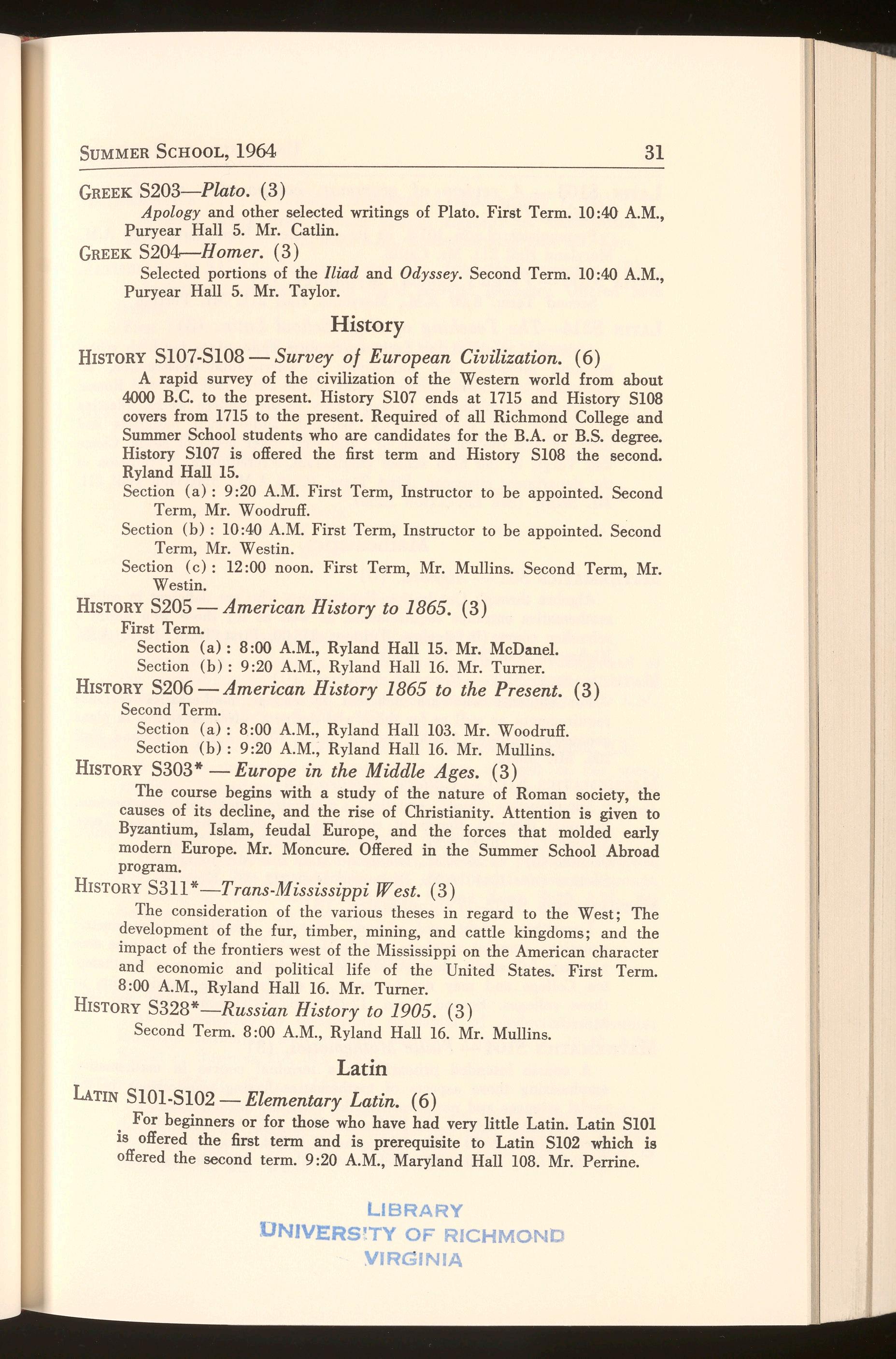
SUMMER SCHOOL, 1964 31
GREEK S203-Plato. (3)
Apology and other selected writings of Plato. First Term. 10:40 A.M., Puryear Hall 5. Mr. Catlin.
GREEK S204-H omer. ( 3)
Selected portions of the Iliad and Odyssey. Second Term. 10:40 A.M., Puryear Hall 5. Mr. Taylor.
HISTORY S107-S108-Survey of European Civilization. (6)
A rapid survey of the civilization of the Western world from about 4000 B.C. to the present. History Sl07 ends at 1715 and History Sl08 covers from 1715 to the present. Required of all Richmond College and Summer School students who are candidates for the B.A. or B.S. degree. History Sl07 is offered the first term and History Sl08 the second. Ryland Hall 15.
Section (a): 9:20 A.M. First Term, Instructor to be appointed. Second Term, Mr. Woodruff.
Section (b): 10:40 A.M. First Term, Instructor to be appointed. Second Term, Mr. Westin
Section (c): 12:00 noon. First Term, Mr. Mullins . Second Term, Mr. Westin.
HISTORY S205-American History to 1865. (3) First Term.
Section (a): 8:00 A.M., Ryland Hall 15. Mr. McDanel.
Section (b): 9:20 A.M., Ryland Hall 16. Mr. Turner.
HISTORY S206 -American History 1865 to the Present. ( 3) Second Term.
Section (a): 8:00 A.M., Ryland Hall 103. Mr. Woodruff.
Section (b): 9:20 A.M., Ryland Hall 16. Mr Mullins.
HISTORY S303* -Europe in the Middle Ages. (3)
The course begins with a study of the nature of Roman society, the causes of its decline, and the rise of Christianity. Attention is given to Byzantium, Islam, feudal Europe, and the forces that molded early modern Europe. Mr. Moncure. Offered in the Summer School Abroad program.
HISTORY S311 *-Trans-Mississippi West. (3)
The consideration of the various theses in regard to the West; The development of the fur, timber, mining, and cattle kingdoms; and the impact of the frontiers west of the Mississippi on the American character and economic and political life of the United States. First Term. 8:00 A.M., Ryland Hall 16. Mr. Turner.
HISTORY S328*-Russian History to 1905. (3)
Second Term. 8:00 A.M., Ryland Hall 16. Mr. Mullins.
LATIN S101-S102-Elementary Latin. (6)
For beginners or for those who have had very little Latin Latin SlOl is offered the first term and is prerequisite to Latin Sl02 which is offered the second term. 9 :20 A.M., Maryland Hall 108. Mr. Perrine

UNIVERSITY OF RICHMOND
LATIN S103 -A review of grammar, composition and Cicero's Orations. (3)
Prerequisite: Latin 101-2, or its equivalent. First Term. 8:00 A.M., Maryland Hall 211. Mr. Catlin.
LATIN S104-Vergil's Aeneid; Mythology. (3)
Second Term. 8:00 A.M., Maryland Hall 211. Mr. Perrine.
LATIN S314-The Teaching of High School Latin. (3)
A detailed study of the Latin curriculum appropriate for high school teaching including the philosophy of curriculum construction, organization, correlation of the mastery of the Latin language and Roman culture, a transmission of Roman legacy to the modern world, selection of reading and supplementary material, audio-visual materials and methods, and the correlation of Latin with other fields of study. Cicero and Vergil in the high school curriculum. Prerequisite: Permission of the department chairman. First Term. 10:40 A.M., Maryland Hall 2ll. Mr. Selby. (See EouCATION S356).
MATHEMATICS S51-Algebra. (0)
Algebra through Quadratics. For students who are deficient in college mathematics entrance requirements, as well as for those who desire a refresher course in algebra. Tuition: $45.00. First Term. 10:40 A.M., Richmond Hall 206. Mr. Monk.
MATHEMATICS S52 - Plane Geometry. (0)
For students who are deficient in college mathematics entrance requirements, as well as for those who desire a refresher course in plane geometry. Tuition: $45.00. Second Term. 10:40 A.M., Richmond Hall 206. Mr. Monk.
MATHEMATICS S101- College Algebra. (3)
Simultaneous linear equations, quadratic equations, progressions, binomial theorem, theory of equations and determinants. First Term. Section (a): 8:00 A.M., Richmond Hall 212. Mr. Monk.
Section (b): 9:20 A.M., Richmond Hall 204. Mr. Johnson. Section (c): 10:40 A.M., Richmond Hall 212. Mr. Key.
MATHEMATICS S102-Trigonometry. (3)
Logarithms, right and oblique triangles, identities, trigonom etric equations, complex numbers, and DeMoivre's Theorem. This course does not carry full credit when transferred to Richmond College or Westhampton College and may not be used to satisfy degree requirements in these colleges. Second Term. 12 :00 noon, Richmond Hall 206 Mr. Murrill.
MATHEMATICS S104 - Finite Mathematics. (3)
A course intended primarily as a terminal course in mathematics, emphasizing those aspects of mathematics having applications in the social sciences and not involving the calculus. Second Term.
Section (a) : 8 :00 A.M., Richmond Hall 212. Mr. Murrill.
Section (b): 9:20 A.M., Richmond Hall 204. Mrs. Stokes.
Section (c): 10:40 A.M., Richmond Hall 212. Mrs. Stokes.

SUMMER SCHOOL, 1964 33
MATHEMATICS S151- College Algebra; Trigonometry I. (3)
Selected topics from modern college algebra; an introduction to trigonometry. First Term. 8:00 A.M., Richmond Hall 206. Mr. Key.
MATHEMATICS S152 -Trigonometry II; Analytic Geometry. (3)
Analytical trigonometry and plane analytic geometry. Offered both terms.
First Term:
Section (a): 12:00 noon, Richmond Hall 206. Mr. Johnson. Second Term:
Section (b): 8:00 A.M., Richmond Hall 206. Mr. Monk.
MATHEMATICS S251-S252-Differentwl and Integral Calculus. (3-3)
Differential and integral calculus of functions of one independent variable. Prerequisite: Mathematics 152. Course 251 is prerequisite to course 252.
Section (a): 8 :00 A.M., Richmond Hall 204. First Term, Mr. Davis. Second Term, Mr. Davis.
Section (b): 10:40 A.M., Richmond Hall 204. First Term, Mr. Davis. Second Term, Mr. Davis.
Music Slll-Sll2-Apprecwtion of Music. (3-3)
Introduction to list ening, designed to broaden the background of the general student. A study of the present-day repertory and its historical development. First and second terms respectively. 8 :00 A.M., Air Science Building 1. Mr. Miller.
Music S207-Teaching of Music in the Elementary School. (3)
A course preparing the classroom teacher as well as the music specialist. Procedures and materials for the various musical experiences of children. First Term. 9:20 A.M., Air Science Building 1. Mr. Troxell.
Music S214-Teaching of Music in the Secondary School. (3)
The place of music in the secondary school, its problems, methods, and materials. The general music class, choral and instrumental groups, the study of theory and appreciation. Second Term. 9:20 A.M., Air Science Building 1. Mr. Troxell.
PHILOSOPHY S207-Logic. (3)
An introduction to semantics; principles of deductive reasoning; inductive reasoning and scientific method. First Term. 10:40 A.M., School of Business 218. Mr. White.
PHILOSOPHY S208--Ethics. (3)
An examination of moral experience and the various types of ethical theory, with an attempt to determine the valid principles of right conduct. Open to freshmen. Second Term. 12:00 noon, School of Business 218. Mr. White.
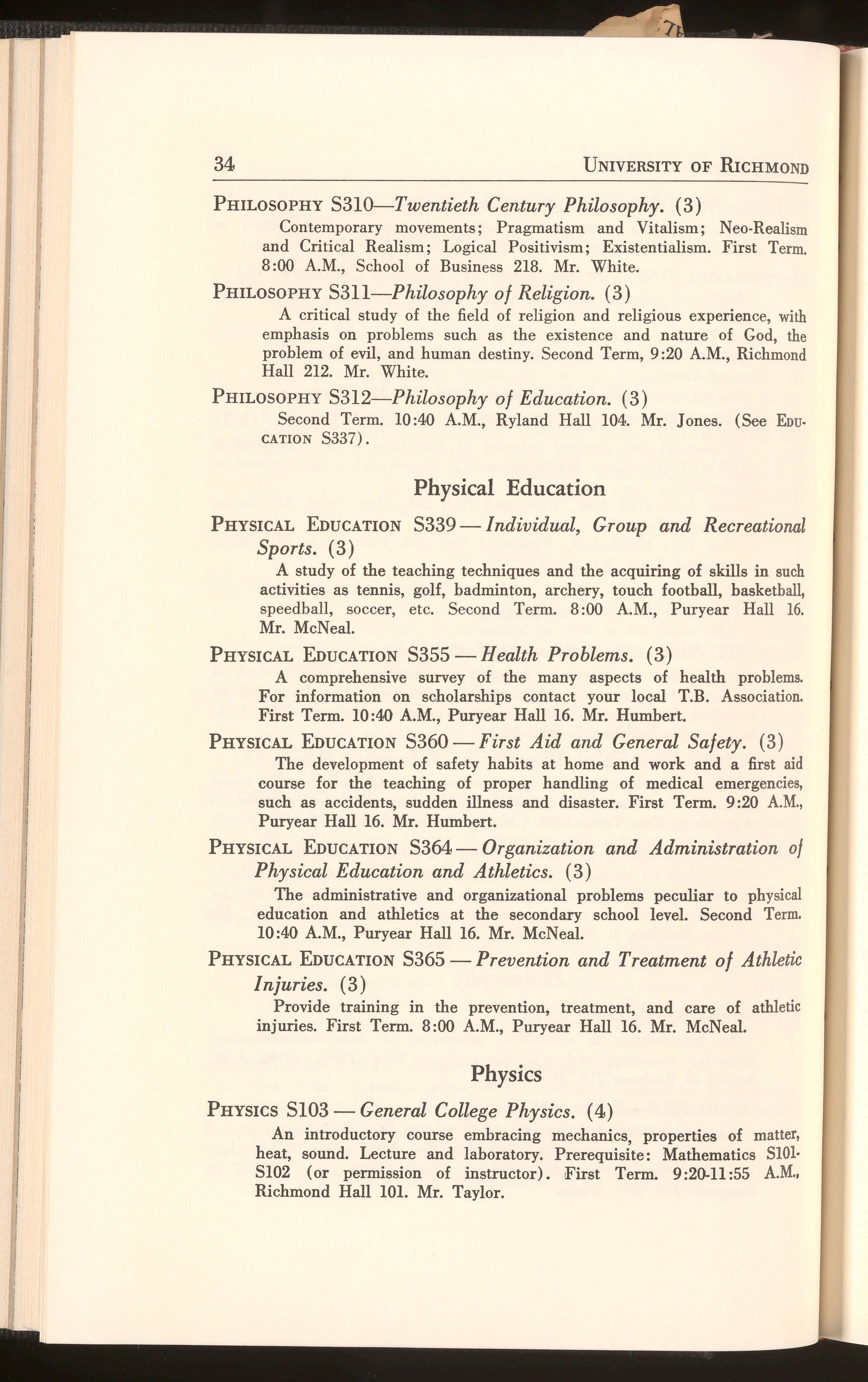
UNIVERSITY OF RICHMOND
PHILOSOPHY S310-Twentieth Century Philosophy. (3)
Contemporary movements; Pragmatism and Vitalism; Neo-Realism and Critical Realism; Logical Positivism; Existentialism. First Term 8 :00 A.M., School of Business 218. Mr. White.
PHILOSOPHY
S311-Philosophy of Religion. (3)
A critical study of the field of religion and religious experience, with emphasis on problems such as the existence and nature of God, the problem of evil, and human destiny. Second Term, 9:20 A.M., Richmond Hall 212. Mr. White .
PHILOSOPHY
S312-Philosophy of Education. (3)
Second Term. 10:40 A.M., Ryland Hall 104. Mr. Jones. (See EouCATION S337).
PHYSICAL EDUCATION S339- Individual, Group and Recreational Sports. (3)
A study of the teaching techniques and the acquiring of skills in such activities as tennis, golf, badminton, archery, touch football, basketbal~ speedball, soccer, etc. Second Term. 8 :00 A.M., Puryear Hall 16. Mr. McNeal.
PHYSICAL EoucATION S355 - Health Problems. (3)
A comprehensive survey of the many aspects of health problems For information on scholarships contact your local T.B. Association. First Term. 10:40 A.M., Puryear Hall 16. Mr. Humbert.
PHYSICAL EDUCATION S360-First Aid and General Safety. (3)
The development of safety habits at home and work and a first aid course for the teaching of proper handling of medical emergencies, such as accidents, sudden illness and disaster. First Term. 9:20 A.M., Puryear Hall 16. Mr. Humbert.
PHYSICAL EDUCATION S364 - Organization and Administration of Physical Education and Athletics. (3)
The administrative and organizational problems peculiar to physical education and athletics at the secondary school level. Second Term. 10:40 A.M., Puryear Hall 16. Mr. McNeal.
PHYSICAL EDUCATION S365 - Prevention and Treatment of Athletic Injuries. ( 3)
Provide training in the prevention, treatment, and care of athletic injuries. First Term. 8:00 A.M., Puryear Hall 16. Mr. McNeal.
PHYSICS S103 - General College Physics. (4)
An introductory course embracing mechanics, properties of matter, heat, sound. Lecture and laboratory. Prerequisite: Mathematics SlOl• Sl02 (or permission of instructor). First Term. 9:20-11:55 A.M., Richmond Hall 101. Mr. Taylor.
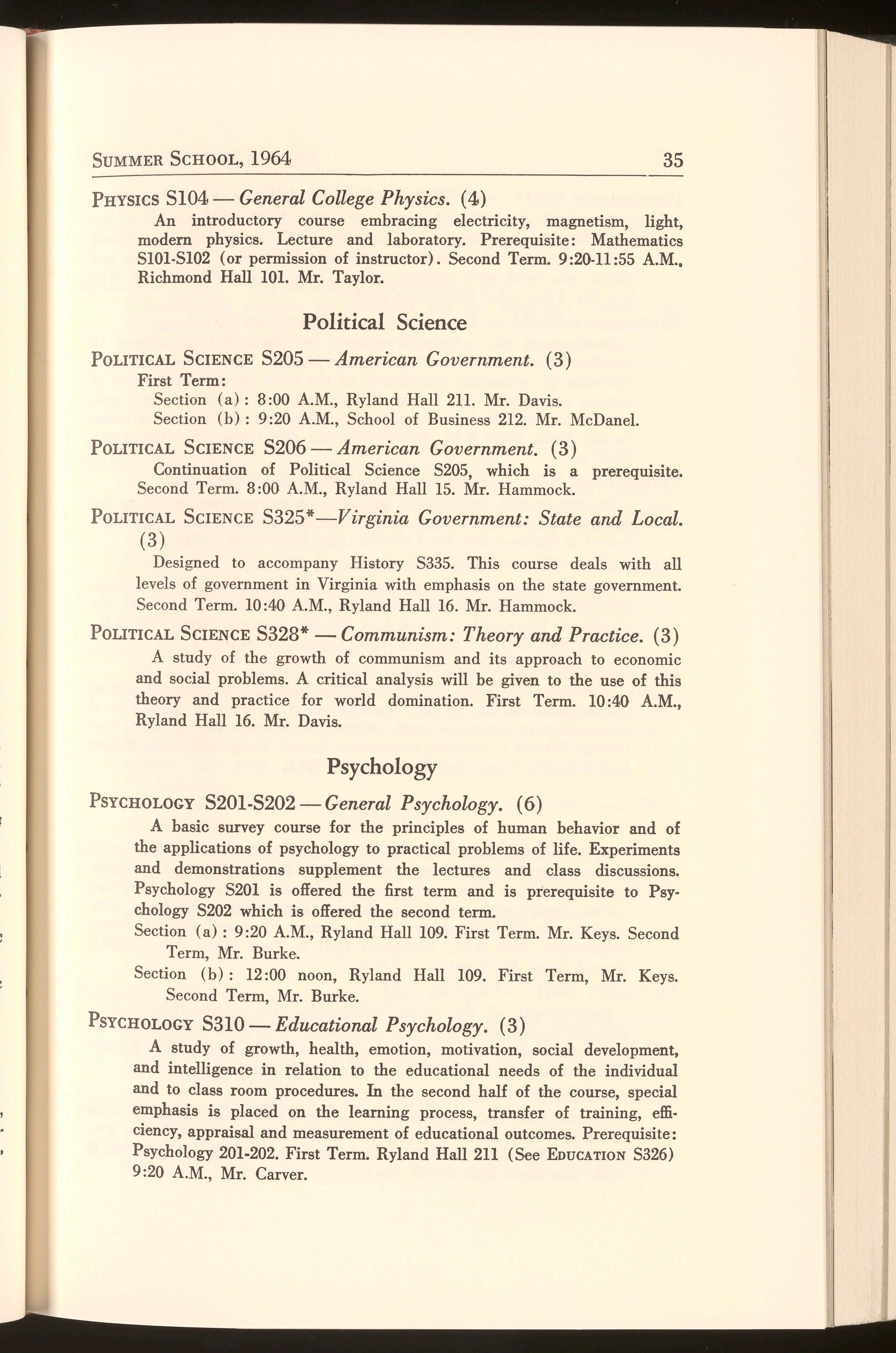
SUMMER SCHOOL, 1964 35
PHYSICS Sl04- General College Physics. (4)
An introductory course embracing electricity, magnetism, light, modern physics. Lecture and laboratory. Prerequisite: Mathematics Sl01-Sl02 (or permission of instructor). Second Term. 9:20-11:55 A.M., Richmond Hall 101. Mr. Taylor.
POLITICAL SCIENCE S205 - American Government. (3) First Term:
Section (a) : 8 :00 A.M., Ryland Hall 211. Mr. Davis.
Section (h) : 9 :20 A.M., School of Business 212. Mr. McDanel.
POLITICAL SCIENCE S206 - American Government. ( 3)
Continuation of Political Science S205, which is a prerequisite. Second Term. 8:00 A.M., Ryland Hall 15. Mr. Hammock.
POLITICAL SCIENCE S325*-Virginia Government: State and Local. (3)
Designed to accompany History 5335. This course deals with all levels of government in Virginia with emphasis on the state government. Second Term. 10:40 A.M., Ryland Hall 16. Mr. Hammock.
POLITICAL SCIENCE S328* - Communism: Theory and Practice. (3)
A study of the growth of communism and its approach to economic and social problems. A critical analysis will he given to the use of this theory and practice for world domination. First Term. 10:40 A.M., Ryland Hall 16. Mr. Davis.
PSYCHOLOGY S201-S202-General Psychology. (6)
A basic survey course for the principles of human behavior and of the applications of psychology to practical problems of life. Experiments and demonstrations supplement the lectures and class discussions. Psychology 5201 is offered the first term and is prerequisite to Psychology S202 which is offered the second term.
Section (a) : 9:20 A.M., Ryland Hall 109. First Term. Mr. Keys. Second Term, Mr. Burke.
Section (h) : 12 :00 noon, Ryland Hall 109. First Term, Mr. Keys. Second Term, Mr. Burke.
PSYCHOLOGY S310 - Educational Psychology. (3)
A study of growth, health, emotion, motivation, social development, and intelligence in relation to the educational needs of the individual and to class room procedures. In the second half of the course, special emphasis is placed on the learning process, transfer of training, efficiency, appraisal and measurement of educational outcomes. Prerequisite: Psychology 201-202. First Term. Ryland Hall 211 (See EDUCATIONS326) 9 :20 A.M., Mr. Carver.
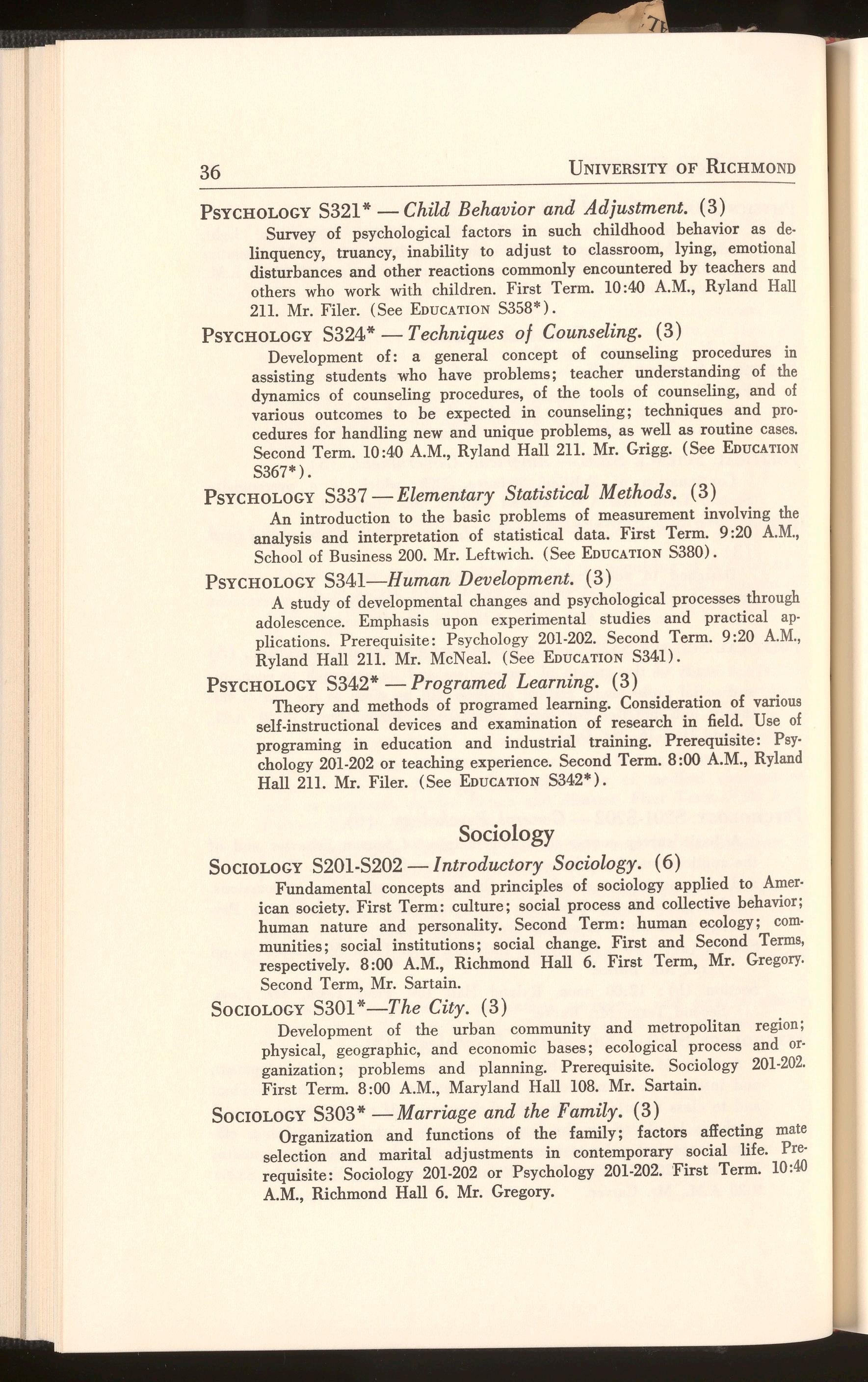
PSYCHOLOGY S321 * - Child Behavior and Adjustment. (3)
Survey of psychological factors in such childhood behavior as delinquency, truancy, inability to adjust to classroom, lying, emotional disturbances and other reactions commonly encountered by teachers and others who work with children. First Term. 10:40 A.M., Ryland Hall 211. Mr. Filer. (See EDUCATIONS358*).
PSYCHOLOGY S324* -Techniques of Counseling. (3)
Development of: a general concept of counseling procedures in assisting students who have problems; teacher understanding of the dynamics of counseling procedures, of the tools of counseling, and of various outcomes to be expected in counseling; techniques and pro• cedures for handling new and unique problems, as well as routine cases. Second Term. 10:40 A.M., Ryland Hall 211. Mr. Grigg. (See EDUCATION S367* ).
PSYCHOLOGY S337 -Elementary Statistical Methods. (3)
An introduction to the basic problems of measurement involving the analysis and interpretation of statistical data. First Term. 9 :20 A.M., School of Business 200. Mr. Leftwich. (See EDUCATIONS380).
PSYCHOLOGY S341-Human Development. (3)
A study of developmental changes and psychological processes through adolescence. Emphasis upon experimental studies and practical ap· plications. Prerequisite: Psychology 201-202. Second Term. 9:20 A.M., Ryland Hall 211. Mr. McNeal. (See EDUCATIONS341).
PSYCHOLOGY S342* - Programed Learning. ( 3)
Theory and methods of programed learning. Consideration of various self-instructional devices and examination of research in field. Use of programing in education and industrial training. Prerequisite: Psy• chology 201-202 or teaching experience. Second Term. 8:00 A.M., Ryland Hall 211. Mr. Filer. (See EDUCATIONS342*).
SOCIOLOGY S201-S202-lntroductory Sociology. (6)
Fundamental concepts and principles of sociology applied to Amer• ican society. First Term: culture; social process and collective behavior; human nature and personality. Second Term: human ecology; communities; social institutions; social change. First and Second Terms, respectively. 8:00 A.M., Richmond Hall 6. First Term, Mr. Gregory. Second Term, Mr. Sartain.
SOCIOLOGY S301 *-The City. (3)
Development of the urban community and metropolitan region; physical, geographic, and economic bases; ecological process and or• ganization; problems and planning. Prerequisite . Sociology 201-202. First Term. 8:00 A.M., Maryland Hall 108. Mr. Sartain.
SOCIOLOGY S3O3* -Marriage and the Family. (3)
Organization and functions of the family; factors affecting mate selection and marital adjustments in contemporary social life. Pre• requisite: Sociology 201-202 or Psychology 201-202. First Term. 10:40 A.M., Richmond Hall 6. Mr. Gregory.
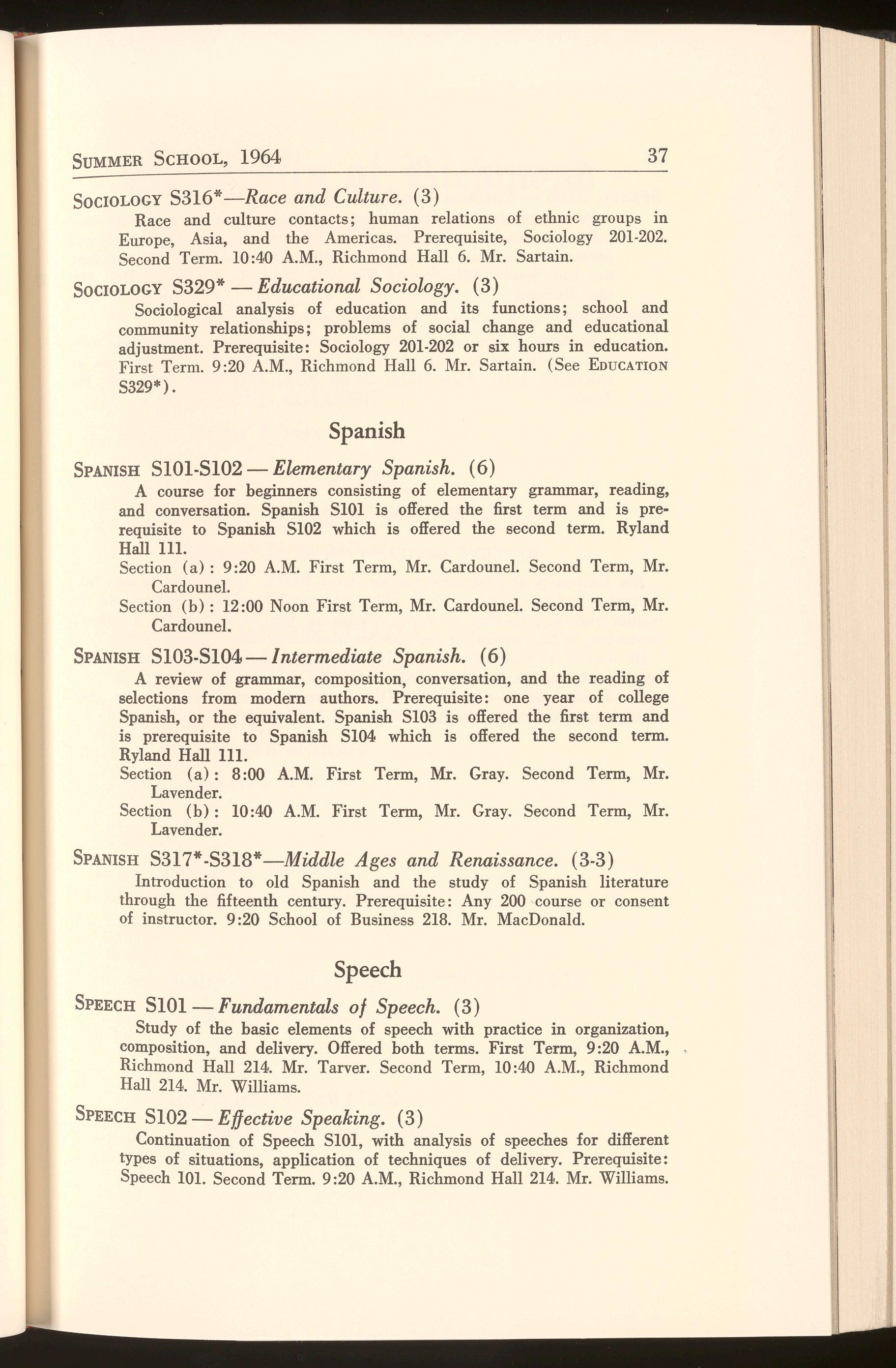
SUMMER SCHOOL, 1964 37
SocIOLOGY S316*-Race and Culture. (3)
Race and culture contacts; human relations of ethnic groups in Europe, Asia, and the Americas. Prerequisite, Sociology 201-202. Second Term. 10:40 A.M., Richmond Hall 6. Mr. Sartain.
SocIOLOGY S329* - Educational Sociology. (3)
Sociological analysis of education and its functions; school and community relationships; problems of social change and educational adjustment. Prerequisite: Sociology 201-202 or six hours in education. First Term. 9:20 A.M., Richmond Hall 6. Mr. Sartain. (See EDUCATION S329*).
SPANISH S101-S102- Elementary Spanish. (6)
A course for beginners consisting of elementary grammar, reading, and conversation. Spanish SlOl is offered the first term and is prerequisite to Spanish Sl02 which is offered the second term. Ryland Hall 111.
Section (a): 9:20 A.M. First Term, Mr. Cardounel. Second Term, Mr. Cardounel.
Section (b): 12:00 Noon First Term, Mr. Cardounel. Second Term, Mr. Cardounel.
SPANISH S103-S104- lntermediate Spanish. (6)
A review of gra=ar, composition, conversation, and the reading of selections from modern authors. Prerequisite: one year of college Spanish, or the equivalent. Spanish Sl03 is offered the first term and is prerequisite to Spanish Sl04 which is offered the second term. Ryland Hall 111.
Section (a): 8:00 A.M. First Term, Mr. Gray. Second Term, Mr. Lavender.
Section (b): 10:40 A.M. First Term, Mr. Gray. Second Term, Mr. Lavender.
SPANISH S317*-S318*-Middle Ages and Renaissance. (3-3)
Introduction to old Spanish and the study of Spanish literature through the fifteenth century. Prerequisite: Any 200 course or consent of instructor. 9 :20 School of Business 218. Mr. MacDonald.
SPEECH S101- Fundamentals of Speech. (3)
Study of the basic elements of speech with practice in organization, composition, and delivery. Offered both terms. First Term, 9:20 A.M., Richmond Hall 214. Mr. Tarver. Second Term, 10:40 A.M., Richmond Hall 214. Mr. Williams.
SPEECH S102-Efjective Speaking. (3)
Continuation of Speech Sl0l, with analysis of speeches for different types of situations, application of techniques of delivery. Prerequisite: Speech 101. Second Term. 9:20 A.M., Richmond Hall 214. Mr. Williams.
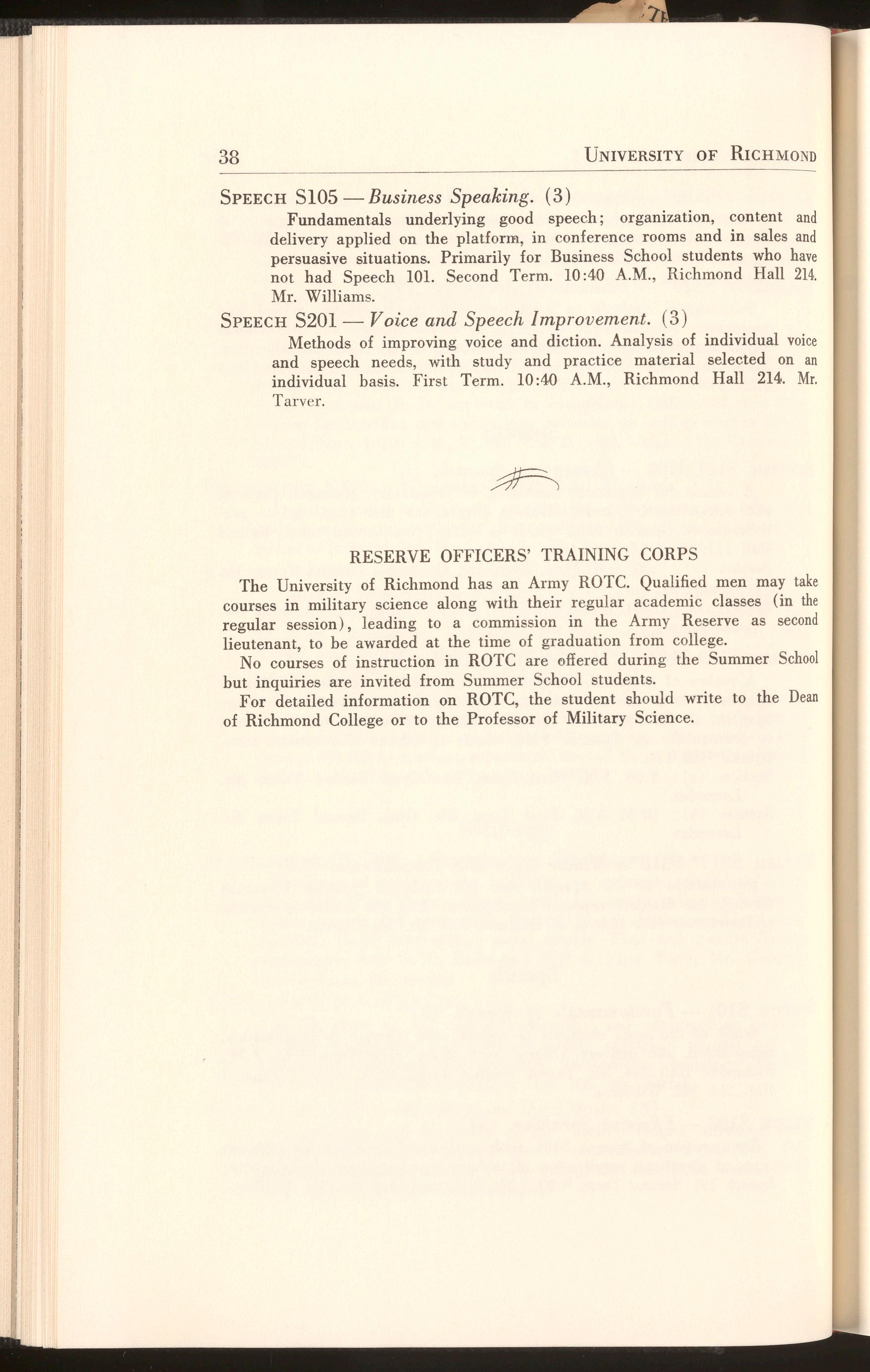
SPEECH SlOS - Business Speaking. ( 3)
Fundamentals underlying good speech; organization, content and delivery applied on the platform, in conference rooms and in sales and persuasive situations. Primarily for Business School students who have not had Speech 101. Second Term. 10 :40 A.M., Richmond Hall 214. Mr . Williams.
SPEECH S201- Voice and Speech Improvement. (3)
Methods of improving voice and diction. Analysis of individual voice and speech needs, with study and practice material selected on an individual basis. First Term. 10 :40 A.M., Richmond Hall 214. Mr. Tarver.
The University of Richmond has an Anny ROTC. Qualified men may take courses in military science along with their regular academic classes (in the regular session), leading to a commission in the Army Reserve as second lieutenant, to be awarded at the time of graduation from college.
No courses of instruction in ROTC are offered during the Summer School but inquiries are invited from Summer School students.
For detailed information on ROTC, the student should write to the Dean of Richmond College or to the Professor of Military Science.
FOUNDED 1830
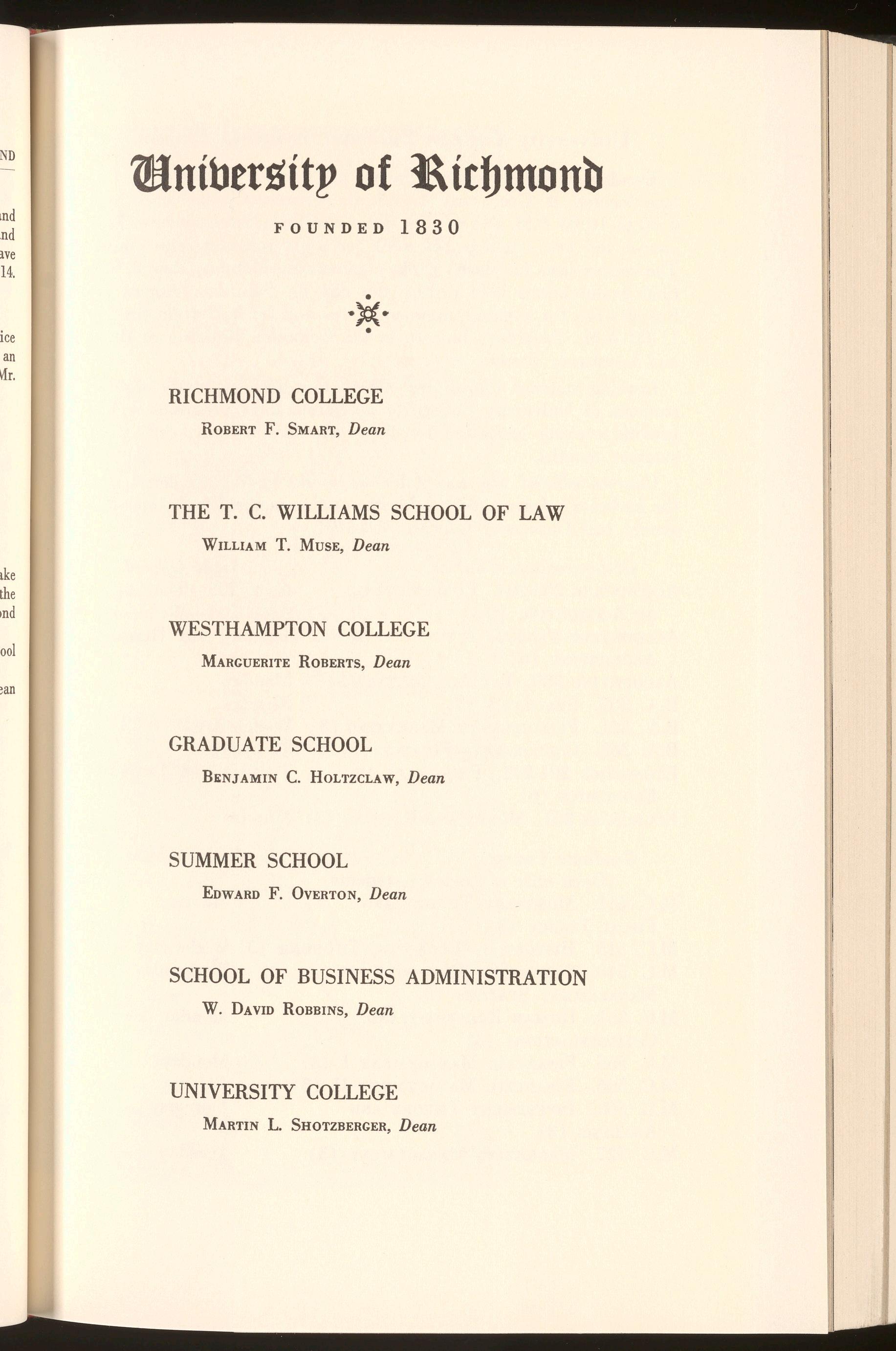
RICHMOND COLLEGE
ROBERT F. SMART , Dean
THE T. C. WILLIAMS SCHOOL OF LAW
WILLIAM T MusE , Dean
WESTHAMPTON COLLEGE
MARGUERITE ROBERTS , Dean
GRADUATE SCHOOL
B!i:NJAMI N C. HOLTZCLAW , Dean
SUMMER SCHOOL
EDWARD F OVERTO N, D ean
SCHOOL OF BUSINESS ADMINISTRATION
W DAVID RoBBINS , Dean
UNIVERSITY COLLEGE
MARTIN L. SHOTZBERGER , Dean
Evening classes are offered during the summer in University College located at Grace and Lombardy Streets. Classes meet from 6:30 to 10:00 P.M. one evening per week for a three semester hour course and two evenings per week for a six semester hour course. The session lasts for eleven weeks commencing Monday, June 8, with final examinations held during the day on Saturday, August 22. Registration for evening summer classes will be held from 9 :00 to 11 :00 A.M., Saturday, June 6, in the Columbia Building at Grace and Lombardy Streets.
Evening summer classes are offered to permit regularly enrolled students of University College to accelerate their programs and to provide evening education for those who are working during the summer months.
Courses offered are acceptable as work leading to certificates, the bachelor's degree and the Master of Commerce. Those interested should call University College, 358-8401.
Undergraduate Courses
ACCOUNTING203-204. FUNDAMENTALS OF ACCOUNTING( 3-3)
ACCOUNTING303-304. INTERMEDIATE ACCOUNTING( 6)
ACCOUNTING309. TAX ACCOUNTING(3)
B.A. 307. STATISTICS(3)
B.A. 321. PRINCIPLESOF MARKETING(3)
B.A. 365. CORPORATIONFINANCE (3)
ECONOMICS201-202. PRINCIPLESOF ECONOMICS(6)
ECONOMICS301. MONEYANDBANKING(3)
Graduate Courses
( Open only to graduate students)
M.C. 512. MONETARYTHEORY AND FISCAL Po LICY ( 3)

Night Offered
Acct. 203-Thursday
Acct. 204--Wednesday Tuesday and Thursday Monday Monday Wednesday Thursday Tuesday and Thursday Tuesday Night Offered Monday
M.C. 513. HISTORYOF ECONOMICTHOUGHT
M.C. 540. OPERATIONSRESEARCHFOR MANAGEMENTSYSTEMS ( 3) (3) Wednesday Wednesday
M.C. 551. HUMAN RELATIONSAND COMMUNICATIONS ( 3)
M.C. 565. FINANCIALMANAGEMENT I (3)
M.C. 566. FINANCIALMANAGEMENT11 (3)
M.C. 568. INVESTMENTTHEORY AND ANALYSIS(3)
M.C. 527. MARKETINGMANAGEMENT(3) Monday Monday Tuesday Thursday Tuesday
